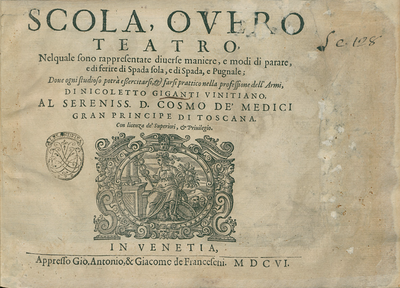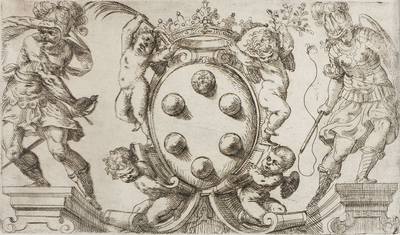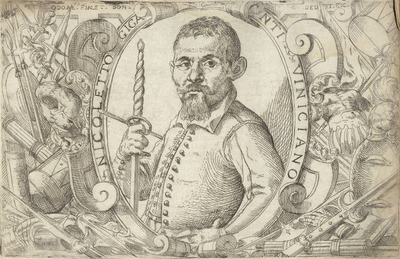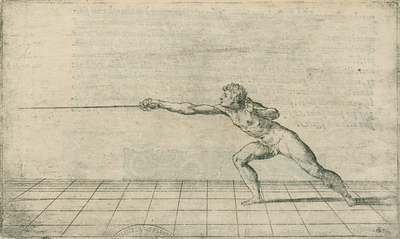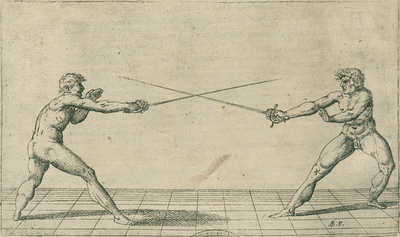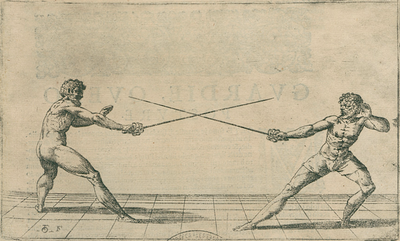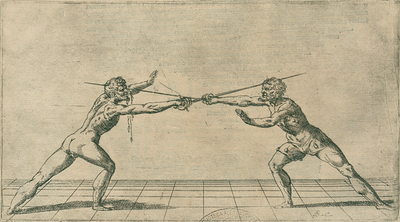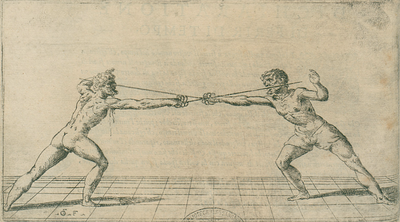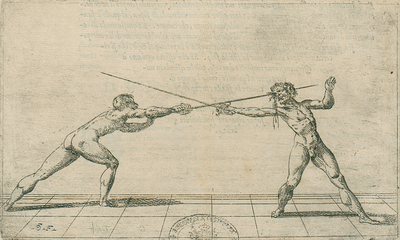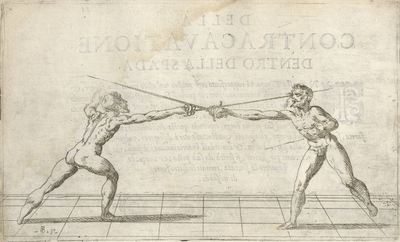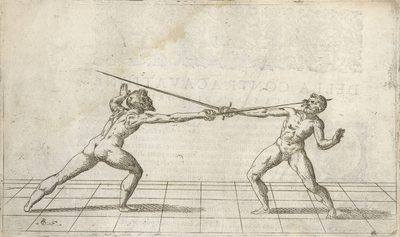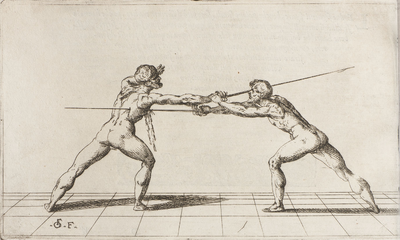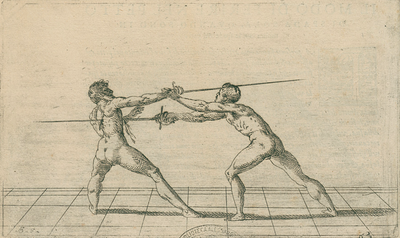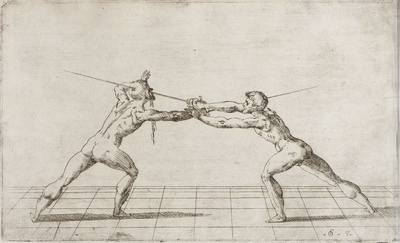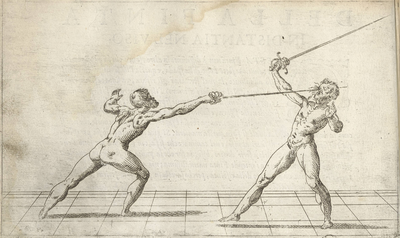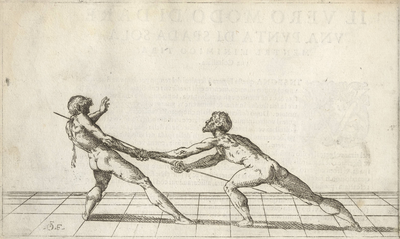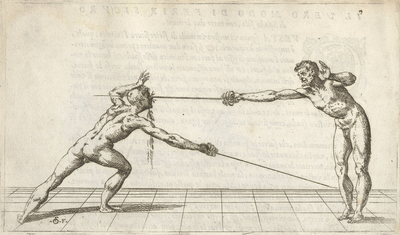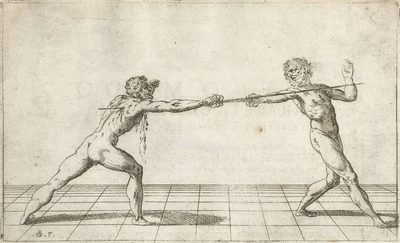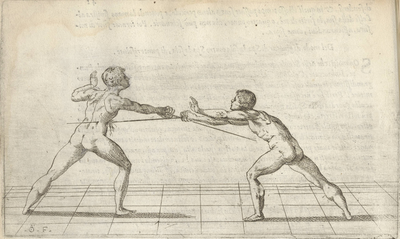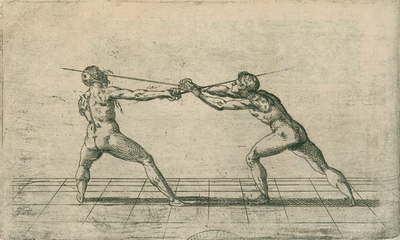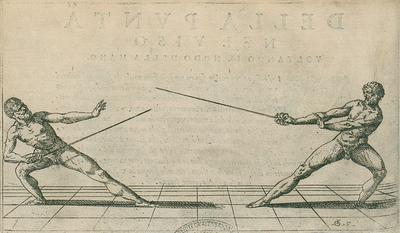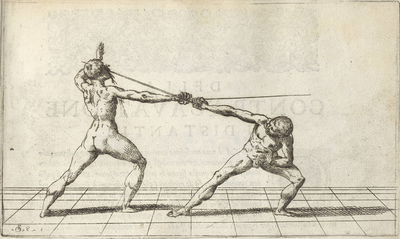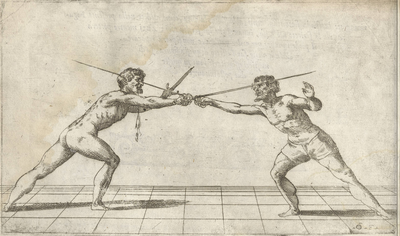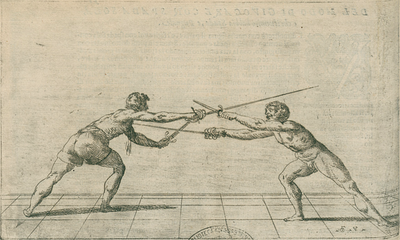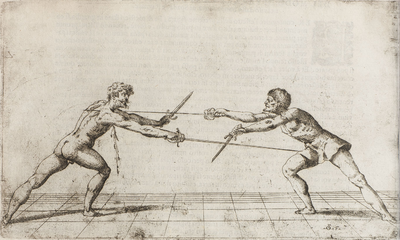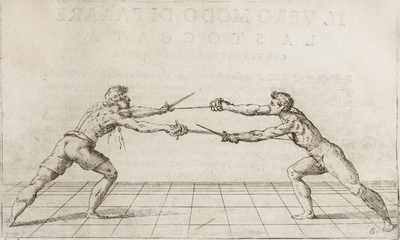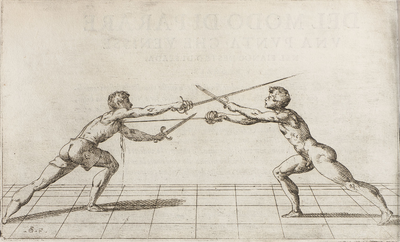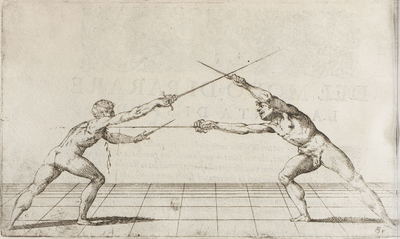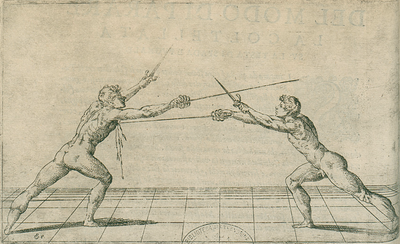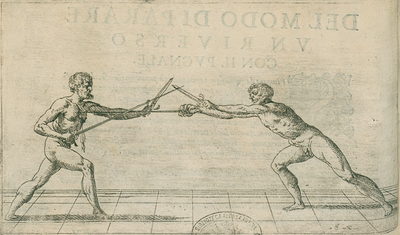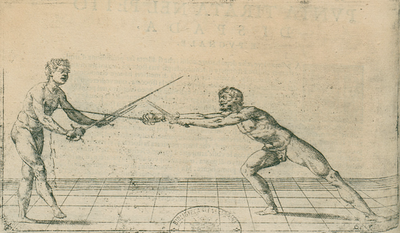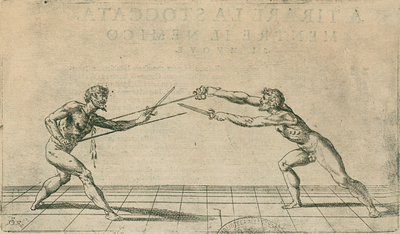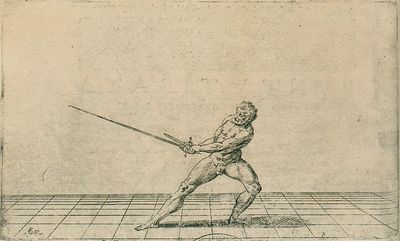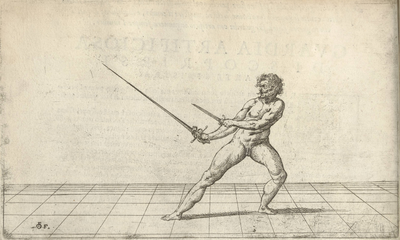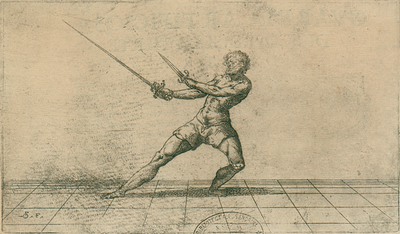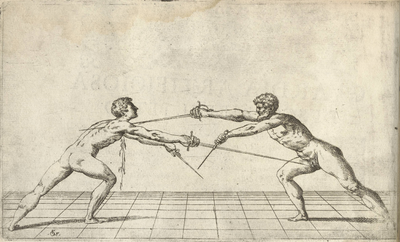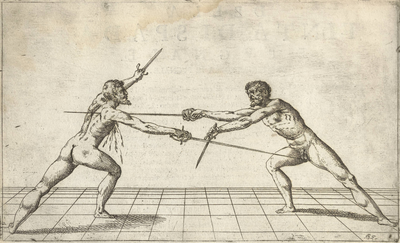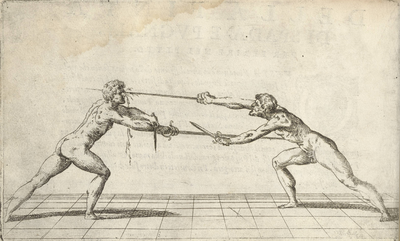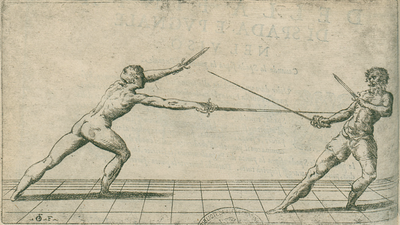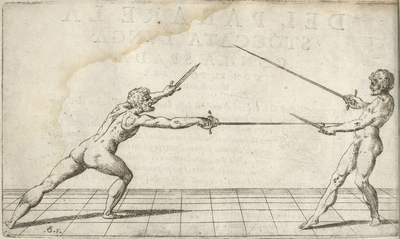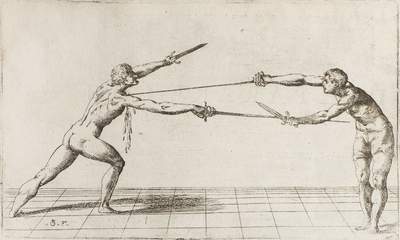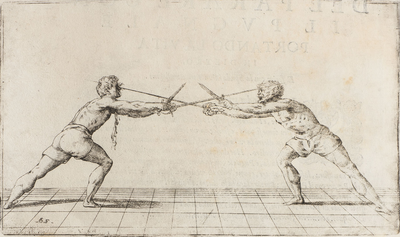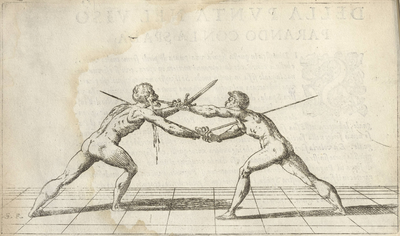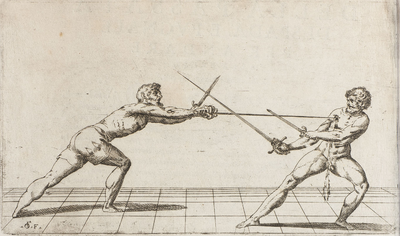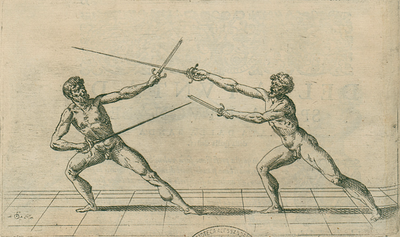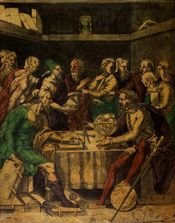|
|
You are not currently logged in. Are you accessing the unsecure (http) portal? Click here to switch to the secure portal. |
Difference between revisions of "Nicoletto Giganti"
| Line 1: | Line 1: | ||
{{Infobox writer | {{Infobox writer | ||
| name = [[name::Nicoletto Giganti]] | | name = [[name::Nicoletto Giganti]] | ||
| − | | image = File:Nicoletto Giganti.png | + | | image = File:Nicoletto Giganti portrait.png |
| − | | imagesize = | + | | imagesize = |
| caption = | | caption = | ||
| Line 74: | Line 74: | ||
|- | |- | ||
| − | | [[File:Scola, overo teatro (Giganti) 01 Title Page.png| | + | | rowspan="3" | [[File:Scola, overo teatro (Giganti) 01 Title Page.png|400x400px|center|Title Page]] |
| − | | SCHOOL, OR THEATRE | + | | class="noline" | <p>'''SCHOOL, OR THEATRE''' In which different manners and methods of parrying and wounding with the single sword and sword and dagger are represented; ''Where every scholar will be able to exercise and become practised in the profession of arms'' |
| + | | class="noline" | {{section|Page:Scola, overo teatro (Nicoletto Giganti) 1606.pdf/5|1|lbl=i}} | ||
| + | | class="noline" | [http://fechtgeschichte.blogspot.de/2014/08/das-fechtbuch-des-nicolai-giganti-in.html Text to copy over] | ||
| + | | class="noline" | | ||
| + | |||
| + | |- | ||
| + | | class="noline" | <p>BY NICOLETTO GIGANTI, VENETIAN, TO THE MOST SERENE DON COSMO DE' MEDICI GREAT PRINCE OF TUSCANY</p> | ||
| + | | class="noline" | {{section|Page:Scola, overo teatro (Nicoletto Giganti) 1606.pdf/5|2|lbl=-}} | ||
| + | | class="noline" | | ||
| + | | class="noline" | | ||
| − | + | |- | |
| − | + | | <p>''With license and privilege of the Superiors''</p> | |
| − | |||
| − | |||
| − | |||
| − | With license and privilege of the Superiors | ||
| − | IN VENICE<br/> | + | <p>IN VENICE<br/>Printed by Giovanni Antonio and Giacomo de Frenchesi. MDCVI</p> |
| − | Printed by Giovanni Antonio and Giacomo de Frenchesi. MDCVI | + | | {{section|Page:Scola, overo teatro (Nicoletto Giganti) 1606.pdf/5|3|lbl=-}} |
| − | | | + | | |
| + | | | ||
| − | + | |- | |
| − | + | | [[File:Scola, overo teatro (Giganti) 02 Medici Arms.png|400x400px|center|Arms of the Medici Family]] | |
| − | + | | <p>'''TO THE MOST SERENE DON COSMO DE MEDICI''' GREAT PRINCE OF TUSCANY my only Lord</p> | |
| − | |||
| − | |||
| − | |||
| − | + | <p>Just as iron extracted from the rough mines would be useless if it had not received shape suited to human armies from industrious art, thus the same in the hands of the strong soldier can be of little profit if, accompanied by studious and wise valour, the way is not made clear for every difficult and triumphant success. In this way to a point since the Good Shepherd welcomes the operation, because almost all the noblest things proceeding from our actions receive appropriate material from His hands, which, refined and dignified by the industry of the spirit, achieve miraculous and powerful effects. Now I say that this temperament is wonderfully demonstrated in the excellent and illustrious greatness of Your Most Serene Highness, who holds the natural greatnesses brought back to their peak from the invincible glorious works of your Ancestors, not only in the ancient and royal histories, but reflecting in yourself all the light of the present and past splendour, adorning them with your own virtues so that everyone admires the most divine tempers, and with wonderment says such a Most Serene Lord is no less fitting to that Most Serene State, than such a Most Serene State to that Most Serene Lord. But I will only say that this proposition, just as is demonstrated clearly in all the arts; so it is evidently perceived in exercising arms. Discussing the strength of iron, although it is exercised by a strong arm and agile body, if it is not tuned with observed rules and exercised study it is shown to be perilous and of little valour: Whereas if the art can be known by a wise captain, and he obeys it as a bold minister, they make marvelous prowess of it. You serve us as a clear example, who Heaven had to grant all height of perfect quality as in the most complete illumination of the present age. You who have in the noblest proportion stature, puissance, vigour joined to agility, promptness, and strength, in order to draw with your highest ingenuity the finesse of industry, advice, time, and art that can make you most a complete and Most Illustrious Captain, a Most Serene and most singular Prince.</p> | |
| − | + | | | |
| − | | | + | {{pagetb|Page:Scola, overo teatro (Nicoletto Giganti) 1606.pdf|7|lbl=iii|p=1}} {{pagetb|Page:Scola, overo teatro (Nicoletto Giganti) 1606.pdf|8|lbl=iv|p=1}} {{section|Page:Scola, overo teatro (Nicoletto Giganti) 1606.pdf/9|1|lbl=v|p=1}} |
| + | | | ||
| | | | ||
|- | |- | ||
| − | | | + | | |
| − | | | + | | <p>Wherefore I, recognizing and admiring with humblest affection the mature splendour of your newly made and happy years, and reading in the face of the world the secure hopes and fruits of the future age, adoring that hand from which Italy and the entire world is taking safe rest and glorious protection, to that I offer and consecrate with humble dedication this small, I will certainly not say fruit, but work of my labours. Therefore, it only must please you, being of material welcomed by you which deigns to bend your Most Serene eye. To that end, let many of your highest rays pass over where the baseness of my ingenuity with the exercise of this art that I have dealt with for 27 years does not arrive. Let this work, in itself humble, present itself happily to the view of the World. It will be effected with the action of my devotion, together with the fruit of your Most Serene mercy, who serving being the full glory, I pray that Heaven makes me a worthy, even lowest servant. In Venice February 10, 1606</p> |
| − | |||
| − | |||
| − | Wherefore I, recognizing and admiring with humblest affection the mature splendour of your newly made and happy years, and reading in the face of the world the secure hopes and fruits of the future age, adoring that hand from which Italy and the entire world is taking safe rest and glorious protection, to that I offer and consecrate with humble dedication this small, I will certainly not say fruit, but work of my labours. Therefore, it only must please you, being of material welcomed by you which deigns to bend your Most Serene eye. To that end, let many of your highest rays pass over where the baseness of my ingenuity with the exercise of this art that I have dealt with for 27 years does not arrive. Let this work, in itself humble, present itself happily to the view of the World. It will be effected with the action of my devotion, together with the fruit of your Most Serene mercy, who serving being the full glory, I pray that Heaven makes me a worthy, even lowest servant. In Venice February 10, 1606< | ||
| − | |||
| − | + | :Of Your Most Serene Highness, | |
| − | |||
| − | |||
| − | + | ::A most humble and devoted servant, | |
| − | |||
| − | |||
| − | + | :::Nicoletto Giganti, Master of Arms | |
| − | Nicoletto Giganti | + | | {{section|Page:Scola, overo teatro (Nicoletto Giganti) 1606.pdf/9|2|lbl=-}} |
| [http://fechtgeschichte.blogspot.de/2014/08/das-fechtbuch-des-nicolai-giganti-in.html Text to copy over] | | [http://fechtgeschichte.blogspot.de/2014/08/das-fechtbuch-des-nicolai-giganti-in.html Text to copy over] | ||
| | | | ||
| Line 123: | Line 119: | ||
|- | |- | ||
| | | | ||
| − | | TO THE LORD READERS, | + | | <p>'''TO THE LORD READERS, ALMORO LOMBARDO''', Son of the Most Renowned Lord Marco.</p> |
| + | |||
| + | <p>''Wanting to write on the matter of arms, although the author does not mention that it is a science, to me it appears a necessary thing, Lord Readers, to treat with what share it has, and of which name it would adorn itself so that everyone knows its greatness, dignity, and privilege.''</p> | ||
| − | + | <p>''Whereupon first some students of this this most noble science read and discuss the most learned and easy observations of this valorous and knowledgeable professor Nicoletto Giganti, I, by observing the rule and general precept of a person who wants to address anything, will come to the definition, and then to the general division of this word Science, from which it will be possible for two things to finally be recognized by everyone, showing us that this beautiful profession is science.''</p> | |
| − | Whereupon first some students of this this most noble science read and discuss the most learned and easy observations of this valorous and knowledgeable professor Nicoletto Giganti, I, by observing the rule and general precept of a person who wants to address anything, will come to the definition, and then to the general division of this word Science, from which it will be possible for two things to finally be recognized by everyone, showing us that this beautiful profession is science.< | ||
| − | |||
| − | |||
| − | |||
| − | |||
| − | |||
| − | |||
| − | |||
| − | |||
| − | |||
| − | |||
| − | |||
| − | |||
| − | |||
| − | |||
| − | |||
| − | |||
| − | |||
| − | |||
| − | |||
| − | |||
| − | |||
| − | |||
| − | |||
| − | + | <p>''Science, therefore, is a certain and manifest knowledge of things that the intellect acquires. It is of two sorts, that is, Speculative and Practical. Speculative is a simple operation of the intellect around its own object. Practical only consists in the actual workings of the intellect.''</p> | |
| − | + | ||
| − | + | <p>''Speculative is divided in two parts, that is, in Real Speculation and Rational Speculation. The Real aims at the reality of its object, which demonstrates its essence on its exterior. The Rational consists of those things that only the intellect administers and does not extend itself to other goals.''</p> | |
| + | |||
| + | <p>''Physics is a Real Speculative Science that only aims at moving and natural things, like the elements. Mathematics is a Real Speculative Science that only extends itself to continuous and discrete quantity. Continuous like lines, circles, surfaces, the measures of which deal with Arithmetic.''</p> | ||
| + | |||
| + | <p>''Grammar, Rhetoric, Poetry, and Logic are Rational Speculative Sciences.''</p> | ||
| + | |||
| + | <p>''Practical Science is divided in two: Active and Workable. Active is Ethics, Politics, and Economics. Workable can be divided in seven others, called mechanical, which are these: Woolcraft, Agriculture, Soldiery, Navigation, Medicine, Hunting, and Metalworking.''</p> | ||
| + | |||
| + | <p>''Now, coming to what I promised above about this noble science, I will go over its qualities and nature, discussing whether it is Speculative or Practical science. In my opinion I say that it is Speculative, and prove it with diverse reasons. That it is science there is no doubt, because it is not acquired if it is not mediated by the operation of the intellect, from which it is born. That it is Speculative is certain since it does not consist in anything other than simple knowledge of its object, as I will be discussing below.''</p> | ||
| + | |||
| + | <p>''The object of this science is nothing more than parrying and wounding. The knowledge of those two things is a work of the intellect, and moreover with intelligence professors of this science do not extend it further than the knowledge of them, which cannot be understood at all unless one first has knowledge of tempi and measures, or rather, knowledge of Feint, Disengage, or resolution without knowledge of tempi and measures. These are all operations of the intellect, and moreover outside of this knowledge the intellect does not extend, because as I have said the aim of these professions is understanding parrying. We will see if it is Real Speculative or Rational Speculative.''</p> | ||
| + | |||
| + | <p>''Considering this, it cannot be Rational, and the reason is this: because if it is indeed an operation of the intellect, nevertheless it spreads further, wherefore I find it to be Real Speculative. Real, because the knowledge of its aim is shown to us outwardly by the intellect. As the understanding of wounding and parrying, with tempi, measures, feints, disengages, and resolutions, even though they are operations of the intellect, they cannot be understood if not outwardly, and this exterior consists in the bearing of the body and of the Sword in the guards and counterguards, which all consist of circles, angles, lines, surfaces, measures, and of numbers. These things, which must be observed, can be read about in Camillo Agrippa and in many other professors of this science. Note that just as those operations of the intellect without an exterior operation cannot be shown, so these exterior operations cannot be understood without the operations of the intellect first, in a manner that this science, which derives from the intellect, cannot be understood if not outwardly. Neither can one understand outwardly without operations of the intellect. These operations seek to understand the greatness, excellence, and perfection of this profession, and always come united. As there can never be Sun without day, nor day without Sun, never will there be those without these, nor these without those. In the end we see that it is Real Speculative Science.''</p> | ||
| + | |||
| + | <p>''This science of the Sword, or of arms, is a Real Speculative Mathematic Science, and Geometric, and Arithmetic. Geometric because it consists in lines, circles, angles, surfaces, and measures. Arithmetic because it consists of numbers. There is no motion of the body that does not make an angle or constraint. There is no motion of the Sword that does not travel in a line. There is neither guard nor counterguard that does not go by the number. The observations of these things all depend on knowledge of tempi and measures, whence I conclude that this most noble science is Real, Mathematic, Geometric, and Arithmetic, as I said a little above.''</p> | ||
| + | | | ||
| + | {{pagetb|Page:Scola, overo teatro (Nicoletto Giganti) 1606.pdf|11|lbl=vii|p=1}} {{pagetb|Page:Scola, overo teatro (Nicoletto Giganti) 1606.pdf|12|lbl=viii|p=1}} {{section|Page:Scola, overo teatro (Nicoletto Giganti) 1606.pdf/13|1|lbl=ix|p=1}} | ||
| [http://fechtgeschichte.blogspot.de/2014/08/das-fechtbuch-des-nicolai-giganti-in.html Text to copy over] | | [http://fechtgeschichte.blogspot.de/2014/08/das-fechtbuch-des-nicolai-giganti-in.html Text to copy over] | ||
| | | | ||
| Line 159: | Line 149: | ||
|- | |- | ||
| | | | ||
| − | | | + | | <p>''Perhaps some inquisitive person arguing over this could say that the science of arms is a Practical Science with this reason: that being a Practical Science, a science which not only extends to the knowledge of its own object but to the operation of it, this science is therefore Practical, and not Speculative. To this objection I respond: all things have from nature their operation. Three are the sorts of their operations; some are internal, and these have their being in pure and simple intellect, and result from a Rational Speculative. Some are internal and external, and these have a commonality inside the intellect and outside, and are born from a Real Speculative. Some are completely external, and these have their being outside the intellect entirely and depend on a Practical Science, and are either Active or Workable. The Speculative Workable Real Science is no different from the Practical Science other than in this: the Real Speculative operates outwardly on its object and through the knowledge of that serves the intellect. The Practical Science not only cannot operate on its object if not outwardly, it cannot even come to the knowledge of it if not outwardly. The science of arms has the knowledge of its object in the intellect, and even though it operates outwardly, it cannot be said that it is Practical, but instead Speculative Real Science.''</p> |
| + | |||
| + | <p>''We have therefore seen that it is a science and it is Mathematics, of Geometry and Arithmetic, since it consists of numbers, lines, and measures. The author does not make mention of this in his observations, so that from him learned persons and those with no study may acquire some profit. Therefore, from his present figures and noted lessons, without learning to understand the multiplicity of lines, circles, angles, surfaces which would rather confuse the minds of readers that do not have understanding of these studies, nor give them any instruction, without a doubt everyone will learn to understand without difficulty the tempi, measures, resolutions, feints, disengages, and the way of parrying and wounding.''</p> | ||
| + | |||
| + | <p>''As for knowing how to understand the circles, lines, and other things mentioned above, every studious person will come to understand them with exercise. I will always advise everyone to apply themselves to the study of letters before this profession, because one that has studied in order to have understanding of the necessary things around this science will better profit and will make themselves more excellent and more perfect, with much more quickness of time for the acquisition, so that he can understand the aforesaid things of the guards, counterguards, covered just as uncovered. He that has not studied will not obtain it so easily, which, if he can learn it well, he will not therefore acquire understanding of this science without length of time and continuous exercise.''</p> | ||
| + | |||
| + | <p>''This profession is of so much dignity and consideration. What decorum does it seek? What reputation and how much honour must one give it? Under what obligation is one that carries the sword and makes a profession of it? I say its dignity and consideration derive totally from its qualities, and with the division of the same one can come to understand.''</p> | ||
| + | |||
| + | <p>''This science of the sword is divided into three parts. The first is divided in two: Natural and Artificial. Natural is a demonstrative discourse man makes use of naturally in parrying and wounding, since with his own ingenuity he proceeds with those goals extracting what mother nature administers to him for his needs. Here is what many men of courage and spirit have shown great measure of in their contentions with men of great art and knowledge. The Artificial is that which with ingenuity and long use and exercise found under short rules and impossible methods different manners of parrying and wounding with the above noted things. Accordingly, coming to some occasion the man extracts from this the real ends of his safety. In his lessons the author shows great understanding of those two qualities, and the reader will be fully satisfied with them.''</p> | ||
| + | |||
| + | <p>''The second part is this: the Artificial science of the sword is divided in two, Demonstrative and Exercised. The Demonstrative is that which demonstrates the proper method, and aims at knowledge of parrying and of wounding, by firm foot just as with the pass, when one must bind the enemy and when one must draw back by way of those lines, circles, or circumstances you remember from above, for which the intellect governs and imparts the many and multiple postures and counterpostures of the body. The Exercise is the same as the Demonstrative which, since we have acquired it, we apply to the understanding of a thousand warnings. There is no difference between them, except that the Demonstrative is self-contained, and the Exercised extends to serve the understanding of different things.''</p> | ||
| + | |||
| + | <p>''The third part is this: the Demonstrative science of the sword is divided in two: the first Demonstrative consists of uncomplicated ends, that is, in simple ends, or composite, that unite in themselves more ends for the same Demonstratives of various occurrences, such as being outside of measure with the arms open, the weapons high or low. These ends require incomplete ends, that is, ends not understood by the enemy. They are called simple because they are natural. They are called composite because they have in themselves many considerations, and these are divided into the first and the second concepts.''</p> | ||
| + | |||
| + | <p>''The first concepts are real things that are first learned from the intellect, like parrying and wounding, and these come in the first intention. The second concepts are formed from the intellect, and these make the second of our intentions, the knowledge in order to be able to wound and parry, and are made through the first, for the reason that immediately when our intellect has learned this aim of wounding and parrying, it soon discusses how this can be done in a different manner and with different methods.''</p> | ||
| + | |||
| + | <p>''The second Demonstrative consists of the complex ends, that is, of ends that unite in themselves more ends for the same demonstratives, and these aims either united in measure or separate in distance demonstrate their ends, like being in guard with the weapons closed demonstrates, or the posture or counterposture of the body in measure or at distance which is the aim of that, and how many things can be done with that working. For this reason one sees of how much consideration this beautiful science is for its qualities, and for the aims it contains.''</p> | ||
| + | |||
| + | <p>''Therefore, just as it is of great dignity, because it is real Speculative Mathematics of Geometry and Arithmetic, and for many parts found under itself, such decorum and reputation I say it requires. No other will be the decorum and reputation if not this. And also considering, o Readers, that this science for the most part is found in royal courts, and of every Prince, in the most famous Cities, studied by Barons, Counts, Knights, and persons of great quality, and for no other reason if not because just as it is noble, it excites and inflames our spirits to great things, to learn, and to heroic actions, to match of the virtue of the spirit, the valour of the body, the vigour of the strength, and the skill of the person. This always seeks parity, and does not allow any blemish to it. It wants to be understood and learned, but not to be professed for every folly one takes up. It flees the disputes of villainous persons. It does not do all that it can. It shows itself at the time and place. It avoids the practices of excess. It is of few words. It desires a serious comportment, a lively eye, an honoured dress, and a noble practice. This is enough about its decorum and reputation. In regard to the honour that it requires, advising that the observance of all the said things is honour to this profession, it remains only to be said what obligation one who carries the sword is under.''</p> | ||
| − | + | <p>''We will pass by the aims of these Duellists who, just as they have badly learned the said profession, so I say with many of their propositions they degrade it and have reduced it to such an unhappy state that it not only casts aside the virtuous life which demands such a science, and human discourse, and every reason, but forgetting the great God, and themselves as a consequence, their unjust aims can only possess it for the damnation of their spirits, postponing the divine church for their diabolical thoughts.''</p> | |
| + | | | ||
| + | {{section|Page:Scola, overo teatro (Nicoletto Giganti) 1606.pdf/13|2|lbl=-|p=1}} {{pagetb|Page:Scola, overo teatro (Nicoletto Giganti) 1606.pdf|14|lbl=x|p=1}} {{pagetb|Page:Scola, overo teatro (Nicoletto Giganti) 1606.pdf|15|lbl=xi|p=1}} {{pagetb|Page:Scola, overo teatro (Nicoletto Giganti) 1606.pdf|16|lbl=xii|p=1}} {{pagetb|Page:Scola, overo teatro (Nicoletto Giganti) 1606.pdf|17|lbl=xiii|p=1}} | ||
| + | | | ||
| − | + | |- | |
| + | | | ||
| + | | <p>''This profession, o Readers, puts one who practices it under obligation to learn, and considering this wants to be used in four occasions: the first for Faith, then for Country, for defence of one’s own life, and finally for honour. It always wants to be a defender of reason, never taken hold of in order to do wrong, and one who does so makes an injury to this profession. Neither will a man of honour have held onto a wrong in order to fight, but will only do so for the said things. It is necessary to have occasion because fighting without one is a thing of the foolish and drunk. Some as soon as they have acquired some beginning of this mock, putting the Sword at their side, and using a thousand insolences, either stop or wound someone, and at such time kill some miserable person, believing themselves to have acquired honour and fame. They do evil, because other than making an outrage to the nobility of this which must not be put in use without reason, they offend the just God and themselves.''</p> | ||
| − | + | <p>''In order to not come to tedium I will not continue, but only exhort each to study such a noble and real science, begging him to keep in mind the underwritten observations of our noble professor, and practice in it, because with brevity of time one can acquire no small profit, observing how much it suits honour, glory, and greatness themselves.''</p> | |
| − | + | | {{pagetb|Page:Scola, overo teatro (Nicoletto Giganti) 1606.pdf|18|lbl=xiv}} | |
| − | + | | | |
| − | + | | | |
| − | + | |- | |
| − | + | | | |
| + | | <p>'''COPY</p> | ||
| − | + | <p>The underwritten Most Excellent Lord Captains of the most Illustrious Council of Ten have belief from the Lord Reformers of the Studio of Padua by report of the two elected, that is, of the Reverend Father Inquisitor and of the Secretary of the Senate Zuane Maravegia, with oath, that in this book titled School, or Theatre by Nicoletto Giganti, Venetian, nothing contrary to the law is found. It is worthy of print, granted licence, and may be printed in this city.</p> | |
| − | + | :Dated the 31st of October, 1605. | |
| − | |||
| − | |||
| − | |||
| − | + | ::Captains of the Most Illustrious Council of X, | |
| − | + | ::D. Santo Balbi<br/>D. Gio. Giacomo Zane<br/>D. Piero Barbarigo | |
| − | + | :::Most Illustrious Council of X. Secretary, Barth. Cominus. | |
| − | |||
| − | |||
| − | |||
| − | + | :October 3, 1605 | |
| − | |||
| − | + | ::Registered in the Office Against Blasphemy to the back of paper 135 | |
| − | + | :::Giovanni Francesco Pinardo, Secretary | |
| − | + | | {{pagetb|Page:Scola, overo teatro (Nicoletto Giganti) 1606.pdf|19|lbl=xv}} | |
| − | + | | | |
| − | | | ||
| | | | ||
|- | |- | ||
| class="noline" | | | class="noline" | | ||
| − | | class="noline" | December 23, 1605 in Senate | + | | class="noline" | <p>December 23, 1605 in Senate</p> |
| − | |||
| − | |||
| − | |||
| − | + | <p>''The power is granted to our faithful Nicoletto Giganti, Venetian, that other than him or one at his behest, it is not permitted for the space of the next thirty years to venture to print in this City, nor any other City, Land, or place of our Domain, nor printed elsewhere to conduct or sell in Our Domain the book composed by him, titled School, or Theatre, under pain of losing printed work, or conducted, which is by the aforesaid Nicoletto Giganti, and being obliged to observe what is required by our law in matters of Printing, of paying three hundred ducats: a third to our Arsenal, a third to the Magistrate that makes the execution, and the other third to the complainant.''</p> | |
| + | | class="noline" | {{pagetb|Page:Scola, overo teatro (Nicoletto Giganti) 1606.pdf|20|lbl=xvi}} | ||
| class="noline" | [http://fechtgeschichte.blogspot.de/2014/08/das-fechtbuch-des-nicolai-giganti-in.html Text to copy over] | | class="noline" | [http://fechtgeschichte.blogspot.de/2014/08/das-fechtbuch-des-nicolai-giganti-in.html Text to copy over] | ||
| class="noline" | | | class="noline" | | ||
| Line 227: | Line 231: | ||
|- | |- | ||
| − | | [[File:Scola, overo teatro (Giganti) 03 Nicoletto Giganti.png| | + | | [[File:Scola, overo teatro (Giganti) 03 Nicoletto Giganti.png|400x400px|center|Nicoletto Giganti]] |
| GUARDS AND COUNTERGUARDS | | GUARDS AND COUNTERGUARDS | ||
| Line 249: | Line 253: | ||
|- | |- | ||
| − | | [[File:Scola, overo teatro (Giganti) 04 Figure 01.png| | + | | [[File:Scola, overo teatro (Giganti) 04 Figure 01.png|400x400px|center|Figure 1]] |
| The method of throwing the stoccata | | The method of throwing the stoccata | ||
| Line 271: | Line 275: | ||
|- | |- | ||
| − | | [[File:Scola, overo teatro (Giganti) 05 Figure 02.png| | + | | [[File:Scola, overo teatro (Giganti) 05 Figure 02.png|400x400px|center|Figure 2]]<br/>[[File:Scola, overo teatro (Giganti) 06 Figure 03.png|400x400px|center|Figure 3]] |
| GUARDS, OR POSTURES | | GUARDS, OR POSTURES | ||
| Line 282: | Line 286: | ||
|- | |- | ||
| − | | [[File:Scola, overo teatro (Giganti) 07 Figure 04.png| | + | | [[File:Scola, overo teatro (Giganti) 07 Figure 04.png|400x400px|center|Figure 4]] |
| EXPLANATION OF WOUNDING IN TEMPO | | EXPLANATION OF WOUNDING IN TEMPO | ||
| Line 295: | Line 299: | ||
|- | |- | ||
| − | | [[File:Scola, overo teatro (Giganti) 08 Figure 05.png| | + | | [[File:Scola, overo teatro (Giganti) 08 Figure 05.png|400x400px|center|Figure 5]] |
| THE PROPER METHOD OF GOING TO BIND THE ENEMY AND STRIKE HIM while he disengages the sword | | THE PROPER METHOD OF GOING TO BIND THE ENEMY AND STRIKE HIM while he disengages the sword | ||
| Line 317: | Line 321: | ||
|- | |- | ||
| − | | [[File:Scola, overo teatro (Giganti) 09 Figure 06.png| | + | | [[File:Scola, overo teatro (Giganti) 09 Figure 06.png|400x400px|center|Figure 6]] |
| THE INSIDE COUNTERDISENGAGE OF THE SWORD | | THE INSIDE COUNTERDISENGAGE OF THE SWORD | ||
| Line 328: | Line 332: | ||
|- | |- | ||
| − | | [[File:Scola, overo teatro (Giganti) 10 Figure 07.png| | + | | [[File:Scola, overo teatro (Giganti) 10 Figure 07.png|400x400px|center|Figure 7]] |
| THE COUNTERDISENGAGE<br/>OF THE SWORD ON THE OUTSIDE | | THE COUNTERDISENGAGE<br/>OF THE SWORD ON THE OUTSIDE | ||
| Line 339: | Line 343: | ||
|- | |- | ||
| − | | [[File:Scola, overo teatro (Giganti) 11 Figure 08.png| | + | | [[File:Scola, overo teatro (Giganti) 11 Figure 08.png|400x400px|center|Figure 8]] |
| EXPLANATION<br/>OF THE FEINT<br/>Making a show of disengaging the sword with your wrist | | EXPLANATION<br/>OF THE FEINT<br/>Making a show of disengaging the sword with your wrist | ||
| Line 357: | Line 361: | ||
|- | |- | ||
| − | | [[File:Scola, overo teatro (Giganti) 12 Figure 09.png| | + | | [[File:Scola, overo teatro (Giganti) 12 Figure 09.png|400x400px|center|Figure 9]] |
| METHOD OF WOUNDING IN THE CHEST<br/>WITH THE SINGLE SWORD WHEN THEY ARE IN<br/>measure with the swords equal | | METHOD OF WOUNDING IN THE CHEST<br/>WITH THE SINGLE SWORD WHEN THEY ARE IN<br/>measure with the swords equal | ||
| Line 368: | Line 372: | ||
|- | |- | ||
| − | | [[File:Scola, overo teatro (Giganti) 13 Figure 10.png| | + | | [[File:Scola, overo teatro (Giganti) 13 Figure 10.png|400x400px|center|Figure 10]] |
| THE PASS WITH FEINT AT A DISTANCE | | THE PASS WITH FEINT AT A DISTANCE | ||
| Line 390: | Line 394: | ||
|- | |- | ||
| − | | [[File:Scola, overo teatro (Giganti) 14 Figure 11.png| | + | | [[File:Scola, overo teatro (Giganti) 14 Figure 11.png|400x400px|center|Figure 11]] |
| THE FEINT TO THE FACE AT A DISTANCE | | THE FEINT TO THE FACE AT A DISTANCE | ||
| Line 401: | Line 405: | ||
|- | |- | ||
| − | | [[File:Scola, overo teatro (Giganti) 15 Figure 12.png| | + | | [[File:Scola, overo teatro (Giganti) 15 Figure 12.png|400x400px|center|Figure 12]] |
| THE PROPER METHOD TO GIVE<br/>A THRUST WITH THE SINGLE SWORD<br/>WHILE THE ENEMY THROWS<br/>a cut | | THE PROPER METHOD TO GIVE<br/>A THRUST WITH THE SINGLE SWORD<br/>WHILE THE ENEMY THROWS<br/>a cut | ||
| Line 414: | Line 418: | ||
|- | |- | ||
| − | | [[File:Scola, overo teatro (Giganti) 16 Figure 13.png| | + | | [[File:Scola, overo teatro (Giganti) 16 Figure 13.png|400x400px|center|Figure 13]] |
| THE PROPER WAY TO SAFELY WOUND<br/>with both hands and the single sword | | THE PROPER WAY TO SAFELY WOUND<br/>with both hands and the single sword | ||
| Line 427: | Line 431: | ||
|- | |- | ||
| − | | [[File:Scola, overo teatro (Giganti) 17 Figure 14.png| | + | | [[File:Scola, overo teatro (Giganti) 17 Figure 14.png|400x400px|center|Figure 14]] |
| THE PROPER WAY<br/>TO PARRY THE CUT<br/>OR RIVERSO, THAT COMES AT THE LEG | | THE PROPER WAY<br/>TO PARRY THE CUT<br/>OR RIVERSO, THAT COMES AT THE LEG | ||
| Line 440: | Line 444: | ||
|- | |- | ||
| − | | [[File:Scola, overo teatro (Giganti) 18 Figure 15.png| | + | | [[File:Scola, overo teatro (Giganti) 18 Figure 15.png|400x400px|center|Figure 15]] |
| THE INQUARTATA<br/>OR SLIP OF THE VITA | | THE INQUARTATA<br/>OR SLIP OF THE VITA | ||
| Line 499: | Line 503: | ||
|- | |- | ||
| − | | [[File:Scola, overo teatro (Giganti) 19 Figure 16.png| | + | | [[File:Scola, overo teatro (Giganti) 19 Figure 16.png|400x400px|center|Figure 16]] |
| PARRYING STOCCATE<br/>THAT COME AT THE CHEST WITH THE SINGLE SWORD | | PARRYING STOCCATE<br/>THAT COME AT THE CHEST WITH THE SINGLE SWORD | ||
| Line 510: | Line 514: | ||
|- | |- | ||
| − | | [[File:Scola, overo teatro (Giganti) 20 Figure 17.png| | + | | [[File:Scola, overo teatro (Giganti) 20 Figure 17.png|400x400px|center|Figure 17]] |
| THE THRUST<br/>IN THE FACE<br/>TURNING YOUR WRIST | | THE THRUST<br/>IN THE FACE<br/>TURNING YOUR WRIST | ||
| Line 521: | Line 525: | ||
|- | |- | ||
| − | | [[File:Scola, overo teatro (Giganti) 21 Figure 18.png| | + | | [[File:Scola, overo teatro (Giganti) 21 Figure 18.png|400x400px|center|Figure 18]]<br/>[[File:Scola, overo teatro (Giganti) 22 Figure 19.png|400x400px|center|Figure 19]] |
| THE COUNTERDISENGAGE AT A DISTANCE | | THE COUNTERDISENGAGE AT A DISTANCE | ||
This is one and the same counterdisengage at a distance against one who has their left foot forward and wants to pass by inquartata. I wanted to demonstrate to you with this figure the postures and wound so that it is possible to comprehend it well for the sake of necessity (when one is coming to bind you with their left foot forward). Stand in guard as you see in this figure, giving occasion to your enemy to throw at your chest. If he is a valiant man he will pass with his foot quickly and strongly turn his wrist in the manner of the inquartata in order to defend himself from your sword. In the same tempo that he passes, redisengage the sword under the hilt, lowering your vita as you see in the present figure so that you wound him in the face before he wounds you. In fact, while he carries his foot forward in order to pass it is not possible to parry. At times it is necessary to make the effect of this figure. Exercise well these two figures placed before. | This is one and the same counterdisengage at a distance against one who has their left foot forward and wants to pass by inquartata. I wanted to demonstrate to you with this figure the postures and wound so that it is possible to comprehend it well for the sake of necessity (when one is coming to bind you with their left foot forward). Stand in guard as you see in this figure, giving occasion to your enemy to throw at your chest. If he is a valiant man he will pass with his foot quickly and strongly turn his wrist in the manner of the inquartata in order to defend himself from your sword. In the same tempo that he passes, redisengage the sword under the hilt, lowering your vita as you see in the present figure so that you wound him in the face before he wounds you. In fact, while he carries his foot forward in order to pass it is not possible to parry. At times it is necessary to make the effect of this figure. Exercise well these two figures placed before. | ||
| Line 531: | Line 535: | ||
|- | |- | ||
| − | | class="noline" | [[File:Scola, overo teatro (Giganti) 23 Figure 20.png| | + | | class="noline" | [[File:Scola, overo teatro (Giganti) 23 Figure 20.png|400x400px|center|Figure 20]] |
| class="noline" | METHOD OF PLAYING WITH THE SINGLE SWORD,<br/>while the enemy has sword and dagger | | class="noline" | METHOD OF PLAYING WITH THE SINGLE SWORD,<br/>while the enemy has sword and dagger | ||
| Line 557: | Line 561: | ||
|- | |- | ||
| − | | [[File:Scola, overo teatro (Giganti) 24 Figure 21.png| | + | | [[File:Scola, overo teatro (Giganti) 24 Figure 21.png|400x400px|center|Figure 21]] |
| METHOD OF PARRYING THE STOCCATA THAT COMES<br/>at the face from the right side with sword and dagger | | METHOD OF PARRYING THE STOCCATA THAT COMES<br/>at the face from the right side with sword and dagger | ||
| Line 568: | Line 572: | ||
|- | |- | ||
| − | | [[File:Scola, overo teatro (Giganti) 25 Figure 22.png| | + | | [[File:Scola, overo teatro (Giganti) 25 Figure 22.png|400x400px|center|Figure 22]] |
| THE PROPER METHOD OF PARRYING<br/>THE STOCCATA<br/>THAT COMES TOWARD YOUR LEFT FLANK | | THE PROPER METHOD OF PARRYING<br/>THE STOCCATA<br/>THAT COMES TOWARD YOUR LEFT FLANK | ||
| Line 579: | Line 583: | ||
|- | |- | ||
| − | | [[File:Scola, overo teatro (Giganti) 26 Figure 23.png| | + | | [[File:Scola, overo teatro (Giganti) 26 Figure 23.png|400x400px|center|Figure 23]] |
| METHOD OF PARRYING<br/>A THRUST THAT COMES<br/>AT YOUR RIGHT FLANK WITH SWORD<br/>AND DAGGER | | METHOD OF PARRYING<br/>A THRUST THAT COMES<br/>AT YOUR RIGHT FLANK WITH SWORD<br/>AND DAGGER | ||
| Line 592: | Line 596: | ||
|- | |- | ||
| − | | [[File:Scola, overo teatro (Giganti) 27 Figure 24.png| | + | | [[File:Scola, overo teatro (Giganti) 27 Figure 24.png|400x400px|center|Figure 24]] |
| METHOD OF PARRYING<br/>THE THRUST OF SWORD<br/>AND DAGGER AT YOUR FACE | | METHOD OF PARRYING<br/>THE THRUST OF SWORD<br/>AND DAGGER AT YOUR FACE | ||
| Line 603: | Line 607: | ||
|- | |- | ||
| − | | [[File:Scola, overo teatro (Giganti) 28 Figure 25.png| | + | | [[File:Scola, overo teatro (Giganti) 28 Figure 25.png|400x400px|center|Figure 25]] |
| METHOD OF PARRYING<br/>THE CUT<br/>ON THE HEAD WITH SWORD AND DAGGER | | METHOD OF PARRYING<br/>THE CUT<br/>ON THE HEAD WITH SWORD AND DAGGER | ||
| Line 614: | Line 618: | ||
|- | |- | ||
| − | | [[File:Scola, overo teatro (Giganti) 29 Figure 26.png| | + | | [[File:Scola, overo teatro (Giganti) 29 Figure 26.png|400x400px|center|Figure 26]] |
| METHOD OF PARRYING<br/>A RIVERSO<br/>WITH THE DAGGER | | METHOD OF PARRYING<br/>A RIVERSO<br/>WITH THE DAGGER | ||
| Line 627: | Line 631: | ||
|- | |- | ||
| − | | [[File:Scola, overo teatro (Giganti) 30 Figure 27.png| | + | | [[File:Scola, overo teatro (Giganti) 30 Figure 27.png|400x400px|center|Figure 27]] |
| THRUST THROWN AT THE CHEST<br/>WITH THE SWORD<br/>AND DAGGER | | THRUST THROWN AT THE CHEST<br/>WITH THE SWORD<br/>AND DAGGER | ||
| Line 638: | Line 642: | ||
|- | |- | ||
| − | | [[File:Scola, overo teatro (Giganti) 31 Figure 28.png| | + | | [[File:Scola, overo teatro (Giganti) 31 Figure 28.png|400x400px|center|Figure 28]] |
| THROWING THE STOCCATA<br/>WHILE THE ENEMY<br/>MOVES | | THROWING THE STOCCATA<br/>WHILE THE ENEMY<br/>MOVES | ||
| Line 649: | Line 653: | ||
|- | |- | ||
| − | | [[File:Scola, overo teatro (Giganti) 32 Figure 29.png| | + | | [[File:Scola, overo teatro (Giganti) 32 Figure 29.png|400x400px|center|Figure 29]] |
| THRUST THROWN<br/>OVER THE DAGGER | | THRUST THROWN<br/>OVER THE DAGGER | ||
| Line 660: | Line 664: | ||
|- | |- | ||
| − | | [[File:Scola, overo teatro (Giganti) 33 Figure 30.png| | + | | [[File:Scola, overo teatro (Giganti) 33 Figure 30.png|400x400px|center|Figure 30]] |
| Many are the guards that can be made, because every method of holding the sword is a guard, as has been said, and all the guards are good to one who understands tempo and measure. In war one who knows how to make guards with artifice will always deceive the enemy. | | Many are the guards that can be made, because every method of holding the sword is a guard, as has been said, and all the guards are good to one who understands tempo and measure. In war one who knows how to make guards with artifice will always deceive the enemy. | ||
| Line 677: | Line 681: | ||
|- | |- | ||
| − | | [[File:Scola, overo teatro (Giganti) 34 Figure 31.png| | + | | [[File:Scola, overo teatro (Giganti) 34 Figure 31.png|400x400px|center|Figure 31]] |
| ARTIFICIAL GUARD<br/>UNCOVERING THE RIGHT<br/>SIDE | | ARTIFICIAL GUARD<br/>UNCOVERING THE RIGHT<br/>SIDE | ||
| Line 688: | Line 692: | ||
|- | |- | ||
| − | | [[File:Scola, overo teatro (Giganti) 35 Figure 32.png| | + | | [[File:Scola, overo teatro (Giganti) 35 Figure 32.png|400x400px|center|Figure 32]] |
| ARTIFICIAL GUARD<br/>UNCOVERING THE CHEST | | ARTIFICIAL GUARD<br/>UNCOVERING THE CHEST | ||
| Line 699: | Line 703: | ||
|- | |- | ||
| − | | [[File:Scola, overo teatro (Giganti) 36 Figure 33.png| | + | | [[File:Scola, overo teatro (Giganti) 36 Figure 33.png|400x400px|center|Figure 33]] |
| FEINT WITH SWORD<br/>AND DAGGER<br/>IN ORDER TO WOUND OVER THE DAGGER | | FEINT WITH SWORD<br/>AND DAGGER<br/>IN ORDER TO WOUND OVER THE DAGGER | ||
| Line 710: | Line 714: | ||
|- | |- | ||
| − | | [[File:Scola, overo teatro (Giganti) 37 Figure 34.png| | + | | [[File:Scola, overo teatro (Giganti) 37 Figure 34.png|400x400px|center|Figure 34]] |
| FEINT<br/>WITH SWORD AND DAGGER<br/>IN ORDER TO WOUND IN THE CHEST | | FEINT<br/>WITH SWORD AND DAGGER<br/>IN ORDER TO WOUND IN THE CHEST | ||
| Line 721: | Line 725: | ||
|- | |- | ||
| − | | [[File:Scola, overo teatro (Giganti) 38 Figure 35.png| | + | | [[File:Scola, overo teatro (Giganti) 38 Figure 35.png|400x400px|center|Figure 35]] |
| FEINT<br/>WITH SWORD AND DAGGER<br/>AT THE FACE<br/>Disengaging the sword over the point of the dagger | | FEINT<br/>WITH SWORD AND DAGGER<br/>AT THE FACE<br/>Disengaging the sword over the point of the dagger | ||
| Line 732: | Line 736: | ||
|- | |- | ||
| − | | [[File:Scola, overo teatro (Giganti) 39 Figure 36.png| | + | | [[File:Scola, overo teatro (Giganti) 39 Figure 36.png|400x400px|center|Figure 36]] |
| PARRYING THE<br/>LONG STOCCATA<br/>WITH THE SWORD<br/>BY BRINGING<br/>the vita back | | PARRYING THE<br/>LONG STOCCATA<br/>WITH THE SWORD<br/>BY BRINGING<br/>the vita back | ||
| Line 743: | Line 747: | ||
|- | |- | ||
| − | | [[File:Scola, overo teatro (Giganti) 40 Figure 37.png| | + | | [[File:Scola, overo teatro (Giganti) 40 Figure 37.png|400x400px|center|Figure 37]] |
| PARRYING WITH<br/>THE DAGGER,<br/>BRINGING THE VITA BACK | | PARRYING WITH<br/>THE DAGGER,<br/>BRINGING THE VITA BACK | ||
| Line 754: | Line 758: | ||
|- | |- | ||
| − | | [[File:Scola, overo teatro (Giganti) 41 Figure 38.png| | + | | [[File:Scola, overo teatro (Giganti) 41 Figure 38.png|400x400px|center|Figure 38]] |
| PARRYING WITH<br/>THE DAGGER,<br/>CARRYING THE VITA<br/>BACK,<br/>and wounding with the sword in the same tempo | | PARRYING WITH<br/>THE DAGGER,<br/>CARRYING THE VITA<br/>BACK,<br/>and wounding with the sword in the same tempo | ||
| Line 765: | Line 769: | ||
|- | |- | ||
| − | | [[File:Scola, overo teatro (Giganti) 42 Figure 39.png| | + | | [[File:Scola, overo teatro (Giganti) 42 Figure 39.png|400x400px|center|Figure 39]] |
| THE THRUST AT THE FACE<br/>PARRYING WITH THE SWORD | | THE THRUST AT THE FACE<br/>PARRYING WITH THE SWORD | ||
| Line 776: | Line 780: | ||
|- | |- | ||
| − | | [[File:Scola, overo teatro (Giganti) 43 Figure 40.png| | + | | [[File:Scola, overo teatro (Giganti) 43 Figure 40.png|400x400px|center|Figure 40]] |
| THE PASS<br/>WITH SWORD AND DAGGER<br/>IN ORDER TO COME<br/>TO GRIPS<br/>and wound with the dagger in the face | | THE PASS<br/>WITH SWORD AND DAGGER<br/>IN ORDER TO COME<br/>TO GRIPS<br/>and wound with the dagger in the face | ||
| Line 787: | Line 791: | ||
|- | |- | ||
| − | | [[File:Scola, overo teatro (Giganti) 44 Figure 41.png| | + | | [[File:Scola, overo teatro (Giganti) 44 Figure 41.png|400x400px|center|Figure 41]] |
| THE THRUST<br/>WITH THE SWORD AND DAGGER<br/>THROWN ON THE SIDE<br/>of the right shoulder | | THE THRUST<br/>WITH THE SWORD AND DAGGER<br/>THROWN ON THE SIDE<br/>of the right shoulder | ||
| Line 798: | Line 802: | ||
|- | |- | ||
| − | | class="noline" | [[File:Scola, overo teatro (Giganti) 45 Figure 42.png| | + | | class="noline" | [[File:Scola, overo teatro (Giganti) 45 Figure 42.png|400x400px|center|Figure 42]] |
| class="noline" | PASSING<br/>WITH THE FOOT<br/>WITH SWORD<br/>AND DAGGER | | class="noline" | PASSING<br/>WITH THE FOOT<br/>WITH SWORD<br/>AND DAGGER | ||
| Line 890: | Line 894: | ||
[[Category:Rapier and Shield]] | [[Category:Rapier and Shield]] | ||
| − | [[Category: | + | [[Category:Old format]] |
Revision as of 23:07, 12 July 2020
| Nicoletto Giganti | |
|---|---|
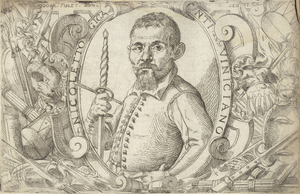 | |
| Born | 1550-1560 Fossombrone, Italy |
| Died | after 1622 Venice, Italy (?) |
| Occupation |
|
| Nationality | Italian |
| Citizenship | Republic of Venice |
| Patron | Cosimo II de Medici |
| Influenced | Bondì di Mazo (?) |
| Genres | Fencing manual |
| Language | Italian |
| Notable work(s) |
|
Nicoletto Giganti (Niccoletto, Nicolat; 1550s-after 1622[1]) was a 16th – 17th century Italian soldier and fencing master. He was likely born to a noble family in Fossombrone in central Italy,[2] and only later became a citizen of Venice as he stated on the title page of his 1606 treatise. Little is known of Giganti’s life, but in the dedication to his 1606 treatise he counts twenty seven years of professional experience (possibly referring to service in the Venetian military, a long tradition of the Giganti family).[3] The preface to his 1608 treatise describes him as a Mastro d'Arme of the Order of St. Stephen in Pisa, giving some further clues to his career.
In 1606, Giganti published a popular treatise on the use of the rapier (both single and with the dagger) titled Scola, overo teatro ("School or Fencing Hall"). This treatise is structured as a series of progressively more complex lessons, and Tom Leoni opines that this treatise is the best pedagogical work on rapier fencing of the early 17th century.[4] It is also the first treatise to fully articulate the principle of the lunge.
In 1608, Giganti made good the promise in his first book that he would publish a second volume.[5] Titled Libro secondo di Niccoletto Giganti Venetiano, it covers the same weapons as the first as well as rapier and buckler, rapier and cloak, rapier and shield, single dagger, and mixed weapon encounters. This text in turn promises two additional works, on the dagger and on cutting with the rapier, but there is no record of these books ever being published.
While Giganti's second book quickly disappeared from history, his first seems to have been quite popular: reprints, mostly unauthorized, sprang up many times over the subsequent decades, both in the original Italian and, beginning in 1619, in French and German translations. This unauthorized dual-language edition also included book 2 of Salvator Fabris' 1606 treatise Lo Schermo, overo Scienza d’Arme which, coupled with the loss of Giganti's true second book, is probably what has lead many later bibliographers to accuse Giganti himself of plagiarism.
Contents
Treatise
Research on Giganti's newly-rediscovered second book is still ongoing, and it is not currently included in the tables below.
Images |
Italian (1606) |
German (1619) |
French (1619) | |
|---|---|---|---|---|
SCHOOL, OR THEATRE In which different manners and methods of parrying and wounding with the single sword and sword and dagger are represented; Where every scholar will be able to exercise and become practised in the profession of arms |
[i] SCOLA, OVERO TEATRO, Nelquale sono rappresentate diverse maniere, e modi di parare, e di ferire di Spada sola, e di Spada, e Pugnale; Dove ogni studioso potrà essercitarsi, & farsi prattico nella professione dell’Armi, |
Text to copy over | ||
BY NICOLETTO GIGANTI, VENETIAN, TO THE MOST SERENE DON COSMO DE' MEDICI GREAT PRINCE OF TUSCANY |
DI NICOLETTO GIGANTI VINITIANO, AL SERENISS. D. COSMO DE’ MEDICI GRAN PRINCIPE DI TOSCANA. |
|||
With license and privilege of the Superiors IN VENICE |
Con licenza de’ Superiori, & Privilegio. IN VENETIA, |
|||
TO THE MOST SERENE DON COSMO DE MEDICI GREAT PRINCE OF TUSCANY my only Lord Just as iron extracted from the rough mines would be useless if it had not received shape suited to human armies from industrious art, thus the same in the hands of the strong soldier can be of little profit if, accompanied by studious and wise valour, the way is not made clear for every difficult and triumphant success. In this way to a point since the Good Shepherd welcomes the operation, because almost all the noblest things proceeding from our actions receive appropriate material from His hands, which, refined and dignified by the industry of the spirit, achieve miraculous and powerful effects. Now I say that this temperament is wonderfully demonstrated in the excellent and illustrious greatness of Your Most Serene Highness, who holds the natural greatnesses brought back to their peak from the invincible glorious works of your Ancestors, not only in the ancient and royal histories, but reflecting in yourself all the light of the present and past splendour, adorning them with your own virtues so that everyone admires the most divine tempers, and with wonderment says such a Most Serene Lord is no less fitting to that Most Serene State, than such a Most Serene State to that Most Serene Lord. But I will only say that this proposition, just as is demonstrated clearly in all the arts; so it is evidently perceived in exercising arms. Discussing the strength of iron, although it is exercised by a strong arm and agile body, if it is not tuned with observed rules and exercised study it is shown to be perilous and of little valour: Whereas if the art can be known by a wise captain, and he obeys it as a bold minister, they make marvelous prowess of it. You serve us as a clear example, who Heaven had to grant all height of perfect quality as in the most complete illumination of the present age. You who have in the noblest proportion stature, puissance, vigour joined to agility, promptness, and strength, in order to draw with your highest ingenuity the finesse of industry, advice, time, and art that can make you most a complete and Most Illustrious Captain, a Most Serene and most singular Prince. |
[iii] AL SERENISSIMO DON COSMO DE’ MEDICI GRAN PRINCIPE DI TOSCANA unico mio Signore. SI come il ferro dalle rigide minere sotratto inutile riuscirebbe, se dall’arte industre non riceveste forma accommodata a gli essercitii humani: Così l’istesso nelle mani del forte soldato riesce di poco frutto, se da studioso, & accorto valore accompagnato non s’apre la strada ad ogni difficile, & vittorioso successo. In questo modo a punto, perche, l’eterno fattore si compiace di operare. Perche [iv] quasi tutte le più nobil cose, procedenti da gli effetti nostri ricevono accomodata materia dalle sue mani, la quale poi raffinata, & illustrata dall’industria dell’animo fà riuscire effetti mirabili, e postenti. Taccio hora che questo temperamento meravigliosamente si dimostri nell’Eccelse, & illustri grandezze di Vostra Altezza Sereniss. la quale, non solo nelli antichi, & regii annali tiene le naturali grandezze ridotte al colmo da invitte opre gloriose de gli Avi suoi, ma in se stessa reflettendo tutto il lume del presente, & del passato splendore così gli adorna con le proprie virtudi , che ogn’un ammira le divinissime tempre, & con stupore dice non meno convenirsi tal Sereniss. Signore a quel Sereniss. Stato, che tal Serenissimo Stato a quel Serenissimo Signore: Ma dirò solo, che il detto proposto, si come in tutte le arti si dimostra chiaro; così si scerne evidentemente nell’armeggiare, & trattar la forza del ferro, il quale benche da forte braccio, & agil corpo sia essercitato, se però con osservate regole, & essercitato studio non vien accordato, e periglioso si mostra, e di poco valore: Ove, che se la possa riconosce l’arte per duce accorta, e le obedisce come ministra ardita, ne riescono meravigliose prodezze. Ci serve per essempio chiaro il testimonio di lei, nella qual dovendo il Ciel accordare ogni colmo di perfetta qualità come in compitissimo lume dell’età presente, hà in nobilissima proportione di statura, di poderosità, di fangue congionta l’agilità, la prontezza, la forza, per trarne con l’altissimo ingegno suo la finezza dell’industria, [v] dell’aviso, del tempo, e dell’arte, che possono far compitissimo & Illustrissimo Capitano un Serenissimo, & singolarissimo Principe. |
|||
Wherefore I, recognizing and admiring with humblest affection the mature splendour of your newly made and happy years, and reading in the face of the world the secure hopes and fruits of the future age, adoring that hand from which Italy and the entire world is taking safe rest and glorious protection, to that I offer and consecrate with humble dedication this small, I will certainly not say fruit, but work of my labours. Therefore, it only must please you, being of material welcomed by you which deigns to bend your Most Serene eye. To that end, let many of your highest rays pass over where the baseness of my ingenuity with the exercise of this art that I have dealt with for 27 years does not arrive. Let this work, in itself humble, present itself happily to the view of the World. It will be effected with the action of my devotion, together with the fruit of your Most Serene mercy, who serving being the full glory, I pray that Heaven makes me a worthy, even lowest servant. In Venice February 10, 1606
|
Onde io riconoscendo, & ammirando con humilissimo affetto il maturo splendore de gli freschi, & felici anni suoi; & legendo nella fronte del mondo le sicure speranze, & frutti dell’età futura; Adorando quella mano dalla quale l’Italia, e il Mondo tutto, è per prender sicuro riposo, e gloriosa protettione; a quella porgo, e consacro con humil dedicatione questo poco non dirò già frutto, ma fatica delle mie fatiche, che perciò solo le doverà gradire, essendo di materia da lei gradita; Nel quale si degnerà piegar l’occhio suo Serenissimo, acciò , ove la bassezza del mio ingegno con l’esercitio di quest’arte, che per anni 27. vò trattando, non arriva; trapassi tanti del suo altissimo raggio, che facci comparire l’opra in se humile, felicemente alla vista del Mondo; & sarà insieme effetto della mia devotione, & frutto della Sereniss. benignità sua, Alla qual essendo somma gloria il servire, pregherò il Cielo che mi facci degno, benche infimo servitore. Di Venetia a’ 10. Febraro 1606.
|
Text to copy over | ||
TO THE LORD READERS, ALMORO LOMBARDO, Son of the Most Renowned Lord Marco. Wanting to write on the matter of arms, although the author does not mention that it is a science, to me it appears a necessary thing, Lord Readers, to treat with what share it has, and of which name it would adorn itself so that everyone knows its greatness, dignity, and privilege. Whereupon first some students of this this most noble science read and discuss the most learned and easy observations of this valorous and knowledgeable professor Nicoletto Giganti, I, by observing the rule and general precept of a person who wants to address anything, will come to the definition, and then to the general division of this word Science, from which it will be possible for two things to finally be recognized by everyone, showing us that this beautiful profession is science. Science, therefore, is a certain and manifest knowledge of things that the intellect acquires. It is of two sorts, that is, Speculative and Practical. Speculative is a simple operation of the intellect around its own object. Practical only consists in the actual workings of the intellect. Speculative is divided in two parts, that is, in Real Speculation and Rational Speculation. The Real aims at the reality of its object, which demonstrates its essence on its exterior. The Rational consists of those things that only the intellect administers and does not extend itself to other goals. Physics is a Real Speculative Science that only aims at moving and natural things, like the elements. Mathematics is a Real Speculative Science that only extends itself to continuous and discrete quantity. Continuous like lines, circles, surfaces, the measures of which deal with Arithmetic. Grammar, Rhetoric, Poetry, and Logic are Rational Speculative Sciences. Practical Science is divided in two: Active and Workable. Active is Ethics, Politics, and Economics. Workable can be divided in seven others, called mechanical, which are these: Woolcraft, Agriculture, Soldiery, Navigation, Medicine, Hunting, and Metalworking. Now, coming to what I promised above about this noble science, I will go over its qualities and nature, discussing whether it is Speculative or Practical science. In my opinion I say that it is Speculative, and prove it with diverse reasons. That it is science there is no doubt, because it is not acquired if it is not mediated by the operation of the intellect, from which it is born. That it is Speculative is certain since it does not consist in anything other than simple knowledge of its object, as I will be discussing below. The object of this science is nothing more than parrying and wounding. The knowledge of those two things is a work of the intellect, and moreover with intelligence professors of this science do not extend it further than the knowledge of them, which cannot be understood at all unless one first has knowledge of tempi and measures, or rather, knowledge of Feint, Disengage, or resolution without knowledge of tempi and measures. These are all operations of the intellect, and moreover outside of this knowledge the intellect does not extend, because as I have said the aim of these professions is understanding parrying. We will see if it is Real Speculative or Rational Speculative. Considering this, it cannot be Rational, and the reason is this: because if it is indeed an operation of the intellect, nevertheless it spreads further, wherefore I find it to be Real Speculative. Real, because the knowledge of its aim is shown to us outwardly by the intellect. As the understanding of wounding and parrying, with tempi, measures, feints, disengages, and resolutions, even though they are operations of the intellect, they cannot be understood if not outwardly, and this exterior consists in the bearing of the body and of the Sword in the guards and counterguards, which all consist of circles, angles, lines, surfaces, measures, and of numbers. These things, which must be observed, can be read about in Camillo Agrippa and in many other professors of this science. Note that just as those operations of the intellect without an exterior operation cannot be shown, so these exterior operations cannot be understood without the operations of the intellect first, in a manner that this science, which derives from the intellect, cannot be understood if not outwardly. Neither can one understand outwardly without operations of the intellect. These operations seek to understand the greatness, excellence, and perfection of this profession, and always come united. As there can never be Sun without day, nor day without Sun, never will there be those without these, nor these without those. In the end we see that it is Real Speculative Science. This science of the Sword, or of arms, is a Real Speculative Mathematic Science, and Geometric, and Arithmetic. Geometric because it consists in lines, circles, angles, surfaces, and measures. Arithmetic because it consists of numbers. There is no motion of the body that does not make an angle or constraint. There is no motion of the Sword that does not travel in a line. There is neither guard nor counterguard that does not go by the number. The observations of these things all depend on knowledge of tempi and measures, whence I conclude that this most noble science is Real, Mathematic, Geometric, and Arithmetic, as I said a little above. |
[vii] ALLI SIG. LETTORI, ALMORO LOMBARDO fù del Clarissimo Signor Marco. VOLENDOSI scrivere nella meteria dell’armi, benche l’auttore non facci mentione, che scentia ella si sia, pur à me pare cosa necessaria, ò Signori Lettori di trattare che parte ella habbia, & di qual nome ella s’adorni, & ciò perche ciascuno conosca quale sia la grandezza, la dignità & il privilegio suo. La onde prima che alcuno studioso di questa nobilissima scienza legga, & discorra le dottissime, e facilissime osservationi di questo valoroso, & intendente professore Nicoletto Gigantil io per osservare la regola, & il precetto generale di chi vuole trattare di cosa alcuna, verrò alla diffinitione, & poi alla divisione generale di questa voce Scienza, dalle quali due cose finalmente potrà venire in consideratione à ciascuno, che scienza questa bella professione ci mostri. La Scienza adunque è una certa, & manifesta cognitione delle cose, che l’intelletto acquista: & questa è di due sorti, cioè Speculativa, & Prattica. La Speculativa è una semplice operatione dell’intelletto circa il suo proprio oggetto. La Prattica solo consiste nelle attuali operationi dell’intelletto. La Speculativa si divide in due parti, cioè in Speculativa reale, & in Speculativa rationale. La reale mira alla realtà dell’oggetto suo, il quale dimo- [viii] stra nell’esteriore l’essentia sua. La rationale consiste intorno à quelle cose, che solo l’intelletto gli somministra, nè più in oltre vuole, che l’esser suo s’estenda. La Fisica è una scienza reale speculativa, che solo mira alle cose mobili, e naturali, come à gli elementi. La matematica è una scienza Speculativa reale, che solo estende l’esser suo in quanto continuo e discreto; continuo come intorno alle linee, à i circoli, alle superficie; & le misure di questa tratta l’Arithmetica. La Grammatica, la Retorica, la Poesia, la Logica sono scienze speculative rationali. La Scientia prattica, si divide ancor ella in due, in Attiva, e Fattiva; Attiva è l’Etica, la Politica, e l’Economica; la Fattiva poi si divide in sette altre, le quali si chiamano mechaniche, e sono queste il Lanificio, l’Agricoltura, il Soldato mercenario, la Navigatione, la Medicina, la Caccia, e l’arte Fabrile. Hora per venire a quello c’ho di sopra promesso circa a questa nobil scienza, andrò sopra le qualità, e la natura sua discorrendo, cioè s’ella sia scientia Speculativa, o Prattica. Io per opinione mia dico, & lo provo con diverse ragioni ch’ella è Speculativa. Et che sii scienza non v’è dubio alcuno, perche questa non s’acquista se non mediante l’operatione dell’intelletto, dalla quale essa nasce; ch’ella sia Speculativa è cosa certa poiche non tonsiste in altro, che nella semplice cognitione dell’oggetto suo, come andrò mostrando più a basso: Et l’oggetto di questa scienza altro non è, che il riparare, & il ferire; il saper delle quali due cose, è opera dell’intelletto; nè il professore di questa scienza più in oltre s’estende con l’ingegno, che nella cognitione di queste due cose, lequali non potrà alcuno sapere se prima non havrà la cognitione de’ tempi, e delle misure, ò di Finte, ò di Cavatione, ò di risolutioni senza cognitione de’ tempi, e delle misure, & queste sono tutte operationi dell’intelletto, & fuori di questa cognitione l’intelletto non s’estende più in oltre; perche come ho detto il fine di queste professione è saper riparare; ma vediamo s’ella sÿ speculativa reale, ò speculativa rationale. Io vado considerando, che rationale non può essere, & la ragione è que- [ix] sta, perche se ben ella è operatione dell’intelletto; nondimeno più in oltre si diffonde; perilche trovo ella esser speculativa reale. Reale, perche la cognitione del suo fine ci vien mostrata dall’intelletto esteriormente; poiche il saper ferire, & il saper riparare con i tempi, con le misure, finte, cavationi, e risolutioni, benche siano operationi dell’intelletto, non perciò si possono conoscere, se non esteriormente, e questo esteriore consiste nel portamento del corpo, & della Spada nelle guardie, e nelle contraguardie, ilche tutto consiste ne i circoli, negli angoli, nelle linee, nelle superficie, nelle misure, e ne i numeri; lequali cose, come che s’habbino à osservare, si potrà leggere in Camillo Agrippa, & in molti altri professori di questa scienza. Ma notate, che si come quelle operationi dell’intelletto senza una operatione esteriore non si possono mostrare: così queste operationi esteriori non si possono conoscere senza le prime operationi dell’intelletto, in maniera che questa scienza non si può conoscere, che derivi dall’intelletto, se non esteriormente; nè si può conoscere esteriormente senza operatione dell’intelletto, le quali operationi à voler conoscere la grandezza, eccellenza, e perfettione di questa professione, sempre si vedranno unite; e come non sarà mai Sole senza giorno, nè giorno senza Sole, non saranno mai quelle senza queste, nè queste senza quelle. Resta che noi vediamo, che scienza Speculativa reale ella sia. Questa scienza della Spada, ò dell’armi, è una scienza Speculativa real Mathematica, & è di Geometria, & Arithmetica; di Geometria perche consiste in linee, circoli, angoli, superficie, e misure. Di Arithmetica, perche consiste in numeri; non è moto del corpo, che non facci angolo, o vincolo; non è moto della Spada, che non camini per linea; non è guardia, nè contraguardia, che non vadi per numero; l’osservationi delle quali cose tutte dipendono dalla cognitione de’ tempi, e delle misure; onde concludo, che questa nobilissima scienza sia Speculativa reale Mathematica, di Geometria, & Arithmetica, come poco di sopra hò detto. |
Text to copy over | ||
Perhaps some inquisitive person arguing over this could say that the science of arms is a Practical Science with this reason: that being a Practical Science, a science which not only extends to the knowledge of its own object but to the operation of it, this science is therefore Practical, and not Speculative. To this objection I respond: all things have from nature their operation. Three are the sorts of their operations; some are internal, and these have their being in pure and simple intellect, and result from a Rational Speculative. Some are internal and external, and these have a commonality inside the intellect and outside, and are born from a Real Speculative. Some are completely external, and these have their being outside the intellect entirely and depend on a Practical Science, and are either Active or Workable. The Speculative Workable Real Science is no different from the Practical Science other than in this: the Real Speculative operates outwardly on its object and through the knowledge of that serves the intellect. The Practical Science not only cannot operate on its object if not outwardly, it cannot even come to the knowledge of it if not outwardly. The science of arms has the knowledge of its object in the intellect, and even though it operates outwardly, it cannot be said that it is Practical, but instead Speculative Real Science. We have therefore seen that it is a science and it is Mathematics, of Geometry and Arithmetic, since it consists of numbers, lines, and measures. The author does not make mention of this in his observations, so that from him learned persons and those with no study may acquire some profit. Therefore, from his present figures and noted lessons, without learning to understand the multiplicity of lines, circles, angles, surfaces which would rather confuse the minds of readers that do not have understanding of these studies, nor give them any instruction, without a doubt everyone will learn to understand without difficulty the tempi, measures, resolutions, feints, disengages, and the way of parrying and wounding. As for knowing how to understand the circles, lines, and other things mentioned above, every studious person will come to understand them with exercise. I will always advise everyone to apply themselves to the study of letters before this profession, because one that has studied in order to have understanding of the necessary things around this science will better profit and will make themselves more excellent and more perfect, with much more quickness of time for the acquisition, so that he can understand the aforesaid things of the guards, counterguards, covered just as uncovered. He that has not studied will not obtain it so easily, which, if he can learn it well, he will not therefore acquire understanding of this science without length of time and continuous exercise. This profession is of so much dignity and consideration. What decorum does it seek? What reputation and how much honour must one give it? Under what obligation is one that carries the sword and makes a profession of it? I say its dignity and consideration derive totally from its qualities, and with the division of the same one can come to understand. This science of the sword is divided into three parts. The first is divided in two: Natural and Artificial. Natural is a demonstrative discourse man makes use of naturally in parrying and wounding, since with his own ingenuity he proceeds with those goals extracting what mother nature administers to him for his needs. Here is what many men of courage and spirit have shown great measure of in their contentions with men of great art and knowledge. The Artificial is that which with ingenuity and long use and exercise found under short rules and impossible methods different manners of parrying and wounding with the above noted things. Accordingly, coming to some occasion the man extracts from this the real ends of his safety. In his lessons the author shows great understanding of those two qualities, and the reader will be fully satisfied with them. The second part is this: the Artificial science of the sword is divided in two, Demonstrative and Exercised. The Demonstrative is that which demonstrates the proper method, and aims at knowledge of parrying and of wounding, by firm foot just as with the pass, when one must bind the enemy and when one must draw back by way of those lines, circles, or circumstances you remember from above, for which the intellect governs and imparts the many and multiple postures and counterpostures of the body. The Exercise is the same as the Demonstrative which, since we have acquired it, we apply to the understanding of a thousand warnings. There is no difference between them, except that the Demonstrative is self-contained, and the Exercised extends to serve the understanding of different things. The third part is this: the Demonstrative science of the sword is divided in two: the first Demonstrative consists of uncomplicated ends, that is, in simple ends, or composite, that unite in themselves more ends for the same Demonstratives of various occurrences, such as being outside of measure with the arms open, the weapons high or low. These ends require incomplete ends, that is, ends not understood by the enemy. They are called simple because they are natural. They are called composite because they have in themselves many considerations, and these are divided into the first and the second concepts. The first concepts are real things that are first learned from the intellect, like parrying and wounding, and these come in the first intention. The second concepts are formed from the intellect, and these make the second of our intentions, the knowledge in order to be able to wound and parry, and are made through the first, for the reason that immediately when our intellect has learned this aim of wounding and parrying, it soon discusses how this can be done in a different manner and with different methods. The second Demonstrative consists of the complex ends, that is, of ends that unite in themselves more ends for the same demonstratives, and these aims either united in measure or separate in distance demonstrate their ends, like being in guard with the weapons closed demonstrates, or the posture or counterposture of the body in measure or at distance which is the aim of that, and how many things can be done with that working. For this reason one sees of how much consideration this beautiful science is for its qualities, and for the aims it contains. Therefore, just as it is of great dignity, because it is real Speculative Mathematics of Geometry and Arithmetic, and for many parts found under itself, such decorum and reputation I say it requires. No other will be the decorum and reputation if not this. And also considering, o Readers, that this science for the most part is found in royal courts, and of every Prince, in the most famous Cities, studied by Barons, Counts, Knights, and persons of great quality, and for no other reason if not because just as it is noble, it excites and inflames our spirits to great things, to learn, and to heroic actions, to match of the virtue of the spirit, the valour of the body, the vigour of the strength, and the skill of the person. This always seeks parity, and does not allow any blemish to it. It wants to be understood and learned, but not to be professed for every folly one takes up. It flees the disputes of villainous persons. It does not do all that it can. It shows itself at the time and place. It avoids the practices of excess. It is of few words. It desires a serious comportment, a lively eye, an honoured dress, and a noble practice. This is enough about its decorum and reputation. In regard to the honour that it requires, advising that the observance of all the said things is honour to this profession, it remains only to be said what obligation one who carries the sword is under. We will pass by the aims of these Duellists who, just as they have badly learned the said profession, so I say with many of their propositions they degrade it and have reduced it to such an unhappy state that it not only casts aside the virtuous life which demands such a science, and human discourse, and every reason, but forgetting the great God, and themselves as a consequence, their unjust aims can only possess it for the damnation of their spirits, postponing the divine church for their diabolical thoughts. |
Ma potrebbe forse qualche curioso argomentando sopra questa dire, che la scienza dell’- [x] armi fusse una scienza prattica, con questa ragione che essendo la scienza prattica, una scienza laquale non solo s’estendi nella cognitione del suo proprio oggetto, ma nell’operar in esso; & la scienza della Spada essendo una scienza, che non solo versi nella cognitione, ma nell’operatione di essa, che perciò questa scienza è Prattica, e non Speculativa. Alla qual oppositione rispondo; tutte le cose hanno dalla natura qualche operatione. Et trè sono le sorti delle nostre operationi; alcune sono interne, & queste hanno l’esser suo nel puro, e semplice intelletto, e derivano da una rational Speculativa; alcune sono interne, & esterne, & queste hanno una communanza nell’intelletto, e fuori, e nascono da una speculativa reale; alcune sono affatto esterne, e queste hanno l’esser loro fuori dell’intelletto affatto, e dipendono da una scienza prattica, & sono ò attive, ò fattive: la scienza speculativa fattiva reale non è differente dalla scienza Prattica in altro ch’in questo, che la Speculativa reale, se ben opera esteriormente nell’oggetto suo; serva però la cognitione di quello nell’intelletto, e la scienza Prattica, oltre che non può operar se non esteriormente nell’oggetto suo, non può etiam Dio venire alla cognitione di esso se non esteriormente la scienza dell’armi hà la cognitione dell’oggetto suo nell’intelletto, se bene opera esteriormente, non si può dire ch’ella sia Prattica, ma scienza Speculativa reale. Habbiamo adunque veduto che scienza ella si sia, & è Mathematica di Geometria & Arithmetica, perche ella consiste numeri, linee, e misure, delle quali l’auttore non fà mentione nelle osservationi sue, perche da lui le persone dotte, e quelle di nessuno studio qualche frutto acquistano, onde ciascuno dalle presenti figure, e dalle lettioni sue noti, che senza imparare a conoscere la multiplicità delle linee, de’ circoli, de’ angoli, di superficie, le quali più tosto confunderebbono la mente del Lettore, che non havrà la cognitione di questi studÿ, ne gli darebbono ammaestramento alcuno; imparerà a conoscere senza dubbio, e senza fatica i tempi, e le misure, e le rissolutioni, le finte, le cavationi, & il modo di saper riparare, e di saper ferire. [xi] Circa poi saper conoscere i circoli, e le linee, e l’altre cose dette di sopra ogni studioso da se stesso con l’essercitio di questa venirà in cognitione di esse; e sempre consigliarò ogn’uno, che s’applichi prima allo studo delle lettere, che a questa professione, perche più profitto farà colui, che haverà studiato per la cognitione c’haverà delle cose necessarie circa questa scienza, e si farà più eccellente, e più perfetto, & con brevità di tempo assai maggiore, per l’acquisto, che può fare conoscendo le sopradette cose delle guardie, delle contraguardie, così coperto, come discoperto; ilche quello che non haverà studiato, non ottenerà così facilmente; ilquale se bene potrebbe imparare, non perciò acquisterà senza lunghezza di tempo, e continuo essercitio la cognitione di questa scienza. Questa professione di quanta dignità sia, & di quanta consideratione, e che decoro ricerca, & che riputatione, & quanto honer le si deve, & in che obligo sia uno, che porti la Spada, & ne facci professione, dirò la dignità sua, & la sua consideratione tutta derivar dalle qualità sue, delle quali con la divisione dell’istessa si può venire in cognitione. In trè parti si divide questa scienza della Spada; la prima si divide in due, in naturale, & artificiosa: La naturale è un discorso demostrativo, del quale l’huomo si serve naturalmente, e nel riparare, e nel ferire; impercioche con il proprio ingegno egli và con quei termini cavando, che la maestra natura per necessità della persona gli somministra, e di quì è, che molti huomini di core, e di animo hanno mostrato gran paragone di questa nelle loro questioni con huomini di grand’arte, & di molto sapere; l’Artificiosa, e quella, la quale con l’ignegno, e con il longo uso, & essercitio ritrova sotto regole corte, & impossibili modi, diverse maniere di saper riparare, e di saper ferire con le cose di sopra nominate: onde venendo a qualche occasione, l’huomo cava da questa i veri termini della sicurezza della sua persona, delle quali due qualità l’auttore mostra nelle sue lettioni grandissima cognitione, & il lettore di esse ne resterà a pieno sodisfatissimo. La seconda parte è questa, che la scienza della Spada artificiosa si divide in due [xii] in Demostrativa, & in Essercitata: la Demostrativa è quella, la quale dimostra il vero modo, e termine di saper riparare, e di saper ferire così di piede fermo, come di passata, e quando si deve stringere l’inimico, e quando si deve portar a dietro per quelle linee, e per quei circoli, e per quelle circonstantie di sopra rammentate, per le quali si và l’intelletto regolando, e comparte le posture, e le contraposture del corpo varie, e moltiplici: L’essercita è l’istessa Demostrativa, la quale, poiche habbiamo acquistato, applichiamo alla cognitione di mille avvertimenti, in altro non è differente l’una dall’altra, se non che la Demostrativa è inquanto se stessa, e l’essercitate è in quanto serve alla cognitione di diverse cose. La terza parte è questa, che la scienza Demostrativa della Spada si divide in due: la prima Demostrativa consiste ne termini incomplessi, cioè, in termini semplici, ò composti, che uniscono in se più termini per se stessi Demostrativi di varii accidenti, e sono questi come l’esser fuori di misura, con le braccia aperte, le armi alte, overo basse, i quali termini si dimandano termini incomplessi, cioè termini non intesi dal nemico; si dicono semplici, perche sono naturali; si dicono composti, perche hanno in se molte considerationi, & questi si dividono ne i primi, & ne i secondi concetti: Gli primi concetti sono le cose reali, che sono prime apprese dall’intelletto, come il riparare, & il ferire, & questi vanno nella prima intentione; Gli secondi concetti formati dall’intelletto sono, e questi fanno la seconda nostra intentione, il sapere, per potere e ferire, e parare; i quali si fanno mediante i primi; impercioche l’intelletto nostro subito che hà appresso questo fine di ferire, e di riparare, tosto discorre come possi ciò fare con diverse maniere, e con diversi modi: La seconda Demostrativa consiste ne’ termini complesi, cioè, in termini che uniscono in se più termini per se stessi demostrativi, i quali termini o uniti in misura, ò separati in distantia demostrano il fine loro, come l’esser in guardia chiuso nell’armi dimostra ò in distnaza, ò in misura della postura del corpo, ò contrapostura il fine di quella, quale [xiii] sia, & quante cose si possino con quella operare; perilche si vede di quanta consideratione sia questa bella scienza per le qualità sue, e per gli termini che contiene. Questa dunque così come è di gran dignità, perche sia Speculativa reale Mathematica, di Geometria, & Arithmetica, e per tante parti quante sotto di se trova, così dico ricerca decoro, & reputatione, nè altro sarà il decoro, e la reputatione di essa, se non questa. E da considerare, ò Lettori, che questa scienza per il più si trova nelle corti regali, e d’ogni Principe; nelle Città più famose studiata da Baroni, da Conti, da Cavalieri, & da persone di qualità grandi; e non per altro, se non perche, così come è nobile, eccita, & infiamma gli animi nostri alle cose grandi, all’imprese, & alli atti heroici, à far paragone della virtù dell’animo, del valore del corpo, della gagliardia, della fortezza, & della destrezza della persona. Questa sempre ricerca parità, non permette, che gli sia fatto incarco; vuol’ esser conosciuta, & intesa, ma non professa, non per ogni follia s’adopra; fugge la contesa delle persone vili; non fà tutto quello che può; si mostra à tempo, e luogo; schifa le prattiche delle crapule; poche parole; vuol un caminar grave, un occhio vivo; un vestir honorato, & una pratica nobile; & questo è quanto al decoro, & reputatione sua. Quanto all’honore che le si deve, è da avertire, che l’osservanza di tutte le dette cose è honore alla detta professione; resta solo dire, in che obligo sia colui, che porta la Spada: tralascieremo i termni di questi Duellisti, i quali così come hanno mal intesa la detta professione, così dico con molti loro proposti l’avviliscono; & l’hanno ridotta à così infelice stato, che non sol messa da parte la vita virtuosa, che ricerca una tanta scienza, & l’human discorso, & ogni ragione; ma obliando il grande Iddio, & se stessi per conseguire i loro ingiusti fini, la possedono solo per dannatione delle anime loro, postponendo il divin culto alli loro diabolici pensieri. |
|||
This profession, o Readers, puts one who practices it under obligation to learn, and considering this wants to be used in four occasions: the first for Faith, then for Country, for defence of one’s own life, and finally for honour. It always wants to be a defender of reason, never taken hold of in order to do wrong, and one who does so makes an injury to this profession. Neither will a man of honour have held onto a wrong in order to fight, but will only do so for the said things. It is necessary to have occasion because fighting without one is a thing of the foolish and drunk. Some as soon as they have acquired some beginning of this mock, putting the Sword at their side, and using a thousand insolences, either stop or wound someone, and at such time kill some miserable person, believing themselves to have acquired honour and fame. They do evil, because other than making an outrage to the nobility of this which must not be put in use without reason, they offend the just God and themselves. In order to not come to tedium I will not continue, but only exhort each to study such a noble and real science, begging him to keep in mind the underwritten observations of our noble professor, and practice in it, because with brevity of time one can acquire no small profit, observing how much it suits honour, glory, and greatness themselves. |
[xiv] Questa professione, o Lettori, mette in obligo chi l’essercita di quanto intenderete; è da considerare, che questa vuol’esser usata in quattro occasioni; nella prima per la Fede, poi per la Patria, per difesa della propria vita, & finalmente dell’honore, e questa vuol’esser difensora sempre della ragione, nè mai s’appiglia al torto; e colui che s’appiglia al torto, fà ingiuria à questa professione; nè un’ huomo d’honore sarà mai tenuto per il torto à comvattere, ma ben per le cose dette; bisogna haver occasione, perche il combattere senza occasione è cosa da pazzi, & da ubriachi. Sogliono alcuni come hanno acquistato qualche principio di questa, ponersi la Spada al lato, & usar mille insolentie, ò con far stare, ò con ferire, & tal volta ammazzare qualche misero, credendosi d’acquistare honore, e fama; & fanno male, perche oltre che fanno oltraggio alla nobilità di questa, la quale non deve esser messa in uso se non con ragione, offendono il giusto Iddio, & se stessi. Non sarò più longo per non venire à tedio, ma solo essorto ciascuno à studiare così nobile, & real scienza, pregandolo à poner mente alle infrascritte osservationi di questo nostro intelligente professore, & essercitarsi in esse, perche non brevità di tempo sarà per non poco frutto acquistarsi, osservando quanto à questa si conviene, à honore, gloria, & grendezza di se stessi. |
|||
COPY The underwritten Most Excellent Lord Captains of the most Illustrious Council of Ten have belief from the Lord Reformers of the Studio of Padua by report of the two elected, that is, of the Reverend Father Inquisitor and of the Secretary of the Senate Zuane Maravegia, with oath, that in this book titled School, or Theatre by Nicoletto Giganti, Venetian, nothing contrary to the law is found. It is worthy of print, granted licence, and may be printed in this city.
|
[xv] COPIA GLI Eccellentiss. Signori Capi dell’Illustriss. Consiglio di Dieci infrascritti, havuta fede dalli Signori Reformatori del Studio di Padova per relation delli duoi à ciò deputati, cioè del Rever. Padre Inquisitore, & del Circonsp. Secretario del Senato Zuane Maravegia con giuramento, che nel libro intitolato Scola, overo Teatro, di Nicoletto Giganti Venetiano, non si trova cosa alcuna contraria alle leggi, & è degno di Stampa, concedono licentia, che possa esser Stampato in questa Città.
|
|||
December 23, 1605 in Senate The power is granted to our faithful Nicoletto Giganti, Venetian, that other than him or one at his behest, it is not permitted for the space of the next thirty years to venture to print in this City, nor any other City, Land, or place of our Domain, nor printed elsewhere to conduct or sell in Our Domain the book composed by him, titled School, or Theatre, under pain of losing printed work, or conducted, which is by the aforesaid Nicoletto Giganti, and being obliged to observe what is required by our law in matters of Printing, of paying three hundred ducats: a third to our Arsenal, a third to the Magistrate that makes the execution, and the other third to the complainant. |
[xvi] 1605. a 23. di Decembre in Senato CHE sia concessa facultà al fedel nostro Nicoletto Giganti Venetiano, che altri che lui, ò chi haverà a causa da lui, non possi per il spatio d’anni trenta prossimi venturi stampar in questa Città, nè in cadaun’altra Città, Terra, & luogo del Dominio nostro, nè altrove stampato condur, overo vender in esso Dominio Nostro il Libro da lui composto, intitolato Scola, overo Teatro, sotto pena di perder le Opere stampate, overo condotte, le quali siano del sopradetto Nicoletto Giganti, & di pagar ducati trecento, un terzo de’ quali sia dell’Arsenal nostro, un terzo del Magistrato, che farà l’essecutione, & l’altro terzo del denuntiante; essendo obligato osservar quanto è disposto dalle leggi nostre in materia di Stampe. |
Text to copy over |
Images |
Italian (1606) |
German (1619) |
French (1619) | |
|---|---|---|---|---|
| GUARDS AND COUNTERGUARDS
It is necessary for someone wanting to become a professor of the science of arms to understand many things. To give my lessons a beginning, I will first begin to discuss the guards and counterguards, or postures and counterpostures, of the sword. This, because coming to some incident of contention it is first necessary to understand this to be able to secure oneself against the enemy. To place oneself in guard then, many things must be observed, as can be seen in my figures: standing firm over the feet, that are low and the foundation of the entire body, in a just pace, restrained rather than long in order to be able to increase it, holding the sword and dagger strongly in the hands, the dagger now high, now low, now extended, the sword now high, now low, now on the right side, ready to parry and wound so that the enemy throwing either a thrust or cut can be parried and wounded in the same tempo, with the vita disposed and ready because lacking the disposition and readiness of that it will be an easy thing for the enemy to put it into disorder with a dritto, a riverso, a thrust, or in another manner, and even if such a person parried they would remain in danger. It is advised to let the dagger watch the enemy’s sword, because if the enemy throws it will parry that. Always aim the sword at the uncovered part of the enemy so that the enemy is wounded when throwing. This is all the artifice of this profession. Moreover, one must note that all the motions of the sword are guards to one who knows them, and all guards are good to one who practices, as on the contrary no motion is a guard to one who does not understand, and they are not good for one who does not know how to use them. This profession does not require more than science and exercise, and this exercise presents the science. Placing oneself uncovered in guard is artifice and done because the enemy disorders themselves when throwing and ends up in danger. Placing oneself covered is also artifice because in binding the enemy can be wounded. In this way it is understood that every guard aids one who has skill and understands, and no guard is valuable to he who does not have skill or understanding. This is enough about the guards. As for the counterguards, be advised that one who has knowledge of this profession will never place themselves in guard, but will seek to place themselves against the guards. Wanting to do so, be warned of this: one must place oneself outside of measure, that is, at a distance, with the sword and dagger high, strong with the vita, and with a firm and balanced pace, then consider the guard of the enemy. Afterwards approach him little by little with your sword binding his for safety, that is, almost resting your sword on his so that it covers it because he will not be able to wound if he does not disengage the sword. The reason for this is that in disengaging he performs two actions. First he disengages, which is the first tempo, then wounding, which is the second. While he disengages, in that same tempo he can come to be wounded in many ways before he has time to wound, as one will see in the figures of my book. If he changes guard for the counterguard it is necessary to follow him along with the sword forward and the dagger, always securing his sword, because in the first tempo he will always have to disengage the sword and end up wounded. It will never be possible for him to wound if not with two tempi, and from those parrying will always be a very easy thing. This is enough about guards and counterguards. |
DELLE GUARDIE, E CONTRAGUARDIE.
VOLENDO alcuno farsi professore della scientia dell’armi, gli è necessario conoscere molte cose, & per dare à queste mie lettioni principio, comincierò prima à trattare delle guardie, e contraguardie, ò vogliamo dire posture, & contraposture della spada; & questo, perche venendosi à qualche accidente di questione, è necessario conoscere prima questo per poter si contra l’inimico assicurare. A volersi dunque metter in guardia hanno da esser molte cose osservate, come si vede in queste figure mie; & è lo star fermo sopra i piedi, che sono base, & fondomento di tutto il corpo, in un passo giusto, & più presto ristretto che longo, per il poter crescere: tener la spada, & il pugnal forte nelle mani: il pugnale hora alto, hora basso, hora disteso; la spada hora alta, hora bassa; hora al destro lato in atto sempre di riparare, e di ferire, si che tirendo l’inimico, ò di punta, ò di taglio possi riparare, & ferire in un istesso tempo, con la vita disposta e pronta; perche mancando la dispositione, & la prontezza di quella, facil cosa sarà all’inimico il poterla porre in disordine, ò con un dritto, ò con un riversicco; ò con una punta, ò in altra maniera; e quel tale benche riparasse rimarebbe in pericolo. Egli è avertire che il pugnale guardi la spada nemica, perche se il nemico tira, quello pari, & che la spada miri sempre la parte discoperta del nemico; si che tirando resti l’inimico ferito. Et questo è tutto l’artificio di questa professione. Di più si deve notare che tutti li moti della spada sono guardie à chi li sà conoscere; & tutte le guardie perchi essercita sono buone; come all’incontro à chi non intende nessono moto e guardia; & perchi non le sà usare, non sono buone. Questa professione altro non ricerca che scienza, & essercitio, & questa essercitata dona la scienza. Il mettersi discoperto in guardia è artificio, e questo si fà perche l’inimico tirando si metta in disordine, & resti in pericolo: come anco il mettersi coperto è artificio, perche stringendo l’inimico possi ferire; di maniera che si può intendere, che ogni guardia gioua à chi intende, & conosce; & à chi non intende, & conosce, nessuna guardia vale; & questo è quanto alle guardie. Quanto alle contraguardie è d’avertire, che uno c’haverà cognitione di questa professione, mai si metterà in guardia, ma cercherà di mettersi contra le guardie; & volendosi mettere contra alle guardie, è d’avertire questo; che bisogna mettersi fuora di misura, cioè in distantia, con la spada, & il pugnal alto, forte con la vita, & con il passo fermo, e saldo; poi considerar la guardia del nemico; di poi andarlo pian piano con la spada stringendo alla sicuratione della sua, cioè con l’appoggiar la spada quasi alla sua, si che la copra, perche non possi ferire, se non cava la spada: la ragione è questa, che cavando lui fa due effetti: prima cava; ecco il primo tempo, poi ferisce ecco il secondo; mentre egli cava in quell’istesso tempo può restar ferito in molte maniere, come si vedrà nelle figure di questo mio libro, prima che habbi tempo di ferire; se egli si muta di guardia per la contraguardia bisogna seguirlo con la spada inanzi, e con il pugnal longo assicurando sempre la spada sua, perche egli sempre nel primo tempo, c’haverà à cavar la spada habbi à restar ferito, ne possi lui mai ferire, se non con due tempi; dalli quali ripararsi sarà sempre facilissima cosa: & questo è quanto alle guardie, e contraguardie. |
Text to copy over | ||
| TEMPO AND MEASURE
One cannot know how to place oneself in guard, or against the guard, nor how to throw a thrust, an imbroccata, a mandritto, or a riverso, nor how to turn the wrist, nor how to carry the body well, or to best control the sword, or say one understands parrying and wounding, but by understanding tempo and measure which, of one who does not understand, even though they parry and wound, it could not be said that they understand parrying and wounding, because such a person in parrying as in wounding can err and incur a thousand dangers. Therefore, having discussed the guards and counterguards it remains to discuss tempo and measure in order to know how to, then to accommodate an understanding of when one must parry and wound. Therefore, measure means when the sword can reach the enemy. When it cannot it is called being out of measure. Tempo is understood in this way: if the enemy is in guard, one needs to place oneself outside of measure and advance with one’s guard, securing oneself from the enemy’s sword with one’s own, and put one’s mind on what he wants to do. If he disengages, in the disengagement one can wound him, and this is a tempo. If he changes guard, while he changes is a tempo. If he turns, it is a tempo. If he binds to come to measure, while he walks before arriving in measure is a tempo to wound him. If he throws, parrying and wounding in a tempo also is a tempo. If the enemy stays still in guard and waits and you advance to bind him and throw where he is uncovered when you are in measure, it is a tempo, because in every motion of the dagger, sword, foot, and vita such as changing guard, is a tempo in such a way that all these things are tempi: because they contain different intervals, and while the enemy makes one of these motions, he will certainly be wounded because while a person moves they cannot wound. It is necessary to understand this in order to be able to wound and parry. I will be demonstrating more clearly how one must do so in my figures. |
DEL TEMPO, ET DELLA MISURA.
NON per sapersi metter in guardia, overo contro alla guardia, nè per saper tirar una punta, un’imbroccata, un mandritto, ò un riverscio; nè per saper far nodi di mano, nè per portar bene il corpo, nè per meglio dominar la spada, si può dire di saper riparare, & di saper ferire: ma per conoscer il tempo, & la misura, le quali chi non conosce, benche ripara, & benche ferisca, non si può dire di sapere e riparer, e ferire; perche così nel riparare, come nel ferire può errare, & incorrere in mille pericoli. Havendo dunque trattato delle guardie, e contraguardie, resta trattare del tempo, & della misura, per sapersi poi accommodar à conoscer quando si deve riparare, e ferire. La misura dunque s’intende quando con la spada si può arrivar l’inimico; & quando non si può, s’intende esser fuor di misura. Il tempo si conosce in questo modo: se l’inimico è in guardia, bisogna mettersi fuor di misura, & andar con la sua guardia assicurandosi dalla spada nemica con la sua, & poner mente à quanto egli vuol fare: se egli cava, nel cavare si può ferirlo, e questo è tempo: se egli si muta di guardia, mentre si muta è tempo: se egli gira, è tempo: se egli stringe per venir in misura, mentre camina prima ch’arrivi in misura, è tempo di ferirlo: se tira, riparar e ferir in un tempo, anche questo è tempo: se l’inimico stà in guardia fermo per aspettare, andar à stringerlo, e come sete in misura tirar, ove è discoperto, è tempo; perche in ogni moto di pugnale, di spada, di piede, & di vita, come mutarsi di guardia, è tempo. Di maniera che tutte queste cose sono tempi; perche hanno in sè diversi intervalli; & mentre l’inimico farà uno di questi moti, senza dubbio bisogna, che resti ferito; perche mentre si muove, non può ferire. Et questo è necessario sapere per poter ferire, & riparare; il che più distintamente andrò mostrando, come si debba fare nelle mie figure. |
Text to copy over | ||
| The method of throwing the stoccata
Now that we have discussed the guards, counterguards, measures, and tempi, it is a necessary thing to demonstrate and give knowledge of how to hold the vita in order to throw a stoccata and escape since wanting to learn this art it is first necessary to understand how to carry the vita and throw stoccate that are long, as seen in this figure, and all is in throwing brief, strong, and immediate stoccate, withdrawing backward outside of measure. To throw the long stoccata, one must place themselves in a just and strong pace, short rather than long in order to be able to extend, and in throwing the stoccata stretch the sword arm, bending the knee as much as possible. The proper method of throwing the stoccata is after placing oneself in guard, it is necessary to throw the arm first, then extend forward with the vita in one tempo so that the stoccata arrives and the enemy does not perceive it. If the vita were brought forward first the enemy could notice it and, availing himself of the tempo, parry and wound in one tempo. In withdrawing backward one must first carry back the head because behind the head will follow the vita, and afterwards the foot. Carrying the foot back first and leaving the head and vita forward keeps them in great danger. Therefore, to learn this art well one must first practice throwing this stoccata. Knowing it one will learn the rest easily, and not knowing it the contrary. Be advised, Lord readers, that I will place this method of throwing the stoccata many times in my lessons at appropriate times. This I know makes the lessons better understood. It is not said of me that I say one thing many times. |
Del modo di tirar la Stoccata.
HORA che trattato habbiamo di guardie, & contraguardie, di misure, e di tempi, è cosa necessaria dimostrare, & dare ad intendere come s’habbi à portar la vita per tirare una stoccata, & salvarsi; poiche à voler imparare quest’arte è necessario il saper prima portar la vita, & tirar le stoccate longhe, quanto si vede in questa figura: & il tutto stà nel tirare le stoccate longhe, & preste, & forti, & subbito, ritirarsi in dietro fuori della misura. A tirare la stoccata longa, bisogna mettersi con un passo giusto, & forte, più tosto curto, che longo, per poter crescere, & nel tirar la stoccata allongar il braccio della spada, inchinando il ginocchio quanto si può. Il vero modo di tirar la stoccata è che doppo l’essersi messo in guardia, bisogna prima tirar il brazzo, & poi crescer inanzi con la vita in un tempo, che così la stoccata arriva, che’l nemico non se ne avvede; che se prima si portasse inanzi la vita, il nemico se ne avvederebbe, & così servendosii del tempo potrebbe riparare, & ferire in un tempo. Nel ritirarsi indietro bisogna prima portar indietro la testa, poiche dietro alla testa seguirà la vita, & doppo il piede, che portando prima indietro il piede restando la testa, & la vita inanzi, restano in gran pericolo. A voler dunque imparar bene quest’arte, bisogna essercitarsi prima à trare questa stoccata, che sapendo questa facilmente imparerà il resto, come per lo contrario non sapendo, avvertendo Signori elettori, che questo modo di tirar la stoccata la remetterò molte volte in nelle mie lettioni secondo verrà il tempo: questo saccio per dar ad intender melglio la lettione, che non mi sia detto, che dico molte volte una cosa. |
Text to copy over | ||
| Why begin with the single sword
In my first book of arms I proposed to discuss only two kinds of weapons, that is, the single sword and sword and dagger, setting aside discussion of certain others. If it pleases my Lord, I will illuminate all sorts of weapons as soon as possible. Because the sword is the most common and most used weapon of all I wanted to begin with it, since one who understands playing with the sword well will also understand the handling of almost every other kind of weapon. Since it is not usual in every part of the world to carry the dagger, targa, or rotella, and as fighting with single sword occurs many times, I urge everyone to first learn to play with the single sword, despite everything one might have in frays, such as the dagger, the targa, or the rotella, since occurring as it many times does that the dagger, targa, or rotella falls from his hand, a man would have to defend himself and wound the enemy with the single sword, and because one who practices playing with the single sword will understand just as well how to parry and wound as one who has sword and dagger. |
Perche cominci dalla Spada sola.
IN questo mio primo libro d’armi ho proposto di trattare di due sorti d’armi solo; cioè di spada sola, & spada e pugnale, reservando di trattare in alcuni altri che piacendo al Signore, manderò in luce quanto prima d’ogni sorte d’armi. Et perche la spada è la più commune & la più usata arma di tutte le altri, ho voluto cominciare da essa: poiche chi sà bene giocar di spada, saprà anche maneggiare qualche poco ogni altra sorte di armi. Ma poiche non si usa in ogni parte del mondo à portare il pugnale, la targha, ò la rodella; & occorrendo molte volte à combattere à spada sola; io essorto ogn’uno ad imparar prima à giocar di spada sola, con tutto che nelle questioni havesse il pugnale, ò la targha, ò la rodella; poiche occorrendo, come spese volte avviene, che cadendo di mano il pugnale, targha, ò rodella, si possi l’huomo difendere, & ferire l’inimico con la sola spada; poiche chi s’essercita à giocar di spada sola, saprà così bene riparare, & ferire, come s’havesse spada, & pugnale. |
Text to copy over | ||
| GUARDS, OR POSTURES
Many are the guards of the single sword, and many still the counterguards. In my first book I will not teach any other than two sorts of guards and counterguards, of which you will be able to avail yourself for all lessons of the figures of this book. Therefore, before coming to do what you desire, you must go to bind the enemy outside of measure, securing yourself from his sword by placing your sword over his in a way that he cannot wound you if not with two tempi: one will be the disengage of the sword, and the other the wounding of you. In this way you will accommodate yourself against all the guards, either high or low, according to how you see your enemy accommodated, always taking care to not give opportunity and occasion to the enemy to be able to wound you in a single tempo. You will do this if you take care that the point of his sword is not toward the middle of your vita, so that pushing his sword forward quickly and strongly it will not be possible for him to wound you. Therefore, cover the enemy’s sword with yours as you see in this figure, so that the enemy’s sword is outside of your vita and he cannot wound you if he does not disengage his sword. You will settle yourself with your feet strong, stable with your vita, with your sword arm extended and strong in order to parry and wound, as the figure shows you. If you were to see the enemy in a high or low guard and did not place yourself in a counterguard and secure yourself from his sword you would be in danger even if your enemy had lesser science and lacked practice compared to you, since you could produce an incontro and both wound each other, or he could place you on the defensive, or rather, in obedience, with feints or disengages of the sword or other things that are possible. If you secure yourself from the enemy’s sword as I have said above he will not be able to move nor do any action that you will not see and have opportunity to parry. These figures here are two guards with the swords forward, and two counterguards covering the sword. One is made going to bind the enemy on the inside and the other going outside, as these figures show you, and as I will go about showing you in the subsequent lessons. |
GUARDIE, OVERO POSTURE.
MOLTE sono le guardie di spada sola, & molte ancora le contraguardie. Io in questo mio primo libro non ne insegnerò altro, che due sorti di guardie, & contraguardie; delle quali voi vene potrete servire per ogni lettione delle figure di questo libro. Prima adunque che si venga à fare quanto havete nell’animo, dovete andare à stringere l’inimico fuori di misura assicurandovi dalla sua spada col mettere la vostra sopra la sua, in modo che non vi possi ferire se non con due tempi, uno sarà il cavar della spada, & l’altro il ferirvi; & in questa maniera vi accommodarete contra tutte le guardie, ò alte, ò basse, secondo che vedrete accommodato il vostro nemico; avertnedo sempre di non dare commodità, & occasione al nemico, che vi possa ferire d’un tempo solo; & questo sarete se avertirete che la punta della sua spada non sia per mezo la vostra vita, acciò spingendo egli presto, & forte inanzi la sua spada, non vi possi ferire. Coprirete adunque la spada del nemico con la vostra, come vedete in questa figura, si che la spada nemica sia fuori della vostra vita, & non vi possi ferire, se non cava la sua spada, vi accommodarete con li piedi forti, saldo con la vita, con il braccio della spada disteso, & forte per riparere, & ferire, come vi mostra la figura; che se voi vedete il nemico in una guardia alta, ò bassa, & che voi non vi metteste contra quella sua guardia, & non vi assicuraste dalla spada nemica; sareste in pericolo, abenche il vostro nemico havesse minor scientia, & manco prattica di voi: poiche potreste fare dell’incontro, & ferirvi ambodue: overo egli vi potrebbe mettere in parato, overo in obedienza, con finte, ò con cavate di spada, ò altre cose che si possono fare; che se vi assicurarete dalla spada nemica, come ho detto di sopra,egli non si potrà muovere, ne fare atto alcuno, che voi non vene avvediate, & habbiate commodità di ripararvi. Queste figure che quì sono, saranno due guardie con le spade inanzi, & due contraguardie con il coprir la spada; una si fà andando à stringere l’inimico di dentrovia, & l’altra andando di fuori, come vi mostrano queste figure, & come io vi andrò mostrando nelle seguenti lettioni. |
Text to copy over | ||
| EXPLANATION OF WOUNDING IN TEMPO
This figure teaches you to wound your enemy in the tempo he disengages his sword. You do this by approaching to bind the enemy outside of measure, placing your sword over his to the inside as the figure of the first guard shows you so that he will not be able to wound you if he does not disengage the sword. Then, in the same tempo that he disengages to wound you, push forward your sword, turning your wrist in the same tempo so that you wound him in the face as is seen in the figure. In the case that you were to parry and then wound it would not be successful, since the enemy would have tempo to parry and you would be in danger, but if you enter immediately forward with your sword in the tempo he disengages his, turning your wrist and parrying, the enemy will have difficulty parrying. This done, the enemy wounded or not, to secure yourself return backward outside of measure with your sword over that of the enemy, never abandoning it. |
DICHIARATIONE DI FERIR DI TEMPO.
VI insegna questa figura à ferire il vostro nemico nel tempo, ch’egli cava la sua spada; & questo farete andando à stringere il nemico fuori di misura, ponendo la vostra spada sopra la sua di dentro via, come vi mostra la figura della prima guardia, si che egli non potrà ferirvi, se non cava la spada; & voi allhora in quell’istesso tempo, ch’egli cava per ferirvi, spingete innanzi la vostra spada, voltando in un medesimo tempo il nodo della mano, che lo ferirete nel viso, come si vede nella figura. Che se per caso voi volesti riparare, & poi ferire, non si riuscirebbe; poiche l’inimico haverebbe tempo di riparare, & voi sareste in pericolo: ma se voi nel tempo, ch’egli cava la sua spada; entrate subito innanzi con la vostra, volgendo il nodo della mano, raparando; l’inimico difficilmente potrà rapararsi. Fatto che haverete questo, & ferito che sia, o non sia l’inimico; voi per assicurarvi ritornate indietro fuori di misura con la vostra spada sopra quella dell’inimico, non abbandonandola mai. |
Text to copy over | ||
| THE PROPER METHOD OF GOING TO BIND THE ENEMY AND STRIKE HIM while he disengages the sword
From this figure you learn that if your enemy is in a guard with the sword on the left side, high or low, you approach him to bind him outside of his sword outside of measure, with your sword over his so that it barely touches it, with a just and strong pace, with your sword ready to parry and wound, with lively eyes, as you see in the second figure of the guards and counterguards. You being accommodated in this way, your enemy will not be able to wound you with a thrust if he does not disengage the sword. While he disengages, turn your wrist and in the same tempo throw a stoccata at him as the fourth figure teaches you. Having thrown this stoccata, immediately in the same tempo return backward outside of measure, resting your sword over his so that if he wants to disengage anew, you will return to throw to him the same stoccata, turning your wrist as above, returning outside of measure. As many times as he disengages, that many times you will use the same method of turning your wrist and throwing the stoccata at him. To perform this game well much practice is necessary, since from this one learns to parry and wound with skill and great speed. Take care to always be balanced with your vita and to parry strongly with the forte of your sword because if your enemy throws strongly at you, parrying strongly will make him disconcerted and you will be able to wound him where he is uncovered. This must be the first lesson that one learns with the single sword, since all the others that I have placed in this book arise from it. Knowing how to do this in the tempo teaches you to parry all the cuts and resolute thrusts that can come for the head, which I will teach hand in hand in the subsequent lessons. |
IL VERO MODO D’ANDAR A STRINGER IL NEMICO, E DARGLI, mentre cava la Spada.
IMparate da questa figura, che se il vostro nemico fusse in una guardia con la Spada alla parte sinistra, alta, overo bassa, andatelo à stringere di fuoravia della sua Spada fuori di misura, con la vostra Spada sopra la sua, tanto che à pena la tocchi, con un passo giusto, e forte; con la vostra Spada in atto di riparare, & ferire, con l’occhio vivo, come vedete nella seconda Figura delle guardie, & contraguardie. Et stando voi in questo modo accommodato, il vostro nemico non vi potrà ferire di punta, se non cava la spada, & mentre egli cava, voltate il nodo della mano, & in un medesimo tempo tirateli una stoccata, come v’insegna la quarta figura; & tirato che gli haverete questa stoccata, subito in un medesimo tempo ritorniate indietro fuori di misura pogiando la vostra spada sopra la sua; occioche se egli volesse di novo cavare, gli tornerete à tirare la medesima stoccata volgendo il nodo della mano, come di sopra, tornando fuori di misura: & tante volte che egli caverà, tante altre usare il medesimo modo di volger il nodo della mano, & tirarli la stoccata. A voler far bene questo giuoco, bisogna essercitarsi molto, poiche da questo si impara il saper riparare, & ferire con destrezza, & prestezza grande; Avvertendo di star sempre saldo con la vita, & di riparare forte con il forte della vostra spada; poiche se l’inimico vostro vi tirerà forte, riprarando voi forte, egli resterà disconcertato, & lo potrete ferire, ove sarà disoperto. Questa, doverà esser la prima lettione, che si deve imparare di spada sola; poiche da questa nascono tutte l’altri, che ho posto in questo libro; & sapendo fare questa à tempo, vi insegna à riparare tutte le coltellate, & tutte le punte rusolute, che posono venire per testa, come insegnerò di mano in mano nelle seguenti lettioni. |
Text to copy over | ||
| THE PROPER METHOD OF DISENGAGING THE SWORD
The two figures that were placed here above taught to wound the enemy while he disengages his sword. Because I would not leave a thing in my lessons that is not more than clear, I want to show you the method of disengaging the sword. But note that your enemy being settled in whichever sort of guard he wants, you having gone to bind him, throw a stoccata at him where he is uncovered and if he knows as much as you, you will always be with your swords equal. I want you then to disengage the sword under the hilt of that of the enemy, quickly turning your wrist and throwing a thrust in the same tempo where you find him uncovered. This is the proper and safe method to disengage the sword and wound in one tempo. If you were to disengage your sword without turning your wrist you would give a tempo and place to the enemy to wound you, as you will see quite well in exercising and trying it yourself. If the enemy were to parry return to disengage in the aforesaid way, always turning your wrist. As many times as he parries, disengage as many other times in the above way, which is safest, then throw the stoccata at him in the tempo that you disengage. This method of disengaging is no less necessary than what we taught in the explanation of the previous figure of the method of parrying, since this is the main thing that one seeks in knowing how to manage the single sword. Therefore I exhort everyone to practice well in these two things, since being in measure against the enemy, as soon as it is the tempo to disengage the sword, one would know how to disengage quickly and well, and as soon as it is the tempo of parrying, to understand parrying similarly well. |
DEL VERO MODO DI CAVAR LA SPADA.
IN queste due figure, c’habbiamo messo quì di sopra, insegnato habbiamo à ferire l’inimico, mentre cava la sua spada. Et perche non resti cosa in queste mie lettioni, che non sia più che chiara, voglio mostrarvi il modo di saper cavar la spada. Però notate, che essendo il vostro nemico accommodato in qual si voglia sorte di guardia, & andato che sarete à stringerlo, tirategli una stoccata ove è discoperto: & se egli saprà tanto, quanto voi, sarete sempre con le spade del pari. Ma voglio, che voi allhora caviate la spada sotto li fornimenti di quella dell’inimico, volgendo il nodo della mano con prestezza, e tirando una punta in un medesimo tempo. Ove lo ritrovate discoperto, che questo è il vero, & sicuro modo di saper cavare la spada, & ferire in un tempo. Che se voi cavaste la vostra spada senza volger il nodo della mano, dareste tempo, & loco all’inimico di ferirvi; come nell’essercitarvi, & provarvi lo vederete benissimo. Et se l’inimico riparasse, tornarete à cavare nel modo sopradetto, volgendo sempre il nodo della mano, & quante volte egli riparerà, tante altre cavare nel modo di sopra, il quale è sicurissimo, & poi tirargli la stoccata in quel medesimo tempo, che cavate. Et questo modo di cavare non è manco necessario di quello, che habbiamo insegnato nella dechiaratione della anteposta figura del modo di saper riparar; poiche questa è la principal cosa, che si ricerca nel saper maneggiar la spada sola. Si che essorto ogn’uno à essercitarsi bene in queste due cose, poiche essendo in misura contra l’inimico, come è tempo di cavare la spada, la sappia cavar presto, & bene; & come è tempo di riparare, saper ripare similmente bene. |
Text to copy over | ||
| THE INSIDE COUNTERDISENGAGE OF THE SWORD
In this figure another method of parrying and wounding by way of counterdisengage is represented and shown to you, which is done in this way: having covered the sword of your enemy so that if he wants to wound you he must disengage, while he disengages I want you to also disengage so that your sword returns to its first position, covering that of the enemy. But in the disengaging that you do, availing yourself of the tempo, throw a stoccata at him where he is uncovered, turning your body a little toward the right side and holding your arm stretched forward so that if he comes to wound you he will wound himself of his own accord. Having thrown the stoccata, return backward outside of measure. |
DELLA CONTRACAVATIONE DENTRO DELLA SPADA.
IN questa Figura vi represento, & mostro un’altro modo di riparere, & ferire per via di contracavatione; la quale si fà in questo modo, che havendo voi coperto la Spada del vostro inimico, si che se vi vuol ferire, gli bisogna cavare; voglio che mentre egli cava, caviate ancora voi, si che la vostra spada torni nel suo primo luogo, coprendo quella dell’inimico; ma nel cavar che farete, servendovi del tempo, gli tirerete una stoccata ove è discoperto, volgendo la vita alquanto verso alla parte destra, & tenendo il braccio innanzi disteso, che se egli vi viene per ferirvi, si ferirà da sua posta; & tirato che haverete la stoccata, tornate indietro fuori di misura. |
Text to copy over | ||
| THE COUNTERDISENGAGE OF THE SWORD ON THE OUTSIDE This method of wounding by way of outside counterdisengage is similar to the inside counterdisengage, only there is a difference: that your enemy being in guard and you coming to bind, being outside of measure you must place yourself against his guard, securing yourself from his sword outside and making the enemy resolve himself to disengage. While he disengages, in the same tempo you will again disengage, turning the point of your sword under his together with your wrist, resting the forte of the edge of your sword and going along the edge of it, holding your arm long and extended, loosening the vita and lengthening the pace, as is seen in the figure, so you come to wound him without him sensing it. But be advised that if the enemy throws the sword strongly and you want to disengage yours so that the enemy does not reach and wound you, you need to hold your vita back in your disengage so that you stay safe. Supposing the enemy had thrown strongly, he would disconcert himself and come to wound himself on your sword. Then you will stay superior to him, being able to wound him where you parry, taking care to always hold your sword outside of your vita so that he cannot wound you. |
DELLA CONTRACAVATIONE DELLA SPADA DI FUORI. QUesto modo di ferire per via di contracavatione di fuori, è simile alla contracavatione di dentro: & solo vi è differenza, che stando l’inimico vostro in guardia, & venendovi à stringere; voi essendo fuori di misura, poner vi dovete contro la sua guardia, assicurandovi dalla sua spada di fuori, facciate che l’inimico si risolva di cavare; & mentre egli cava, voi nel medesimo tempo cavare ancora, girando la punta della vostra spada sotta alla sua, & insieme il nodo della mano, & poggiando il forte del filo della vostra spada, & caminando il filo di essa, portando il braccio lungo, & disteso, & snodando la vita, & allungando il passo, come si vede nella figura; che così voi lo venirete à ferire, che egli non se ne avvederà. Ma avvertite, che tirando l’inimico forte la spada, & volendo voi cavare la vostra, acciò la spada nemica non vi giunga, & vi ferisca, bisogna che nel cavare, portiate la vita indetro, che così restarete sicuro: & supposto che l’inimico habbi tirato forte, egii si disconcerta; & verrà così à ferirsi dalla vostra spada; & voi allhora gli restate superiore potendolo ferire, ove vi parerà; avvertendo sempre di tener la vostra spada fuori della vostra vita, acciò non vi possa ferire. |
Text to copy over | ||
| EXPLANATION OF THE FEINT Making a show of disengaging the sword with your wrist The ways of wounding are various and as a consequence my lessons are also various. But don’t expect at all that I will tell all the things that are possible to do in this profession because, those being infinite, my work would be too long and would bring tedium to the Readers. However, I will untangle those things that to me appear most beautiful, most artificial, and most useful, from which arise many others easier and less artificial. Therefore, among all the methods of wounding artificially the feint, in my opinion, exceeds all others. This is nothing more than hinting at doing one thing and doing another. It is done in different ways, and they are these: I want you to place yourself on your feet, on the right side with the sword forward, with the right arm extended in order to give your enemy occasion to come to bind you. As he comes into measure with you, watch if he wants to wound you from fixed feet or instead with a pass. You will know at the disengage you make with the sword. Disengage the sword with your wrist and feint a thrust at his face, but throw wide of the enemy’s sword so that it does not find yours. If the enemy does not parry throw it resolutely so that you wound him. If he parries, in his parrying redisengage the sword and wound as you see in this figure, where the enemy carelessly wounds himself. Take care that in redisengaging you do not let the sword be found because then your plan could be in vain, and in disengaging bring the head and vita back a little in order to see what the enemy does, because if he were to throw and you had not withdrawn backward, he could produce an incontro and you would wound each other. Moreover, you are advised to run with the right edge of your sword along the edge of the enemy’s sword, turning the inside of your wrist upwards in wounding with your sword over the debole of that of the enemy. As soon as the stoccata is given, either resolute or feinted, return backward outside of measure, securing yourself as shown to you above. The feint is therefore performed in this way: first one displays the sword to either the face or chest of the enemy, and then one lengthens the arm without stepping. If the enemy parries, disengage the sword in the same tempo, accompanying it forward with the step so that you wound him unawares. If he does not parry, increase the step and strike him. This is the method of wounding by feint. |
DELLA FINTA DICHIARATIONE Far vista di cavar la spada con il nodo della mano. VArie sono le maniere di ferire, & per conseguenza varie saranno ancora le mie lettioni, ma non aspetti alcuno, ch’io vadi tutte le cose raccontando, che in questa professione si possono fare, poiche essendo infinite, l’opera mia sarebbe troppo lunga, & apportarebbe a i Lettori tedio; però andrò sciogliendo quelle cose, che à me pareranno più belle, più artificiose, & più utili, dalle quali nascono molte altre più facili, & meno artificiose. Fra tutti i modi dunque di ferire artificiosamente, la finta, per opinione mia, ogn’altro eccede; la quale altro non è se non accennare di fare una cosa, & farne un’altra; & questo si fà in diversi modi, & sono questi. Voglio che vi poniate in piedi, & in lato destro, con la spada innanzi, col braccio dritto disteso per dar al vostro nemico occasione di venirvi à stringere; & come egli viene in misura con voi, guardate s’egli vuole ferirvi di piede fermo, o pur passare; e lo conoscerete al cavar, che farete della spada; & cavate la spada con il nodo della mano, & fingete di tirargli una punta al viso; ma tirate largo dalla spada nemica, acciò quella non trovi la vostra; se l’inimico non ripara, taratela ressoluta, che lo ferirete; mà se egli ripara, nel suo riparare voi ricavate la spada, & ferite come vedete in questa figura, ove l’inimico inavedutamenta si và à ferire: ma avvertite, che nel ricavare non vi lasciaste ritrovar la spada, perche vi riuscirebbe vano il pensiero, & nel cavar portar la testa, e vita indietro alquanto, per veder ciò che opera l’inimico; perche s’egli tirasse, & voi non vi ritiraste indietro, fareste un incontro, & tutti due vi ferireste. Di più bisogna avvertire di caminare con il filo dritto della vostra spada per lo filo della spada nemica, volgendo il polso all’insù nel ferire della vostra spada sopra il debole di quella del nemico, & subito data la stoccata, ò risoluto, ò finta, tornare à dietro fuori di misura, assicurandovi, come di sopra vi dimostrai; la Finta dunque si fà in questa maniera. prima si mostra la spada, ò al viso, ò al petto dell’inimico, & si slonga il braccio senza far passo: ove se l’inimico và à riparare, voi nell’istesso tempo cavate la spada, & accompagnatala innanzi col passo, che lo ferirete inavedutamente; ma s’egli non và à riparare, crescete il passo, & gli darete; & questo è il modo di ferire di Finta. |
Text to copy over | ||
| Although they appear similar, the following two figures are nevertheless different from each other since they contain different methods of feinting. Although they contain almost the same goal of wounding, and although it would have sufficed to give you a single figure to discuss and teach different methods of feinting in order to wound, to show clearly the different ways of feinting I wanted to put two of them here that differ widely from one other, which is shown to you in their explanations. | LE due seguente figure, benche paiano simili, sono però differenti tra loro, poiche hanno in se diversi modi di fingere, se bene hanno in se quasi un medesimo fine per ferire; & se bene havrebbe bastato mettervi una sola figura, sopra la quale si potesse discorere, & insegnare diversi modi di fingere per ferire; pure per mostrare evidentemente il diverso modo di fingere, ho voluto ponerne quì due più differenti trà loro; ilche vi dimostro nelle loro dichiarationi. | Text to copy over | ||
| METHOD OF WOUNDING IN THE CHEST WITH THE SINGLE SWORD WHEN THEY ARE IN measure with the swords equal The present figure is an artificial way of wounding the enemy in the chest and securing oneself from his sword so that he cannot offend while you pass to wound him. It is done in this way: one needs to place themselves in guard with the sword forward on the left side and if the enemy comes to bind you and cover your sword with his let him come until he finds himself in measure with you. When he is in measure with you disengage, putting your sword inside of his, straightening the point against the enemy’s face. If he does not go to parry, wound him resolutely, going as I have said above with the right edge of yours on the edge of his, turning your wrist and carrying the body across a bit. But if the enemy comes to parry and wound you while you disengage do not throw the thrust but hold it a little outside, and in the same tempo that he wants to parry and wound, redisengage your sword under the hilt of his, done aiming at the chest of the enemy so that you strike him in the chest safely, increasing a little with the sword, as you see in the present figure, taking care to disengage and redisengage it in the same tempo, never holding it still so that the enemy does not find it. In the movement he makes to parry, pass to him with your vita on the outside, taking care to place your hand on the hilt of the sword. This pass makes this effect: he takes the chance to wound you and you can wound him how and where you like and please. |
IL MODO DI FERIRE NEL PETTO DI SPADA SOLA, QUANDO SONO IN misura con le spade dal pari. LA presente figura è un artificiosa maniera di ferire l’inimico nel petto, & assicurarsi della sua spada, che non possa offendere, mentre che passate per ferirlo; & si fa in questa maniera: bisogna mettersi in guardia con la spada dal lato manco innanzi: & se l’inimico viene à stringervi, & coprire la vostra spada con la sua; lasciatelo venir per insino che egli si ritrova in misura con voi; & come è in misura con voi; voi cavate mettendo la vostra spada dentro della sua, drizzando la punta verso il viso dell’inimico; & s’egli non và à riparare, lo ferite risoluto, caminando come ho detto di sopra con il filo dritto della vostra per lo filo della sua, volgendo il polso, e portando il corpo al traverscio alquanto. Ma se l’inimico, mentre cavate, viene al riparo, & à ferirvi; non tirate la punta: ma tenetela alquanto fuori, & nell’istesso tempo ch’egli vuol riparare & ferire, ricavate la spada vostra sotto i fornimenti della sua, & fate, che miri il petto dell’inimico, che così gli darete nel petto sicuro, crescendo alquanto con la spada, come vedete nella presente figura, avertendo di cavarla, & ricavarla in un tempo medesimo, non la tenendo mai ferma, acciò l’inimico non la travi; & nel andar ch’egli mostra al parato, voi passateli con la vita adosso di fuori, avertendo di poner la mano all’else della spada; la qual passata fa questo effetto, che gli toglie il potervi ferire, & voi potete ferir lui, come & dove vi pare, & piace. |
Text to copy over | ||
| THE PASS WITH FEINT AT A DISTANCE
This is an artificial way of passing at the enemy so that he does not perceive it, and it is of great consideration for the effect it shows, as is seen in the present figure, where one passes with a feint and wounds the enemy. It is done in this way: you need to see in what guard your enemy places himself and how he is accommodated. Go to bind him in guard, directing the point of your sword at his face, and when you find yourself almost in measure, if you see that he stays waiting and doesn’t move, throw a thrust at his face strongly as figure number …. shows and if he does not parry strongly you make the effect of figure number …. not having to make other feints, but if he parries you will both be with the swords equal. Immediately return backward outside of measure and put yourself in the same first guard, and when you are almost in measure feint throwing the same thrust at his face. While he goes to parry it, disengage the point of your sword underneath the hilt of the enemy’s sword with your wrist, making sure you keep the enemy sword outside your vita. Then in the same tempo pass, going with your sword over the furnishings of his, accompanying it with the left hand, and immediately put it over the hilt of the enemy sword so that he cannot give you a riverso in the face, so that without doubt you wound him if he does not see your goal. This done, leap outside of measure and replace the sword within that of the enemy, securing yourself in the above way, and beating his sword, return to wound him with two or three resolute and irreparable thrusts. |
DELLA PASSATA CON FINTA IN DISTANZA.
QUESTA è un artificiosa maniera di passare adosso all’inimico, si che non se n’avveda; & è di gran consideratione per l’effetto che mostra, come si vede nella presente figura, ove si passa con una finta, & si và à ferire l’inimico; & si fà in questo modo. Bisogna vedere in che guardia si pone l’inimico vostro, & come s’è accomodato, andate à stringerlo in guardia drizzandogli la punta della vostra spada verso il viso; & come vi ritrovate quasi in misura, & che vedete, ch’egli stà aspettando, e non si muove, tirategli forte una punta al viso, come dimostra la figura num.... & s’egli non ripara forte, farete l’effetto della figura num.... ne haverete da far altre finte; ma se egli ripara, sarete ambidue con la spada del pari, & subito tornate indietro fuori di misura, & ponetevi nella medesima prima guardia, & come sete quasi in misura, fingete di tirargli al viso la medesima punta; & mentre egli và à ripararla, cavate co’l nodo della mano per sotto l’else della spada del nemico la punta della vostra spada, havendo riguardo di tenervi la spada nemica fuori della vita, & poi nell’istesso tempo passate, caminando con la vostra spada sopra i fornimenti della sua, accompagnandovi la mano sinistra; & subito ponerla sopra ll’else della nemica spada, acciò non vi dia un rovescio nella faccia, che senza dubio lo ferirete, che non se n’avvederà punto; & fatto questo saltarete fuori di misura, & rimettete la spada entro quella del nemico, assicurandovi nel modo di sopra, e battendo la sua spada, tornarete à ferirlo di due, ò trè punte risolute, & irreparabili. |
Text to copy over | ||
| The pass with feint over the point of the sword
This is another kind of disengage and feint not commonly used, which produces the effect of the previous two figures. It is done so: one must put oneself in guard with the sword to the left side, with the arm extended and long. Letting the enemy come to bind you in the described way, when he is in measure disengage your sword over the point of his and if you see that he does not parry throw at him strongly and resolutely, as I have said to you, so that you will not make other feints. But if he parries, do not stop with the sword but avoid the guard of the enemy sword and pass in the above way and wound him in the chest, withdrawing yourself then as was said. |
Della Passata con Finta sopra la punta della spada.
QUesta è un’altra sorte di cavatione, & di finta non troppo messa in uso, la quale viene à far l’effett odi queste due anteposte figure: & si fà così; Bisogna mettersi in guardia con la spada al lato sinistro, con il braccio disteso, & lungo; & lasciar che l’inimico venga à stringervi nel modo descritto; & come egli è in misura, cavate la spada vostra sopra la punta della sua; & se vedete, ch’egli non ripara, tarategli voi forte, & risoluto, come v’ho detto, che non vi occorrerà far altra finta; ma se egli ripara, voi non vi fermate con la spada; ma scapolate il guarnimento della spada nemica, & passate con il modo di sopra, e lo ferirete nel petto, ritirandovi poi come s’è detto. |
Text to copy over | ||
| THE FEINT TO THE FACE AT A DISTANCE
This feint is no different from the other except that the first has its disengage under the hilt of the sword and this has it over in order to throw at the enemy’s face. This stoccata becomes a feint if he parries and is resolute if he does not parry. In the rest then, the same guards, distances, and measures are observed, and one carries the vita equally, as is seen in the figure, and immediately returns outside of measure as soon as the thrust is thrown. The most important thing is knowing how to make the feint natural so that it cannot be distinguished from the resolute, which is done in this way. One presents the point (for example) over the outside at his face, and in going with point underneath the hilt of the enemy sword in order to wound him inside, it must be done so that the thrust wounds his face or chest with the disengage. This is what is meant by “natural feint”. But be advised that you never perform a feint if the enemy does not parry resolutely, because you would be in danger of wounding each other and you would end up in danger. |
DELLA FINTA IN DISTANTIA NEL VISO.
QUESTA Finta non è differente in altro, se non che la prima hà la sua cavatione sotto l’else della spada, e questa l’hà sopra per tirar’ nel viso all’inimico, la qual’ stoccata s’egli ripara, va finta, e se non ripara risoluta. Nel resto poi s’osservano l’istesse guardie, l’istesse distanze, & l’istesse misure; e parimente si porta la vita, e la spada, si come si vede nella figura, e subito tirata la punta si torna fuor’ di misura; La maggior’ importanza che sia è saper fare la finta naturale, che non si conosca dalla risoluta. La quale si fà in questa maniera. Si gira la punta (ciò sia per essempio) di sopra dalla parte di fuori al viso, e nel caminare che si fà, con la punta per sotto l’else della spada nemica per venirlo à ferir’ dentro, bisogna far che la punta ferisca con la cavatione nel viso, ò nel petto. E questa s’intende Finta naturalissima; ma avertite di non far mai finta, se l’inimico non và al parato della risoluta, perche sareste in pericolo di ferirvi tutti due & voi restare in pericolo. |
Text to copy over | ||
| THE PROPER METHOD TO GIVE A THRUST WITH THE SINGLE SWORD WHILE THE ENEMY THROWS a cut This figure teaches you to avail yourself of the tempo in order to give your enemy a stoccata to the face while he raises the sword, if he can be given a stoccata while his sword is in the air, and before he reaches you. Note how this is done. After having placed yourself in whichever guard you like, go to bind your enemy and when you are in measure if the enemy throws a cut toward your head, in the raising of the sword you make use of the tempo, enter forward, and throw the sword at his face so that without doubt you wound him while the enemy sword is in the air, as you see in the figure. But, in throwing turn the inside of your wrist and the right edge of the sword upwards, holding your arm long and high, and make the guard of your sword cover your head so that if the enemy disengages his sword he would find you covered and it will not be possible to offend you. It is necessary, however, to throw this thrust quickly. When it is not made quickly the enemy could parry it and wound you. After you have thrown, quickly withdraw yourself backward outside of measure, securing yourself with your sword against that of the enemy. |
IL VERO MODO DI DARA UNA PUNTA DI SPADA SOLA MENTRE L’INIMICO TIRA una Coltellata. VINSEGNA questa Figura à servirvi del tempo per dare una stoccata nel viso al vostro inimico, mentre egli alza la spada, se gli può dare una stoccata, mentre la sua spada è in aria, & prima che vi giunga. Et come questo si facci, notate. Dopò l’esservi messo in che guardia vi piacerà, anderete à stringere il vostro inimico, & come sarete in misura, se l’inimico vi tirasse una coltellata verso la testa, voi nell’alzar che fà della spada, servitevi del tempo, & entrate innanzi, & tirategli della spada nel viso, che senza dubio lo firerete, mentre la spada nemica è in aria, come vedete nella figura; ma nel tirar volgete il polso in sù, & il filo dritto della spada all’insù, tenendo il braccio lungo, & alto, & facciate che le guardie della vostra spada vi coprano la testa, accioche se l’inimico calasse la sua spada, vi trovi coperto, & non vi possa offendere; bisogna però tirare presto questa punta; che quando non si facesse presto, l’inimico la riparerebbe, & vi potrebbe ferire; & dopo che haverete tirata, presto ritiratevi indietro fuor di misura, assicurandovi con la spada vostra contra quella dell’inimico. |
Text to copy over | ||
| THE PROPER WAY TO SAFELY WOUND with both hands and the single sword This figure shows you a method of safely wounding the enemy which is impossible to parry. It is done in two manners. First one needs to find the occasion to have your sword equal with the enemy’s, having yours outside, then affront your sword toward the enemy’s face which, if not parried strongly, strikes him in the face as is seen in the fourth figure. If he parries well and strongly, increase with your left foot, putting your left hand over your sword, driving strongly with both hands, straightening the point against the enemy’s chest and lowering the hilt of your sword as is seen in the present figure, taking care to do all these things in one tempo. |
IL VERO MODO DI FERIR SICURO di Spada sola, con tutte due le mani. QUESTA figura vi mostra un modo di ferire sicuro l’inimico; quale è impossibile à ripararlo; & si fà in due maniere; prima bisogna ritrovare l’occasione di esser al pari con l’inimico delle spade, & haver la vostra al difuori; & all’hora affrontate la vostra spada verso la faccia dell’inimico, ilquale se non ripata forte, lo colpite nel viso, come si vede nella quarta figura; ma se ripara bene, & forte, voi crescerete con il piede sinistro, ponendo la mano sinistra sopra la vostra spada, calcando forte con ambe due le mani, drizzando la punta verso il petto dell’inimico, abbassando i fornimenti della vostra spada, come si vede nella presente figura; avertendo di far tutte queste cose in un tempo. |
Text to copy over | ||
| THE PROPER WAY TO PARRY THE CUT OR RIVERSO, THAT COMES AT THE LEG In this lesson, in which we reflect on the mandritto or riverso cut to the leg, I cannot say anything further on parrying and wounding the enemy in one same tempo. Rather, I will say why the enemy ends up offending himself on the point of your sword, except to say that the enemy dropping a dritto or riverso to your leg, it is necessary that he lengthen his step, and his vita, and carry his face forward. While the enemy drops to wound you, you then carry the front leg, lifting it backward, and in the same tempo throw a thrust at his face that is impossible to parry. He wounds himself, neither can you then be wounded. You then (as I have said other times) return backward outside of measure. |
IL VERO MODO DI PARARE LA COLTELLATA, O RIVERSO, CHE VENISSE PER GAMBA. IN questa lettione, nella quale ragionaremo della Coltellata mandritta, ò riversa per gamba, altro non posso dire per insegnare à parare, e ferire l’inimico in un’istesso tempo; anzi dirò perche l’inimico resti offeso da se stesso dalla punta della vostra spada, se non che calando l’inimico un dritto, ò un riverso per gamba, è necessario, che egli allunghi il passo, e la vita, e porti la faccia innanzi, e mentre l’inimico cala per ferirvi, voi all’hora portate la gamba dinanzi, levendola in dietro, & in un tempo medesimo tirategli la punta al viso, che da sè, senze potersi riparare, si ferisce, nè può poi ferir’ voi. Voi poi (come altre volte ho detto) tornarete indietro fuor’ di misura. |
Text to copy over | ||
| THE INQUARTATA OR SLIP OF THE VITA Knowing the inquartata, or slip, is necessary in order to master the body. But this not ordinarily used in the schools, except by the French in order to exercise the body. In truth many are these slips, or inquartate, but I judged in my first book to show only three of them, in my judgement the safest and most beautiful, as appears in the present figure. |
DELLA INQUARTATA, OVERO SCANSO DI VITA. E Necessario il sapere l’Inquartata, overo Scanso per poter’ dominare il corpo. Ma questa ordinariamente non si usa nelle Scuole, è de’ Francesi per essercitar la vita. Molti in vero sono questi Scansi, overo Inquartate, ma io hò giudicato in questo mio primo mostrarne solo trè, al mio giudicio più sicure, e più belle, sì come nella presente figura appare. |
Text to copy over | ||
| The inquartata, or slip of the vita
This is no different from the other inquartata from before, except in the way in which it wounds. That is, having regard in going to the edge of the enemy sword, approaching to wound him under the pommel of his sword, lifting the arm with the wrist, as seen in the figure, and after having turned your person, stopping yourself and not passing upon the enemy in order to not come to grips, because you would go into danger, compared to returning outside of measure and securing yourself from that. This inquartata is very difficult to parry, in fact I will say impossible, when it is done with judgement. |
Dell’Inquartata, overo Scanso di vita.
NON è differente in altro questa Inquartata dalla prima, se non nella maniera del ferire, cioè haver’ riguardo nel caminare per il filo della spada nemrca, andandolo à ferire sotto il pomo della sua spada, alzando il braccio con il nodo della mano, come si vede nella figura, e dopò haver girato la persona fermarvi, e non trascorrere addosso all’inimico, per non venir con lui alle prese, perche andareste in pericolo, rispetto al poter tornare fuori di misura, & assicurarvi da quello. Questa Inquartata è difficilissima à ripararsi, anzi dirò impossibiie, quandoche è fatta con giudicio. |
Text to copy over | ||
| THE THIRD INQUARTATA, or slip of the vita This third inquartata is the most beautiful and safest of all, which is done in this way. Placing yourself in guard, as in the other two, holding the sword to the right side with the arm extended and firm, as the enemy comes to bind you with his sword over yours and you are in measure, disengage the sword with the turn of your wrist. If he does not parry, strike him in the face and make the effect of the figure, nor should you do more. But if he parries, you find yourself with the swords equal. Affront his sword strongly with yours so that he affronts, and as he affronts disengage, going with the disengage under the hilt of his sword, turning your body as above, wound him in the chest, which he will not perceive, and do the effect of the present figure. Then return outside of measure, securing yourself as in the other lessons. |
DELLA TERZA INQUARTATA, o Scanso di vita. QUesta Terza Inquartata è la più bella, e più sicura di tutte, la quale si fà in questa maniera. Ponetevi in guardia, come nell’altre due, tenendo la spada per fianco destro, con il braccio disteso, e fermo: & come l’inimico viene à stringervi con la sua spada sopra la vostra, e che sete in misura; cavate la spada con il giro del nodo della mano: se egli non ripara, gli date nel viso, e farete l’effetto della figura, nè vi occorrerà far altro. Ma se egli ripara, vi trovate con le spade del pari: all’hora affrontate forte la vostra sopra la sua spada, accioche egli ancora affronti, e come egli affronta; voi cavando caminarete con la cavatione di sotto l’else della sua spada, girando il corpo, come sopra, lo ferirete nel petto, che egli non se n’accorgerà: e fatto l’effetto della presente figura, poi tornarete fuori di misura, assicurandovi, come nell’altre lettioni. |
Text to copy over | ||
| An artificial way to strike in the chest, affronting the swords
In the previous lessons I demonstrated the method of the inquartate, that is, how one would affront the swords outside in order to come to wound the enemy inside. Now I will briefly say how one would carry the swords inside and wound outside. As you meet with the enemy, affront strongly with the edge of your sword, holding the point at his face, with the forte over the enemy sword. If he is weaker than you, give him a stoccata, either in the face or chest that he cannot parry. If he is stronger than you, feeling how much your sword is affronted disengage the sword under the hilt of his so that his falls downward, and he equally takes a thrust from which there is no defense. In the same tempo pass without any danger and put your left hand on his hilt, wounding him with three or four thrusts that cannot be avoided. Then return outside of measure, securing yourself as above. |
D’un modo artificioso di dar nel petto affrontando le spade.
NElle passate lettioni hò dimostrato il modo dell’Inquartate, cioè come si affrontino le spade di fuori per venir à ferire di dentro l’inimico: hora come si portino le spade di dentro, e si ferisca di fuora, dirò brevemente. Come sete accozzati con l’inimico; affrontate forte con il taglio della vostra spada, tenendo la punta alla faccia, e co’l forte sopra la spada nemica: Se avverrà ch’egli sia men forte di voi, gli darete una stoccata, ò nella faccia, ò nel petto, che non può ripararla, ma se egli è più forte di voi, sentendo quanto la vostra spada affronta, cavate la spada di sotto l’else della sua, che la sua cade in terra, ed egli parimente tiene una punta dalla quale non può difendersi, & in quell’istesso tempo passate senza alcun pericolo, e ponendo la mano sinistra all’else della sua, lo ferite di trè, o quattro punte, che non può schivarle. Poi tornate fuor di misura, assicurandovi, come sopra. |
Text to copy over | ||
| The way of playing single sword against single sword with resolute thrusts
Many are those in the schools that when they assail the enemy come resolutely throwing thrusts, imbroccate, and cuts, nor do they give any tempo, throwing always with fury and very great impetus. These things ordinarily mess up and disorder every beautiful player and fencer. Accordingly, in such occasions it is necessary to know how to defend oneself. It is necessary that you place yourself to the guard of the enemy sword with yours ready to defend, outside the measure, in a that is pace restrained rather than long, and in the tempo that he throws a thrust, imbroccata, stoccata, or other similar blow, beat the enemy sword with the forte of yours and immediately lengthen your pace, and throwing him a thrust wound him in the chest or face and quickly return backward with the lead foot to where you were before, resting your sword on his in order to secure yourself from it, in a way that he cannot wound if he does not disengage. Turning your wrist inside, return to beat the enemy sword with the forte of yours, lengthening your pace throw him a thrust and wound him and quickly return backward with the foot as above, likewise securing yourself from his sword with yours. If he returns anew to redisengage, always return and do the same. |
Del modo di giucar di Spada sola contro Spada sola, di punte risolute.
SOn molti, che nelle Scuole, quando vogliono assalire l’inimico, vengono risoluti tirando Punte, Imbroccate, Coltellate, nè danno tempo alcuno tirando sempre con furia, & impeto grandissimo; le quali cose sogliono per ordinario mettere in disordine ogni bel giuocatore, e schermitore; Perilche è necessario sapere in tal occasione il modo di defendirsi. Bisogna, che vi poniate alla guardia della Spada nemica con la vostra in atto di difesa, e fuor’ di misura, in un passo più tosto ristretto che lungo: e nel tempo, che egli vi tira o Punta, o Imbroccata, o Stoccata, o altro colpo simile, battete con il forte della vostra, la spada nemica, e subito allunganda il passo tirategli una punta, e lo ferirete, o nel petto, o nella faccia, e tosto tornate indietro con il piede dinanzi, ove eravate prima, appoggiando la vostra spada alla sua per assicurarvi da quella; di maniera, che egli non vi possa ferire, se non cava: e se cava, voi volgendo i nodi della mano in fuora, tornate à battere con il forte della vostra la spada nemica, & allungando il passo, tirategli una punta, e feritelo, e tosto tornate à dietro con il piede, come sopra, assicurandovi parimente con la vostra dalla sua spada, e se torna di nuovo à ricavare, e voi sempre tornate à fare il medesimo. |
Text to copy over | ||
| PARRYING STOCCATE THAT COME AT THE CHEST WITH THE SINGLE SWORD Seen in this figure is the safe method of parrying thrusts that come at your chest, wounding the chest. It is done in different ways because some may pass at a distance, others stay in measure, and others inside the measure, but one who has understanding of tempo and knows how to parry well as my figure demonstrates will parry all the methods. From which you note that, being with your enemy with the swords equal and he passes in order to wound you in the chest, by necessity in that same tempo follow his sword with yours, lowering, however, the point of yours and raising your wrist, parrying with the same and passing with your left foot toward his right side, taking yourself away from his sword wound him in the chest, holding your left hand over the hilt of his sword. Then, the stoccata given, disengage the sword in the way described above, returning backward outside of measure. |
DEL PARAR LE STOCCATE CHE VENGONO NEL PETTO DI SPADA SOLA. SI vede da questa Figura il modo sicuro di parare le punte, che vengono nel petto, & il ferire nel petto, ilche si fà in diversi modi, perche altri passano in distanza; altri stanno in misura; altri dentro la misura: Ma chi havrà cognitione del tempo; e saprà ben parare come la mia figura dimostra, parerà in tutti i modi. Onde notate, ch’essendo voi con il vostro nemico con le spade del pari, e che egli passasse per ferirvi nel petto; fà di mestieri, che voi in quel tempo medesimo seguitiate con la vostra la sua spada, abbassando però la punta della vostra, con alzar in nodo della mano, e parare con la medesima, e passare con il piè manco verso la parte destra, togliendovi via dalla sua spada, e feriretelo nel petto, tenendo la vostra man manca sopra i fornimenti della sua spada. Dato poi che haverete la stoccata, cavarete la spada al modo descritto di sopra, tornando in dietro fuori di misura. |
Text to copy over | ||
| THE THRUST IN THE FACE TURNING YOUR WRIST With this figure you are taught a very beautiful method of wounding your enemy’s face, and it consists entirely of seizing the occasion of being with the swords equal, causing your enemy to be in the motion of parrying by giving him suspicion that you want to disengage the sword. In the same tempo, turn your wrist, put your left hand on the guard of his sword, and increase with the foot in one tempo so that you strike him in the face, as you see. Doing it properly it cannot be parried. Having given that, increase with your left hand over the hilt of the enemy sword and redisengaging the sword you can give him two or three stoccate where you like. Then return backward outside of measure, always holding your sword over theirs, as above. |
DELLA PUNTA NEL VISO VOLTANDO IL NODO DELLA MANO. VI s’insegna con questa figura un bellissimo modo di ferire nel volto il vostro nemico: & il tutto consiste nel pigliare l’occasione, di stare con le spade del pari, facendo stare il vostro nemico in moto di parare, mettendogli sospetto di voler cavare la spada: e voi in un tempo medesimo, voltando il nodo della mano, metterete la mano sinistra alla guardia della sua spada, e crescerete con il piede in un tempo, che gli darete nel viso, come vedete; nè è possibile, che si ripari, facendola voi giusta; Dato che haverete, creserete con la mano manca sopra gli finimenti della spada nemica: e ricavando la spada, potrete tirargli due, o trè stoccate, ove vorrete. Poi tornarete in dietro fuori di misura, tenendo sempre la vostra su la sua spada, come sopra. |
Text to copy over | ||
| THE COUNTERDISENGAGE AT A DISTANCE
This is one and the same counterdisengage at a distance against one who has their left foot forward and wants to pass by inquartata. I wanted to demonstrate to you with this figure the postures and wound so that it is possible to comprehend it well for the sake of necessity (when one is coming to bind you with their left foot forward). Stand in guard as you see in this figure, giving occasion to your enemy to throw at your chest. If he is a valiant man he will pass with his foot quickly and strongly turn his wrist in the manner of the inquartata in order to defend himself from your sword. In the same tempo that he passes, redisengage the sword under the hilt, lowering your vita as you see in the present figure so that you wound him in the face before he wounds you. In fact, while he carries his foot forward in order to pass it is not possible to parry. At times it is necessary to make the effect of this figure. Exercise well these two figures placed before. |
DELLA CONTRACAVATIONE IN DISTANTIA.
QUESTA è una medesima contracavatione, in distanza d’uno, che fusse in piè manco, & che volesse passare d’Inquartata. Hò voluto dimostrarvi con questa figura le posture, & il ferire. & acciò si possa ben comprendere, fà di mestieri (che venendo uno à stringervi in piè manco,) che stiate in guardia come vedete in questa figura, dando campo al vostro nemico di tirarvi nel petto. S’egli sarà velent’huomo, passerà con il piede presto, & volterà forte il nodo della mano, à modo d’Inquartata, per riprararsi dalla vostra spada: e voi nel medesimo tempo, che passa, ricavarete la spada sotto i finimenti, abbassando la vita, come vedete nella presente figura, che lo ferirete nel viso, innanzi che lui ferisca voi: Anzi mentre porterà il piede innanzi per voler passare, e non si potrà riparare. Ma à volte far l’effetto di questa figura, fa di mestieri essercitarsi bene in queste due poste innanzi. |
Text to copy over | ||
| METHOD OF PLAYING WITH THE SINGLE SWORD, while the enemy has sword and dagger With this figure I will demonstrate to you parrying and wounding, you with the single sword against an enemy who has sword and dagger. You will stand with your right foot forward with a just pace, with your vita back, holding the sword forward ready to parry and wound when there is a tempo. It is necessary that you not be first to throw, because you will be in danger, since in throwing your enemy could parry your stoccata with the dagger and if he were a valiant man you would not be able to parry his. If you stay in guard as I have said above, ready to parry, showing fear of him so that he throws disconcerted. While he throws parry strongly with the forte of your sword and throw the stoccata at his face, because he will throw at you strongly and long and while throwing his dagger will remove itself so you can strike him securely. That given, immediately return backwards outside of measure, holding your sword in his in the way described above. As many times as he throws, you will wound the same, taking care however not to throw at his chest, which would not be secure, since the one that has sword and dagger will be much bolder than one who finds themselves with the single sword, and thus thinking to give you as many stoccate as he likes, he will come to be disconcerted at throwing forward at you, not thinking of anything else. If you stay in guard with judgement you can parry securely and strongly and wound your enemy, always in the face, returning securely outside of measure with your sword over his. If your enemy were to disengage the sword to the inside, turn your wrist and parry and throw strongly as I have said. If you see that he wants to fly upon you, throw yourself back and throw at him in that tempo that he moves himself to come forward. If you were to find yourself in guard with your sword in his and you would like to first parry with the dagger and then wound, in the tempo that you see that he lowers the dagger in order to parry, immediately disengage the sword above the dagger in the way described in figure number … Immediately after return outside of measure with your sword over his. Take care, however, not to throw if he stays in guard if by chance you do not see some tempo that when you throw he cannot wound you, as described above when tempo and measure were discussed. If he stays in guard waiting, or out of fear, or rather with art in order to deceive you, stay outside of measure with your sword over his and seek to parry and wound securely according to the occasion. |
DEL MODO DI GIUCARE CON SPADA SOLA, e che il nemico habbia Spada, e Pugnale. VI dimostrerò con questa figura il parare, e’l ferire voi con spada sola contro al nemico c’habbia spada e pugnale. Starete in piedi dritto innanzi con un passo giusto, con la vita indietro tenendo la spada innanzi pronta à parare, e ferire quando sarà il tempo. & non bisogna esser primo à tirare, perche sarete in pericolo, poiche tirando il vostro inimico potrebbe parare con il pugnale la vostra stoccata, e voi non potresti parare la sua, se egli fusse valent’huomo; ma se voi starete in guardia, come hò detto di sopra in atto di parare, mostrando temerlo, accioche egli tiri sconsertato, voi mentre che lui tira, parerete gagliardo con il forte della vostra spada, e tirerete la stoccata al viso; perche egli vi tirerà forte, e longo, e in tirando il suo pugnale, si allontanarà, si che voi gli darete sicuro, e subito dato, tornerete in dietro fuori di misura, tenendo la vostra nella sua spada al modo descritto di sopra; e quante volte, ch’egli tirerà, voi farete il medesimo; avertendo però di non tirargli al petto, che non sarebbe sicura, poiche colui, che hà spada, e pugnale, sarà molto più ardito contro quello, che si ritrovi spada sola, e così pensando egli darvi quante stoccate, ch’ei vuole, verrà sconsertato à tirarvi innanzi non pensando à cosa alcuna: ma voi se starete in guardia con giudicio, potrete parare sicuro, e forte, e ferire il vostro nemico sempre nel viso, e tornar sicuro con la vostra spada sopra la sua fuor di misura. Ma se il vostro nemico cavasse la spada di dentro; voi voltando il nodo della mano pararete, e tirerete forte, come hò detto. E se vedrete, ch’egli vogli fogarvisi addosso, voi tirandovi indietro, gli tirerete in quel tempo, ch’ei si muove per venire innanzi, e se voi vi ritrovaste in guardia con la vostra nella sua spada, e che vorreste prima parare con il Pugnale, e poi ferire, in quel tempo, che voi vedete, ch’egli abbassa il Pugnale per parare; e voi subito cavarete la spada di sopra al pugnale al modo descritto nella Figura Num..,. Subito poi tornarete fuor di misura con la vostra sopra la sua spada, avertendo però, che se egli stesse in guardia non tirare, se à sorte voi non vedreste qualche tempo, che quando tiriate, egli non vi possa ferire, come è descritto di sopra, quando si tratta del tempo, e della misura. Se egli stà in guardia aspetteando, o per paura, overo con arte per ingannarvi starete fuor di misura, con la vostra sopra la sua spada, e cercherete di parare, e ferire sicuro, secondo l’occasione. |
Text to copy over |
Images |
Italian Version(1606) |
German Version (1619) |
French Version (1619) | |
|---|---|---|---|---|
| METHOD OF PARRYING THE STOCCATA THAT COMES at the face from the right side with sword and dagger To achieve the effect of the present figure, it is necessary to stand in guard as you will learn. I say it is necessary to stand in a just pace, strong, holding the weapons ready to parry and wound, with the dagger toward the guard of the enemy sword and your sword ready to wound where it is most convenient. If you see that your enemy wants to wound you with a thrust to your face, parry with the edge of the dagger and wound the enemy in the right shoulder in the same tempo, so that doing it in one tempo it will be difficult to parry. To make the effect so that he cannot parry, it is not enough to only understand these things, but also necessary to know how to put them into effect. That is, in the same tempo to stand strongly in guard, with the right foot forward, with the left foot strong on the ground supporting all the body, holding the right foot back as in various other lessons in order to increase quickly forward and back according to the occasion, always holding the point of your sword at the face or chest of the enemy, the dagger high in proportion to the enemy sword, inclining the vita back rather than forward, standing with a lively and vigilant eye, with a bold heart, and without one bit of fear of the enemy. If (while you stand in this guard) your enemy comes to throw a thrust or imbroccata at your face, then parrying with the edge of the dagger throw him a stoccata in the same tempo so that you make the effect of the figure. Take heed that you parry strongly and safely, turn your head and vita a little, and while he throws at you, parrying strongly, throw your stoccata in the same tempo. If you were to parry first then throw it would not be possible, since your enemy could withdraw his arm and body and would be in tempo to parry, and your life would be in danger. But if you parry and wound in the same tempo, give him the stoccata under the flank of the sword while he comes forward so you do it justly and in tempo and it is difficult for him to parry. Taking heed that when you have thrown the stoccata you hold your left foot on the ground firmly and strongly and as soon as you have thrown carry your vita backward, returning outside of measure. Having thrown, to return backward safely it is necessary to first bring the head, then the vita backward, then the leg will come by itself. If you were to pull your leg first your head would go forward, your life would be in danger, and you would not be able to return outside of measure. Throwing a long and strong stoccata without knowing how to return backward with the vita is worthless. In order to make the effect of the figure it is necessary to practise, so that when you see that your enemy wants to throw, you throw in that tempo so that your stoccata will arrive before his, although he is first to throw. |
DEL MODO DI PARARE LA STOCCATA, CHE VENGA nel viso dalla banda dritta di Spade, e Pugnale. PER conseguire l’effetto della presente figura, Fa di mestieri stare in guardia, si come intenderete: bisogna dico stare in passo giusto, forte, tenendo l’armi pronte per parare, e ferire, con il pugnale alla guardia della spada nemica, e la vostra spada pronta à ferire, dove più tornarà commodo; e se vedrete, che’l vostro nemico voglia ferirvi di punta nella faccia, parete con il taglio del pugnale, e ferite in un istesso tempo l’inimico nella spalla destra, che facendolo in un tempo, difficilmente si può parare. Et à voler far l’effetto, ch’egli non si possa riparare, non basta solo conoscer’ queste cose; ma bisogna ancor’ saperle mettere in effetto, cioè in un’istesso tempo star forte in guardia, con il piè destro innanzi, con il piè manco forte in terra sostentandovi tutta la vita, tenendo il piè di dietro come in varia per poter crescere volecemente innanzi, e in dietro secondo l’occasione, tenendo sempre la punta della vostra spada al viso, ò al petto delll’inimico, & il pugnale alto, à proportione della spada nemica, pendendo più tosto la vita indietro, che innanzi, stando con l’occhio vivo, e desto, con il cuore ardito, senza punto temere l’inimico. Et se (mentre state in questa guardia) il vostro nemico venisse à tirarvi una punta, ò imbroccata alla faccia; voi allhora parando con il taglio del pugnale, tarategli in un medesimo tempo una stoccata, che farete l’effetto della figura. Ma avertite di parare forte, e sicuro, e voltare alquanto la testa, e la vita, e mentre ch’egli vi tira, voi all’hora parando gagliardo, tirarete in un istesso tempo la vostra stoccata. Perche se voi paraste prima, e poi voleste tirare, non poteste; poiche il vostro nemico porterebbe indietro il braccio, e la vita, e sarebbe à tempo à parare; e voi sareste in pericolo della vitta. Ma se voi parate, e ferite in un istesso tempo, gli darete la stoccata, mentre che egli viene innanzi, sotto’l fianco della spada, che come voi la fate giusta, e à tempo, difficilmente si può riparare; avertendo come havete tirato la stoccata, tener fermo, e forte il piè manco in terra, e subito tirata che l’habbiate, portarete la vita in dietro, tornando fuori di misura. A tornare in dietro sicuro, bisogna, tirato che havete, portar prima la testa in dietro, e la vita, che poi verrà la gamba da se stessa, perche se voi tiraste prima la gamba, la testa anderebbe innanzi, e voi sareste in pericolo della vita; e non potreste tornar fuora di misura; che’l tirare una stoccata lunga, e forte, e non saper tornar’ in dietro con la vita, non val niente. E per voler far l’effetto della figura, fa di mestieri pigliare la prattica, che mentre voi vedete, che il vostro nemico vuol tirare; tirate in quel tempo voi, che arriverà prima la vostra, che la sua stoccata, se bene egli è il primo à tirare. |
Text to copy over | ||
| THE PROPER METHOD OF PARRYING THE STOCCATA THAT COMES TOWARD YOUR LEFT FLANK In the present figure it is necessary to place yourself like in that above. If your enemy intends to throw at your left flank, stand with your dagger toward the guard of his sword and in the tempo that he throws parry with the edge of the dagger and wound the enemy in the sword shoulder in the same tempo. Nay, throw yours sooner than he throws his stoccata, staying alert with your eye and mind, collected in the vita, and in the tempo you see he wants to throw his throw yours at his shoulder and parry his in that tempo, so that he cannot parry yours because you wound in that tempo he comes forward, as is seen in the figure. The stoccata thrown, return backward outside of measure in the same way as the first figure of sword and dagger. |
IL VERO MODO DI PARARE LA STOCCATA, CHE VENISSE NEL FIANCO MANCO. NELLA presente figura, bisogna porsi come in quella di sopra, se’l vostro nemico designasse tirarvi nel fianco manco; starete con il vostro pugnale alla guardia della sua spada: & in quel tempo, che egli tira, parar con il taglio del pugnale, e ferir l’inimico nella spalla della spada in un tempo istesso, anzi tirate più presto la vostra, che egli tiri la sua stoccata, stando attento con l’occhio, e con la mente, raccolto nella vita, & in quel tempo, che vedete, che egli vuol tirare la sua, tirarete la vostra nella spalla, & pararete in quel tempo la sua, che egli non potrà parar la vostra: perche ferirete in quel tempo, che egli viene innanzi, come si vede nella figura. Tirata la stoccata, tornate in dietro fuori di misura, nel modo istesso della prima figura di Spada, e Pugnale. |
Text to copy over | ||
| METHOD OF PARRYING A THRUST THAT COMES AT YOUR RIGHT FLANK WITH SWORD AND DAGGER As you see in this figure, if you are in this same guard described above and your enemy were to come to bind with the sword low in order to wound you in the right flank it would be necessary for you to raise your sword arm and stand in third guard for an imbroccata with the point of your sword toward his face or chest, with the dagger a little low and the arm to the guard of the enemy sword. As the enemy throws the thrust at your flank, parry and throw an imbroccata at the enemy sword shoulder in the same tempo so that you see the effect of the figure. In fact, it would be better when you see your enemy wants to throw the thrust to throw yours forward so that you will more easily wound him. The stoccata or imbroccata given, immediately return backward outside of measure. |
DEL MODO DI PARARE UNA PUNTA, CHE VENISSE NEL FIANCO DESTRO DI SPADA, E PUGNALE IN questa figura, come vedete, se voi foste in questa guardia medesim come sopra è descritta, e che’l vostro nemico vi venisse à stringer con la spada bassa, per ferirvi nel fianco dritto, bisogna che voi alciate il braccio della spada, e state in guardia terza per imbroccata con la punta della vostra spada, verso il suo viso, overo il petto, & con il pugnale alquanto basso, con il braccio alla guardia della spada nemica. E come il nemico tira la punta nel fianco, e voi parate, e tirate per imbroccata nella spalla della spada nemica in un istesso tempo, che parate, che vedrete l’effetto della figura. Anzi sarebbe meglio, come vedete il vostro nemico, che vuol tirare la punta, tirare innanzi la vostra, che più facilmente lo ferirete; e subito data la stoccata, overo imbroccata, tornare indietro fuor di misura. |
Text to copy over | ||
| METHOD OF PARRYING THE THRUST OF SWORD AND DAGGER AT YOUR FACE In order to put into effect that which is shown to you by this figure it is necessary that you stand in the same guard, and seeing the enemy coming to throw a stoccata at your face, parrying with the edge of the dagger, to push forward the stoccata at his flank in one tempo so that you make this effect. Be advised, however, when you see the enemy’s thrust at your face, to hold the dagger a little wide from it, giving him occasion to throw at you, and when he throws at you parry with the dagger and turn your head a little in order to pull it away from his sword. In the tempo you parry, wound him with a thrust in the flank that is uncovered and closest to wound. As soon as you have wounded, return backward in the described way. |
DEL MODO DI PARARE LA PUNTA DI SPADA, E PUGNALE NEL VISO. PER voler mettere in effetto tutto quello che per questa figura vi si dimostra, fà di mestieri, che voi stiate in questa medesim guardia, e vedendo venire l’inimico à tirarvi una stoccata all faccia; parando con il tagli del Pugnale, gli spingerete innanzi la stoccata nel fianco in un tempo, che farete questo effetto. Avertendo però, quando vedrete la punta della spada nemica alla vostra faccia, di tenere il Pugnale alquanto largo da quella dandogli campo à tirarvi: & quando vi tirarà, pararete con il Pugnale, e voltarete alquanto la testa per tirarsi via dalla sua spada: & in quel tempo che voi pararete, lo ferirete di punta nel fianco, che sarà scoperto, e il più vicino à ferire. Subito che haverete ferito, tornarete in dietro al modo descritto. |
Text to copy over | ||
| METHOD OF PARRYING THE CUT ON THE HEAD WITH SWORD AND DAGGER As you see, one learns from this figure to parry the cuts with the dagger that come at the top of your head. It is necessary to place oneself in the guard of the first lesson, and if your enemy comes throwing you a cut on the head meet it with your dagger edge, in that same tempo throwing the thrust to the enemy’s face and increasing forward a little with your right foot. Do these three things together so that you see the effect of the figure. For a great cut that comes it would be better to kill it so that it does not have half the strength. While your enemy lifts the sword to throw the cut, throw your stoccata at his face so that he will need to withdraw his head a little backward. He will clamp his eyes and you will take the strength of the cut. To make this effect, it is necessary to be bold, to not be afraid of the sword or of the enemy, to understand parrying with the dagger well, and to understand how to throw a straight and long stoccata well. Watch that you do not parry the cut with the flat of the dagger, as a strong cut would cast the dagger from your hand and wound you on the head. If you parry with the edge holding the arm extended there will be no danger. Having thrown the thrust return backward outside of measure, as above. |
DEL MODO DI PARARE LA COLTELLATA SU LA TESTA DI SPADA E PUGNALE. SI impara da questa figura, come vedete à parar le Coltellate con il Pugnale, che venissero alla volta della testa: Bisogna mettersi in guardia della prima lettione; e se il vostro nemico venisse tirandovi una Coltellata sù la testa, andategli incontro con il vostro Pugnale di taglio, & in quel tempo medesimo, tirare la punta al viso dell’inimico, e crescere alquanto con il piè dritto innanzi: Fate queste trè cose insieme, che vedrete l’effetto della figura. E meglio sarebbe per gran coltellata, che venisse, farla morire, che non habbia la metà della forza. Mentre che il vostro nemico alza la spada per tirare la Coltellata tirategli la vostra stoccata nel viso, che gli bisognerà ritirare alquanto la testa in dietro, e serrerà gli occhi, e le torrete la forza della Coltellata. A voler fare questo effetto, fa di mestieri esser ardito, non haver paura della spada, ne dell’inimico; saper parare bene con il pugnale; saper tirar bene una stoccata dritta, e lunga; e guardare di non parare la Coltellata con il piano del Pugnale, che se fusse una Coltellata forte vi getterebbe il Pugnale di mano, e vi ferirebbe sù la testa. Ma se parate con il taglio, tenendo il braccio disteso, non vi è pericolo. Tirato che haverete la punta, tornarete indietro fuori di misura, come sopra. |
Text to copy over | ||
| METHOD OF PARRYING A RIVERSO WITH THE DAGGER As you see, one learns from this figure how to parry a riverso that comes at your face. It is necessary to place oneself in guard of the first lesson with the dagger high and strong, and when you see the riverso come go to meet it with the edge of the dagger. In the same tempo increase a little with your right foot, throwing the stoccata at his uncovered flank so that you see the effect of the figure. Be aware that all six of these figures are of one manner, but it is necessary to parry and wound in one tempo. If you were to delay an instant from parrying to wounding, you would not create the effect. To create the effect it is necessary to exercise, to practice, and the stoccata given, to immediately return backward outside of measure. |
DEL MODO DI PARARE UN RIVERSO CON IL PUGNALE. SI impara da questa figura, come vedete à parare un riverso, che venisse verso la faccia: Bisogna porsi in guardia della prima lettione con il Pugnale alto, e forte: e come vedete venir il riverso; andiate ad incontrarlo con il taglio del Pugnale, & in un tempo crescer alquanto con il piede dritto, ti randogli la stoccata nel fianco, che sarà discoperto, che vedrete l’effetto della figura. Avertendo, che tutte sei queste figure sono d’una maniera. Ma bisogna parare, e ferire in un tempo; che se voi tardaste punto dal parare al ferire, non fereste l’effetto. A far questo effetto, bisogna essercitarsi, a far prattica, e subito data la stoccata, tornare in dietro fuor di misura. |
Text to copy over | ||
| THRUST THROWN AT THE CHEST WITH THE SWORD AND DAGGER The first quality that one who delights in making a profession of arms must have is the knowledge of how to approach to bind the enemy, give a stoccata to him, and return in guard outside of measure. To do this it is necessary to have understanding of the counterguards and know how to throw the stoccata where you see the enemy is uncovered. If he were a little uncovered in the chest it would be necessary to approach to bind him slowly, with the sword low, holding the point toward the enemy’s chest with the dagger to the guard of his sword, and when you are in measure throw the sword first, then the vita, and after the foot so that you see the effect of this figure. This is because if you throw the sword arm and then the vita you will give him the stoccata in the chest and he will not perceive it. Otherwise, if you were to move the vita first and then throw the stoccata, since he could see it and be able to parry and respond in the same tempo you would then be in danger. Having thrown the stoccata, immediately retreat outside of measure, standing in guard with your weapons ready to parry and wound because the enemy seeing himself wounded will become disconcerted enough to throw either a thrust or cut at you. You will then parry and wound in one tempo as described in the first six figures. The importance of this figure consists (after having thrown) in knowing how to return outside of measure. In order to return safely it is necessary (as has been said above) to carry your head back first so that the vita will come, and the leg, because if you were to pull your leg first you would be in danger either of falling or of your enemy wounding you since your head would go forward. This one of the principal things that you learn. |
PUNTA TIRATE NEL PETTO DI SPADA, E PUGNALE. LA prima parte, che deve havere colui, che si diletta far professione d’armi, è il saper andare à stringere il nemico, dargli una stoccata, e tornare in guardia fuor di misura. A voler far questo fa di mestieri havere conoscimento del contrario delle guardie, e saper tirare la stoccata, ove vedrete ch’il vostro nemico è scoperto; perche se egli fusse un poco scoperto nel petto, bisogna andare à stringerlo piano, con la spada bassa, tenendo la punta verso il petto dell’inimico; e con il pugnale alla guardia della sua spada, e come sarete in misura, tirarete prima la spada, poi la vita, e dopò il piede, che vedrete l’effetto di questa figura. Perche se voi tirate il braccio della spada, e poi la vita gli date la stoccata nel petto, che egli non se n’avvede. Il contrario fareste, se voi moveste prima la vita, e poi tiraste la stoccata; poiche egli se n’avvederebbe, e potrebbe parare, e rispondere nel medesimo tempo, e all’hora voi saresti in pericolo. Subito poi, che haverete tirata la stoccata, vi tirarete in dietro fuor di misura, stando in guardia con le vostr’armi atte à parare, e ferire, perche il nimico vedendosi ferito verrà sconcertato à tirarvi, o di punta, o di taglio; voi all’hora pararete, e ferirete in un tempo, come è descritto nelle sei prime figure. Ma l’importanza di questa figura consiste,(che dopò haver tirato) nel saper tornare fuori di misura; & per tornar sicuro, bisogna, (come s’e detto di sopra) portare prima indietro la testa, che verrà la vita, e la gamba, perche se voi tiraste prima la gamba, stareste in pericolo, ò di cascare, ò che il vostro nemico vi ferisse: poiche la testa anderebbe innanzi; Si che questa sia una delle principali cose, che impariate. |
Text to copy over | ||
| THROWING THE STOCCATA WHILE THE ENEMY MOVES In fencing the principal things are understanding measure and tempo, which we discuss in this figure. When you have the sword in hand so that you go against your enemy, go to bind him with a lively eye, with the weapons ready to parry and wound. In that tempo take heed of whether he wants to be the first to wound or not. If you see that he wants to be first give a tempo to him so that he throws and meanwhile you, going to the parry, throw at him in the same tempo as above. But if you see that he is timid and stays in guard in order to wait approach him little by little to bind on the side where he is uncovered, and when you are in measure, holding the dagger forward to the guard of his sword, first throw the point, then the vita, and after the foot, always holding the dagger forward, so that if the enemy throws in that same tempo you are able to parry so that he does not produce an incontro and strike both of you. Having thrown, return backward outside of measure in the described way. It is necessary when you approach to bind him that he do one of these three things: either he throws, stays firm in order to parry, or he moves himself to one side or another in order to take himself outside. Therefore, it is necessary whether he throws or stays firm when you are in measure that you do it in the way described in the present lesson, but if he were to move himself, either withdrawing himself or here, there, or in whichever way, throw the stoccata at him strongly and quickly while his foot is moving, because while he moves you can wound him there in the tempo that you throw. Then return outside of measure as usual. |
A TIRARE LA STOCCATA, MENTRE IL NEMICO SI MUOVE. NElla Scrimia le cose principali, sono il sapere conoscere la misura, e il tempo, delle quali in questa figura ragioneremo. Come voi havete la spada in mano, che andate contro il vostro nemico, andate à stringerlo con l’occhio vivo, con l’armi pronte per parare, e ferire. In quel tempo avertite se egli vuol’ essere il primo à ferire, ò nò. E se vedete, che egli voglia essere il primo; dategli tempo, ch’egli tiri; e voi intanto andando alla parata gli tirerete nel medesimo tempo, come sopra. Ma se vedete ch’egli vi tema, & che stia in guardia per aspettare, andatelo pian piano à stringere dalla parte, ove egli è scoperto; e come sete in misura, tenendo il Pugnale innanzi alla guardia della sua spada, tirarete prima la punta, poi la vita, e dopò il piede, tenendo sempre il Pugnale innanzi, accioche se il nemico tirasse in quel medesimo tempo, possiate parare, che non fusse un incontro, e darvi ambidue. Tirato che havete, tornate indietro fuori di misura al modo descritto. Et perche bisogna, che quando voi andate à stringerlo, che faccia una di queste trè cose, ò che tiri, ò che stia fermo per parare; ò che si muova ò da una banda, ò dall’altra per tiorsi fuori, bisogna se tira, ò se stà fermo quando sete in misura, che voi faciate al modo descritto nella presente lettione. Ma se egli si movesse, ò si ritirasse ò in quà, ò in là, ò in qual si voglia modo; voi tirategli forte, e presto la stoccata, mentre che tiene il piede in varia. Perche mentre, ch’ei si muove non vi può ferire nel tempo, che voi tirate. Poi tornate fuori di misura al solito. |
Text to copy over | ||
| THRUST THROWN OVER THE DAGGER To give a stoccata to someone who holds the dagger low it is necessary (as one sees in this figure) to approach him to bind on the side of the dagger, and when you are in measure first throw the sword, and then the vita, raising your wrist a little so that you make the effect. Then return backward in the way described in Figure ……, It is very difficult to defend oneself from one who is practiced at first throwing the sword, then the vita, and after this quickly returning backward in the way described in lesson ….., who understands approaching to bind with tempo, and when he is in measure throwing where the enemy is uncovered, since it is necessary that he is uncovered somewhere, as the sword and dagger cannot cover everything and where he is uncovered it is necessary to approach him to bind in the described way. |
PUNTA TIRATA SOPRA IL PUGNALE. A Voler dare una stoccata à un che tenga il Pugnale basso, bisogna (come si vede in questa figura) andarlo à stringere dalla parte del Pugnale; e come sarete in misura, tirarete prima la Spada, e poi la vita, con alzare alquanto il nodo della mano, come vedete nella figura, che farete l’effetto. Poi tornarete indietro al modo descritto della ..... figura. Uno, che sia essercitato à tirare prima la Spada, e poi la vita, e dopò questo tornare indietro presto al modo descritto nella ..... lettione, e che sappia andara à stringere con tempo, e come è in misura, tirare dove il nemico è scoperto, è molto difficile à pararsi, poiche bisogna, che sia scoperto in qualche parte, poiche la Spada, & il Pugnale non lo possono coprire tutto: e dove è discoperto, bisogna andarlo à stringere al modo descritto. |
Text to copy over | ||
| Many are the guards that can be made, because every method of holding the sword is a guard, as has been said, and all the guards are good to one who understands tempo and measure. In war one who knows how to make guards with artifice will always deceive the enemy.
ARTIFICIAL GUARD The artificial guards are infinite, but I will only place three of them in my first book, which for those who understand will be a light and road to making as many guards as they wish. |
Molte sono le guardie, che si possono fare, perche ogni modo di tenere la spada è guardia, come si è detto: e tutte le guardie sono buone, à chi sà conoscere il tempo, e la misura: E quello che in guerra saprà far guardie con artificio ingannerà sempre l’inimico.
GUARDIA ARTIFICIOSA LE Guardie con artificio sono infinite; ma io in questo mio primo libro ne porrò trè sole, che sarà una luce, e strada à gli intendenti di fare quante guardie vorranno. |
Text to copy over | ||
| ARTIFICIAL GUARD UNCOVERING THE RIGHT SIDE This is another artificial guard, as you see, that uncovers all the right side, and the rest of the vita is completely covered so that the enemy cannot wound if not in your uncovered right shoulder. However, you can parry with the sword or dagger as you like and wound with a firm foot or else pass with your foot, as is convenient. In this guard you can do many feints. These guards are good with those desirous to wound, who do not have patience to wait to throw with tempo and measure, and who as they see the enemy uncovered come toward him without considering that which he could still do, often finding themselves in danger. They are still good with those that know much, since you see your own work better. Making a feint at you, you will be able to parry it better than standing in a narrow guard, and the resolute thrusts are parried more easily still by carrying the vita back, and parrying, turning the body, according to how quick and long the thrusts will be. |
GUARDIA ARTIFICIOSA DI SCOPRIRSI LA PARTE DESTRA. QUESTA è un’altra guardia artificiosa, come vedete, che è scoperta tutta la parte destra: e il resto della vita è tutto coperto, si che l’inimico non può ferire, se non dalla spalla destra scoperta; ma voi potete parare con la Spada, ò con il Pugnale, come volete, e potete ferire di piede fermo, overo passar con il piede, come vi torna commodo. In questa guardia potete far molte finte, e sono buone queste guardia con quelli, che sono volontarosi di ferire, che non hanno patienza d’aspettare di tirare con tempo, e con misura, i quali come vedono scoperto l’inimico gli vanno addosso senza considerare quello, che egli ancora può fare: e spesso si trovovano in pericolo: sono buone ancora con quelli, che sanno assai, poiche vedete meglio il fatto vostro; perche facendovi una finta, la potrete meglio parare, che stando in una guardia stretta: & ancora le punte risolute si parano più facilmente con il portar la vita indietro, e parando, voltar la vita, secondo che le punte saranno preste, e lunghe. |
Text to copy over | ||
| ARTIFICIAL GUARD UNCOVERING THE CHEST In this other guard, where the chest is uncovered, it is because your enemy cannot wound you either on the side of the sword or on that of the dagger, because coming in order to wound you he will throw at your ribcage, that being the only thing uncovered. While he throws, parry and wound in the same tempo, either in the right shoulder or the face, these being closest to you. You can also perform feints in this guard, pass with your foot, and all that you have learned in the other guards. It is also good with the choleric, who throw resolutely and do not perform feints. With those that have tempo and measure and know well how to throw a resolute thrust and a feint it is not to be used. Instead, bind with the weapons and seek to cover the enemy sword with yours outside of measure where you can parry and wound safely according to the occasion. |
GUARDIA ARTIFICIOSA DI SCOPRIRE IL PETTO. IN quest’altra guardia, dove è scoperto il petto, è; perche il vostro inimico non vi possa ferire, nè dalla banda della spada, nè da quella del pugnale, perche venendo per ferirvi, vi tirarà alla volta del petto, essendo quello solo scoperto. Mentre che tira, voi parate, e ferite in un’istesso tempo, ò nella spalla destra, ò nella faccia, essendovi queste le più vicine. Potrete ancora in questa guardia far delle finte, passar con il piede, e tutto quello, che haverete imparato nell’altre guardie. E’buona ancora con coloro, che tirano risoluti, e che non fanno finte. Ma con quelli, che hanno tempo, e misura, e che sanno ben tirare una punta risoluta, e una finta, non è da usarsi, ma stringersi con le armi, e cercare di coprire con la vostra la spada nemica fuori di misura, ove potete parare, e ferire sicuro, secondo l’occasione. |
Text to copy over | ||
| FEINT WITH SWORD AND DAGGER IN ORDER TO WOUND OVER THE DAGGER Just as the understanding of tempo and measure are the principal foundation of fencing, so the disengage and feint are the ornament of it. The disengage consists entirely in the wrist. The feint is showing the doing of one thing and not doing it. It is not possible to do the feint without the disengage. One disengages above or under the guards of the sword, or over or under the point of the dagger, or inside or outside. I cannot discuss the feint without including the disengage. The feint is a deadly deception, almost irreparable to persons of valour and professors of this science, and hardly to those without understanding. This is done in this way. At times in order to give a stoccata over the dagger in the chest or face of the enemy it is necessary to do it like so: bind him with the sword low under the dagger, holding your dagger to the guard of his sword. When you find yourself in measure, throw a resolute stoccata and then return backward, and if you run at him nothing else will happen, but if he parries, return to bind and when you are in measure, throw the thrust without extending your step, standing with the vita firm underneath the dagger. And while the enemy goes to parry it, in his lowering of the dagger raise the point of the sword with a turn of your hand then, extending your step and vita, wound him either in the chest or face, which he will certainly not perceive, as you see in the figure. To have the effect it needs to be done with great speed so that he will not know if it is resolute or a feint. Be advised that in approaching with the point of the sword over the enemy’s dagger you must proceed with the disengage so that it has disengaged and wounded in the same tempo. Then return outside of measure, as above, securing yourself from the enemy’s sword. |
DELLA FINTA DI SPADA, E PUGNALE, PER FERIRE SOPRA IL PUGNALE. COSI come la cognitione del tempo, e della misura è il principal fondamento della Scrimia, così la Cavatione, e la Finta, è l’ornamento di essa. La Cavatione consiste tutta nel nodo della mano: La Finta è il mostrare di fare una cosa, e non farla. Non si può far Finta senza Cavatione. Cavasi di sopra, o di sotto le guardie della Spada, o sopra, o sotto la punta del Pugnale, o di dentro, o di fuori; Io non posso trattare di Finta, ch’io non includa la Cavatione. La Finta è un inganno mortale, e quasi irreparabile alle persone di volore, e professori di questa scientia, e senza quasi, à quelli che non n’hanno cognitione. Questa si fà in questo modo: a volte per dare una stoccata sopra il Pugnale nel petto, o nel viso all’inimico bisogna far così, stringerlo con la spada bassa sotto il Pugnale, tenendo il vostro Pugnale alla guardia della sua Spada, e come vi trovate in misura, tirare una Stoccata risoluta, e poi tornare indietro: e se lo correte; non occorrerà altro: ma se egli para, voi tornate à stringere, e come sete in misura, tirate la Punta senza allungare il passo, stando con la vita fermo sotto co’l Pugnale. E mentre l’inimico va al parato di essa, nell’abbassare ch’egli fà del Pugnale, voi alzando la punta della Spada con il giro del nodo della mano, allungando allhora il passo, e la vita, lo ferirete, o nel petto, o nel viso, che non se n’avvede sicuramente, come vedete nella Figura. La quale accioche habbia effetto, bisogna con gran prestezza fare, perche non si conosca se sia risoluta, o finta. Et avertite, che nell’andare con la punta della Spada sopra al Pugnale nemico, habbiate à caminare con la cavatione; si che l’haver cavato, e ferito, sia in un’istesso tempo. Poi tornarete fuori di misura, come sopra, assicurandovi dall Spada nemica. |
Text to copy over | ||
| FEINT WITH SWORD AND DAGGER IN ORDER TO WOUND IN THE CHEST This feint is not any different from the last, except that wounds over the dagger and this underneath. One does this with the same rule as the other. In this you have to hold the sword high, and when you have the enemy close throw a thrust at him over the dagger, raising your sword arm a little more. This method of wounding is called “Cutting the Dagger’s Throat”. If he does not parry nothing else will happen, but if he parries, you must present the point to him, not more or less, standing with your pace and foot firm, and while he goes to the parry, running with the point of the sword under the hilt of the dagger, turning your wrist and extending your pace, wound him in the chest so that he will not perceive it. Then return backward outside of measure, securing yourself as above. |
DELLA FINTA DI SPADA, E PUGNALE, PER FERIRE NEL PETTO. QUESTA Finta non è in altro differente dalla passata, se non che quella ferisce di sopra il Pugnale, è questa di sotto, la quale si fà con l’istesse regole di quell’altra. In questa havete à tenere la spada alta; e stretto, che haverete l’inimico, gli tirerete una Punta di sopra il Pugnale, alzando alquanto più il braccio della punta della Spada, il qual modo di ferire, si chiama Scannare il Pugnale. Se egli non para; non occorro far altro; ma se egli para, havete à presentargli la punta, ne più, ne meno, stando con il passo, e con il piede fermo; e mentre egli va al parato, voi caminando con la punta della Spada sotto l’Else del Pugnale; girando il nodo della mano, & allungando il passo, lo ferirete nel petto, che non se n’accorgerà. Poi tornerete in dietro fuor di misura, assicurandovi come sopra. |
Text to copy over | ||
| FEINT WITH SWORD AND DAGGER AT THE FACE Disengaging the sword over the point of the dagger To give a stoccata at the outset to your enemy’s face, it is necessary to do this feint which, just as it is the most difficult, is yet the most beautiful. It is necessary therefore to bind the enemy from the sword side, holding the point to his face from the right side, in order to wait for if he wants to wound, or rather if he wants to stand in guard in order to parry. If he is in guard, feint a thrust at his face and as he goes with the dagger to obedience turn the point of the sword over the enemy dagger with your wrist and wound him so that he will not perceive it, since in parrying he will completely uncover himself. The thrust being given, do as above. |
DELLA FINTA DI SPADA, E PUGNALE NEL VISO Cavando la Spada sopra la punta del Pugnale. A Voler dare una Stoccata alla prima nel volto al vostro nemico, bisogna fare questa Finta: la quale, si come è la più difficile, così ancora è la più bella. Bisogna dunque stringere l’inimico dalla parte della Spada, tenendogli la punta della Spada al viso dalla parte destra; ad aspettare se egli vuol ferire, overo se egli vuol stare in guardia per parare, e se egli è in guardia, fingetegli una punta al viso, e come egli camina con il pugnale all’obedienza, voi co’l nodo della mano, girando la punta della Spada, sopra la punta del Pugnale nemico, lo ferirete, che egli non se n’avvedrà, poiche nel parare si scoprirà tutto. Dato che haverete la punta, farete come sopra. |
Text to copy over | ||
| PARRYING THE LONG STOCCATA WITH THE SWORD BY BRINGING the vita back It is such a necessity to be good at parrying that I hold that understanding parrying well is the most important thing in this profession. Now I want to teach you three ways to defend yourself from long stoccate. Stand in guard in the above way with the sword and vita forward, holding the chest a little uncovered, and stand either at measure or outside of measure, but not inside the measure. Being at measure when you see the stoccata being thrown at you, carry your vita backward and parry with the sword as you see in the figure. In the same tempo (because throwing yourself backward you escape from the thrust of the enemy’s sword, a little far, so that it does not reach you), dropping down with the vita he puts himself into disorder and it will be difficult for him to parry, whence you can lengthen your step, wounding him, and escape from him as above, taking care to stand strongly over your feet while you parry or return backward. |
DEL PARARE LA STOCCATA LUNGA CON LA SPADA, CON IL PORTARE la vita in dietro. EGLI è così di mestieri l’esser buon paratore, ch’io tengo che il saper parare bene sia la maggiore importanza in questa professione. Hora in trè modi vi voglio insegnare à ripararvi dalle stoccate lunghe. Starete in guardia al modo di sopra con la Spada, e con la vita innanzi, tenendo alquanto scoperto il petto, e starete ò in misura, ò fuor di misura. Ma non dentro la misura, e essendo in misura, che vediate esservi, tirata la stoccata, e voi portando la vita in dietro pararete con la Spada, come vedete nella Figura, e in quell’istesso tempo (perche tirandovi in dietero, vi salvate dalla punta della Spada nemica lungi alquanto, si che non v’arrivi) egli calando con la vita in giù, si pone in disordine, e difficilmente si può parare, onde voi potrete allungando il passo ferirlo, e vi potete salvare da lui, come sopra, avertendo, che mentre parate, ò tornate in dietro, di stare forte sopra i piedi. |
Text to copy over | ||
| PARRYING WITH THE DAGGER, BRINGING THE VITA BACK Stand in the same guard as above, with the vita forward with artifice, holding the dagger to the guard of the enemy’s sword. When you are in measure and you see that he throws the thrust at you, parry with the dagger in the same tempo and bring the vita back with a withdrawal of your forward leg and the sword holding ready to wound, as you see in the figure where standing with the feet strong and the sword free you can do many things before he returns to guard, since throwing long and falling with his vita he will give you opportunity to do them. |
DEL PARARE CON IL PUGNALE PORTANDO LA VITA IN DIETRO. STARATE nella medesima guardia come sopra, con la vita innanzi con artificio, tenendo il Pugnale alla guardia della Spada nemico, e come sete in misura, e che vedete tirarvi la punta, e voi nel medesimo tempo pararete con il pugnale, e porterete la vita in dietro, con il ritirare la gamba dinanzi, e la Spada tenendo pronta per ferire, come vedete nella Figura, dove stando con i piedi forti, e la Spada libera potete far molte cose prima, che egli torni in guardia, poiche tirando lungo, e cadendo con la vita vi darà campo di farle. |
Text to copy over | ||
| PARRYING WITH THE DAGGER, CARRYING THE VITA BACK, and wounding with the sword in the same tempo In the previous two figures one parried with the dagger, carrying the vita backward and then wounding. These show two tempi: one in the parrying and the other in the wounding. With this other figure you are shown how to parry and wounds in one tempo. The reason for this carrying back of the vita is that you disconcert the enemy and better see your work. Now, therefore, put yourself in the same guard as above, with sword, dagger, and vita forward, leaning your body. When you are in measure forgo throwing, and when he throws at you you must do three things in one tempo. That is, parrying with the dagger, bringing the vita backward, and pulling your front foot even with the rear, ending up curved with the body, your arm lengthened, and throwing the thrust at his chest. This method of parrying and wounding so deceives the enemy that it is impossible for him to defend himself. After this return outside of measure and secure yourself as has been said. |
DEL PARARE CON IL PUGNALE PORTANDO LA VITA IN DIETRO, E ferire con la Spada in un tempo medesimo. SI come nelle due prime Figure si para con il Pugnale, portando la vita in dietro, e poi si ferisce: lequali mostrano due tempi, l’uno nel parare, e l’altro nel ferire: così con questa altra mia Figura vi dimostro come si para, e ferisce in un tempo. La ragione di questo portare in dietro la vita è, che voi sconcertate l’inimico, e vedete meglio il fatto vostro. Hor dunque porretevi nella medesima guardia di sopra di Spada, e Pugnale con la vita innanzi piegando il corpo, e quando sarete in misura, lasciatevi tirare, e come, che egli vi tira; havete à far trè cose in un tempo; cioè, Parare con il Pugnale; Portare la vita in dietro, tirando il piede dinanzi uguale à quello di dietro, restando curvo con il corpo, & allungare il braccio, e tirargli la punta nel petto: il qual modo di parare, e ferire, inganna così l’inimico, che è impossibile, che egli si difenda. Dopò questo tornerete fuori di misura, e vi assicurarete, come si è detto. |
Text to copy over | ||
| THE THRUST AT THE FACE PARRYING WITH THE SWORD Demonstrated in this figure is a very useful thrust of the firm foot, beautiful to those that know how to put it into work and who practice it. It is done in this way. If your enemy wishes to throw an imbroccata at your face, or rather a straight thrust, parrying with your sword straighten the point in the same tempo to the enemy’s face so that he will not be able to parry with the dagger in the same tempo, throwing in the same tempo that he does. If he intends to parry with the dagger, beat it with your sword and you will end up with the point in his face. This lesson only teaches how to wound him in the face - if you wished to throw at his chest he would be able to parry it with the dagger. If you want to do it more artificially so that you deceive even the knowledgeable, it is necessary to uncover your left side and hold the dagger low, giving the enemy occasion to throw either at your face or over the dagger, so that he believes you will parry with the dagger. In the same tempo you will parry with the forte of your sword and increase with your right foot, holding the point of your sword toward his face. If he attempts to parry he bumps into his own sword and cannot parry or wound, as in the figure. The thrust thrown, return backward outside of measure as above. |
DELLA PUNTA NEL VISO PARANDO CON LA SPADA. SI Dimostra in questa figura una punta di piede fermo molto utile, e bella à coloro, che la sapranno mettere in opera, e vi si essercitaranno: laquale si fà in questo modo. Se il vostro nemico vi volesse tirare una imbroccata nel volto, overo una punta dritta parando con la vostra Spada, drizzarete la punta in un’istesso tempo al volto dell’inimico, che non la potrà parare nell’istesso tempo con il Pugnale, tirando voi nel tempo, che tira egli. Perche se egli vorrà parare con il Pugnale, lo batterà nella sua spada, e resterà con la punta nel viso. Questa lettione non insegna, se non à ferire nella faccia, che se voi voleste tirare nel petto: egli la potrebbe parare con il pugnale. E à volerla fare con artificio, che ingannerà ancor quelli, che sapranno; Bisogna scoprirsi la parte sinistra, e tenere il Pugnal basso dando occasione al nemico, che tiri ò nel viso, ò di sopra al Pugnale, che crederà che voi pariate con il Pugnale, e voi nel tempo medesimo pararete con il forte della vostra Spada, e crescerete con il piede dritto, tenendo la punta della vostra Spada verso la faccia, perche se vuol parare, urta nella sua Spada, che non può parare, nè ferire, come nella Figura. Tirata la punta tornarete in dietro fuori di misura, come di sopra. |
Text to copy over | ||
| THE PASS WITH SWORD AND DAGGER IN ORDER TO COME TO GRIPS and wound with the dagger in the face The approach to the grips and wounding with the dagger is done in many ways according to the occasions in which the enemy is found. Many that come to the grips cannot do otherwise, as is the case when the enemy is furious in the passing. Others who do not have patience in judging the thrust of the sword pass from cholera. Others pass with artifice in order to wound with the dagger. In my first book I will only write a pass with artifice in order to wound safely with the dagger so that your enemy will not be able to offend you with either the sword or dagger. This pass is done in this way. It is necessary to place yourself in guard in a way that you end up with all your right parts uncovered and give occasion to the enemy, who throws resolutely, namely by thrust or cut. You then parry with your sword, passing with your foot, strongly affront his sword with yours and place your sword in his dagger arm, as you see in the figure, for the reason that your enemy will not be able to move either the sword or the dagger and you will be able to give him as many dagger wounds as you like. This lesson is very safe to those who have practiced. |
DELLA PASSATA DI SPADA, E PUGNALE PER ANDARE ALLE PRESE, E ferire con il Pugnale nel viso. L’ANDARE alle prese, e ferire con il Pugnale is fà in molti modi, e secondo l’occasioni, nelle quali altri si ritrova. Molti vanno alle prese, che non possono fare di manco, secondo che l’inimico è furioso nel passare: Altri passano dalla colera, che non hanno patienza di giucare in punta di Spada. Altri passano con artificio per ferire con il Pugnale. In questo mio primo libro scriverò solo una passata con artificio per ferire con il Pugnale sicuro; e che il vostro nemico non vi possa offendere nè con la Spada, nè con il Pugnale. La qual passata si fà in questo modo. Bisogna mettersi in guardia di maniera, che resti tutta la parte destra scoperta, e date occasione all’inimico, che tiri risoluto, overo dei punta, o di taglio, voi all’hora pararete con la vostra Spada, e passando con il piede affrontarete forte la sua con la vostra Spada, e metterete la vostra Spada nel braccio del suo Pugnale, come vedete nella figura, perche il vostro nemico non potrà muovere nè la Spada, nè il Pugnale, e voi all’hora gli potrete dare quante pugnalate vorrete. Questa lettione, à chi l’haverà esercitata, è molto sicura. |
Text to copy over | ||
| THE THRUST WITH THE SWORD AND DAGGER THROWN ON THE SIDE of the right shoulder Someone in this profession who wants to be a valiant man will never place himself in guard, but will stand well outside of measure, consider the guard of the enemy, approach to bind him little by little at his uncovered place and when he is in measure will throw according to the method of the present figure, in which the right shoulder is uncovered, taking care to approach to bind him from the side of the sword. If he sees that he stands in guard in order to wait, he will throw the stoccata strongly in the described way, turning his wrist on the side of the enemy’s sword, as is seen. After the stoccata is thrown, return outside of measure as above. |
DELLA PUNTA DI SPADA, E PUGNALE TIRATA DALLA BANDA della spalla destra. UNO che in questa professione sarà valent’huomo, non si metterà mai in guardia, ma si bene stando fuori di misura, considerarà la guardia dell’inimico, & anderà à stringerlo pian piano al luogo scoperto; & quando sarà in misura gli tirerà nel modo della presente Figura, nella quale è scoperta la spalla destra, avertendo andarlo à stringere dalla banda della spada; e se vedrà che egli stia in guardia per aspettare; tirarà forte la stoccata al modo descritto voltando il nodo della mano dalla banda della spada nemica, come si vede. Tirata poi la stoccata, tornarete fuori di misura come sopra. |
Text to copy over | ||
| PASSING WITH THE FOOT WITH SWORD AND DAGGER This figure does not serve as a demonstration of what I did in my first book, but of the others that I will, God willing, bring to light. I will discuss the passes of sword and dagger, that is, passing with the foot, since in this book more than the firm foot were not discussed because all that one does with firm foot, if one knows how to take the tempo, one can do with a pass of the foot. The pass done then, it is necessary to know how to disengage the sword and then escape as you see in this figure, where it is seen that he passed, has disengaged the sword, and can safely give as many stoccate as he likes, holding the enemy’s sword with his dagger. If the enemy were to disengage the sword it would be necessary to follow it with the dagger and then wound with the sword, and when you have given the stoccate that you wish return backward outside of measure. If one knows how to take the tempo well and passes with the foot but does not know how to disengage the sword, it must be said that he knows nothing since in passing, although he wounds, he finds himself in danger in regard to the enemy who still will attempt to make his blow. This is because those courageous are found that even wounded still want to avenge themselves. Thus infuriated, they throw in the worst way possible, so that you can still end up wounded and dead. Even if in passing the enemy were to parry the stoccata you would find yourself in huge danger if you did not know how to disengage the sword and were you to not know how to fight at half-sword, as you see in the figure, and be able to return backward and escape as I, God willing, will discuss in my other books, My Lord. THE END |
DEL PASARE CON IL PIEDE DI SPADA, E PUGNALE. QUESTA Figura non serve ad altro, se non per una mostra ch’io fò in questo mio primo libro: ma ne gli altri, che manderò, piacendo à Dio in luce, tratterò di passate di Spada, e Pugnale, cioè passare con il piede, poiche in questo non tratto d’altro, che di piede fermo; perche tutto quello, che si fà di piede fermo, sapendo pigliare il tempo si può fare di passata con il piede. Fatta poi la passata, fà di mestieri sapere cavare la Spada, e poi salvarsi, come vedete in questa Figura, ove si vede che è passato, ed hà cavato la Spada, e gli può dare quante stoccate vuole sicure, tenendo con il suo Pugnale la spada nemica. Ma se il nemico cavasse la Spada, bisogna seguirla con il Pugnale, e in tanto ferire con la Spada, e come haverete dato le stoccate, che vorrete, tornerete in dietro fuori di misura, perche uno, che sappia pigliare il tempo bene, e che passi con il piede, e non sappia cavar la Spada, si può dire, che non sappia niente. Poiche passando, ancorche ferisca, si truova in pericolo, rispetto che il nemico ancora vorrà fare la sua botta; perche si trovano di quegli coraggiosi, che ancora che siano feriti, vogliono essi ancora vendicarsi; e così infuriati tirano alla peggio; si che ancora voi potreste restare ferito, e morto. & ancorche passando il vostro nemico paraste la stoccata, vi trovereste in grandissimo pericolo, se voi non sapeste cavare la spada, e non sapeste combattere à mezza Spada, come vedete nella Figura, e poter tornare in dietro, e salvarsi, come in quest’altri miei libri piacendo à Dio Nostro Signore ragionerò. IL FINE |
Text to copy over |
For further information, including transcription and translation notes, see the discussion page.
| Work | Author(s) | Source | License |
|---|---|---|---|
| Images | Nicoletto Giganti | Italian Digital Library | |
| Translation | Jeff Vansteenkiste | Il labirinto | |
| Italian Version (1606) | Jeff Vansteenkiste | ||
| German Version (1619) | Jan Schäfer | Fechtgeschichte | |
| French Version (1619) |
Additional Resources
- Giganti, Nicoletto; Pendragon, Joshua; Terminiello, Piermarco. The 'Lost' Second Book of Nicoletto Giganti (1608): A Rapier Fencing Treatise. Vulpes, 2013. ISBN 978-1909348318
- Leoni, Tom. Venetian Rapier: The School, or Salle. Nicoletto Giganti's 1606 Rapier Fencing Curriculum. Wheaton, IL: Freelance Academy Press, 2010. ISBN 978-0-9825911-2-3
- Mediema, Aaron Taylor. Nicoletto Giganti's the School of the Sword: A New Translation by Aaron Taylor Miedema. Legacy Books Press, 2014. ISBN 978-1927537077
References
- ↑ Leoni, p xii.
- ↑ Lancellotti, Francesco Maria. Quadro letterario degli uomini illustri della città di Fossombrone. In Colucci, Giuseppe. Antichità picene, XXVIII. Fermo, 1796. p 33.
- ↑ Calcaterra, Francesco. Corti e cortigiani nella Roma barocca. Rome, 2012. p 76.
- ↑ Leoni, p xi.
- ↑ This treatise was considered lost for centuries, and as early as 1673 the Sicilian master Giuseppe Morsicato Pallavicini stated that this second book was never published at all. See La seconda parte della scherma illustrata. Palermo, 1673. p v.

